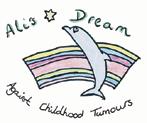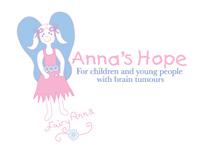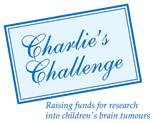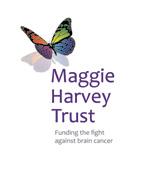












4 Now is the time for change! Our Chief Executive reports on landmark campaigning success.
6 United in the fight Cat In A Hat, Glenn McMahon Foundation and Send-A-Message join the fight
8 Updates from our phenomenal Fundraising Groups
10 Generous gifts from Trusts and Foundations feeding vital research
12 Wear A Hat Day 2016
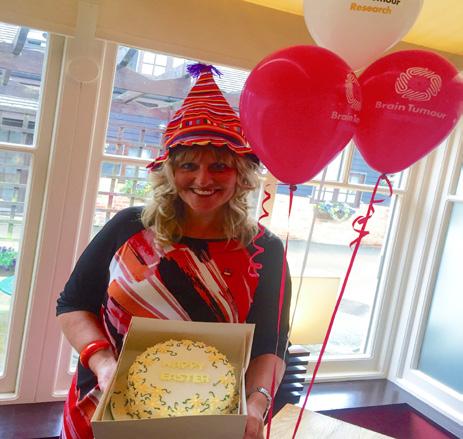
26 Research
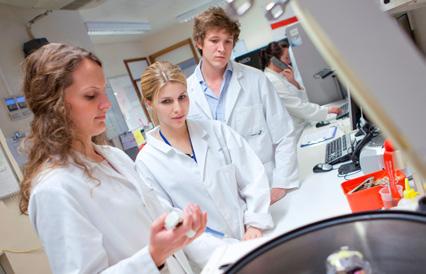
Director of Research Kieran Breen discusses the future of research with Dr Loredana Guglielmi
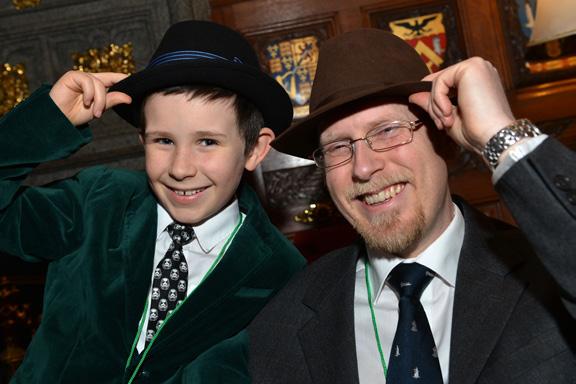
39 Brain Tumour Research making headlines
40 Member Charity Updates
Together we will find a cure
Updates from our Centres of Excellence
Equipped for excellence – find out how your money is being used to fund sustainable research
34 Campaigning
Celebrating the hattiest year by far!
18 On Yer Bike!
Incredible pedal power from our first-ever national spinnathon event
20 Fearless Fundraisers
From the Atlantic Ocean to Mt. Kilimanjaro: the incredible challenges raising funds for vital research
24 Summer Fundraising: Host a good time get together!
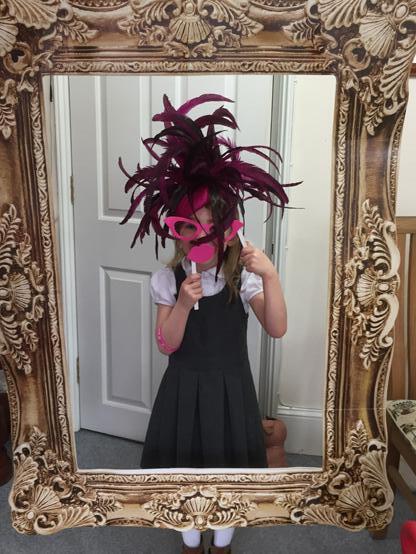

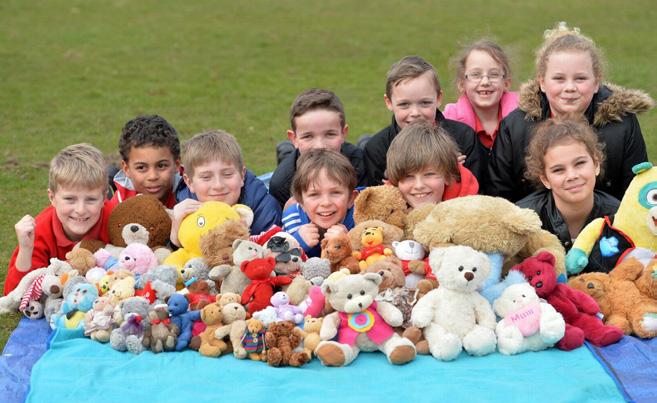
We celebrate the success of our e-petition in the heart of Westminster!
The brain tumour debate – how your support is changing the future for brain tumour patients
MPs Getting Involved
44 Conquer it Together Calendar of Events 2016
46 The big move
Brain Tumour Research relocates to Milton Keynes
48 Ways to give
50 In Loving Memory
How to set up an online tribute fund
51 In Our Hearts


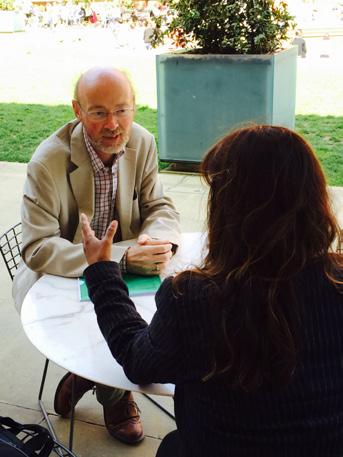

MP after MP after MP spoke on behalf of their constituents who had been affected by a brain tumour. Some even spoke of their own experiences.
Over 70 MPs attended the Westminster Hall debate on research funding for brain tumours; it felt surreal, after 15 years of campaigning at last we were being heard.
Having lost my sister’s little girl Alison Phelan in June 2001, three weeks before her eighth birthday and setting up founding member charity Ali’s Dream with my sister, her family and friends, we were compelled to do something to find a cure so that other families would not have to suffer in the same way. At conferences run by the then UK Brain Tumour Society I met up with other brain tumour charities and together we knew we couldn’t do it alone; we had to get the Government involved.
In April 2004 my local MP John Bercow, now Speaker of the House of Commons initiated the first ever adjournment debate on brain tumours, following a meeting I requested.
Along with fellow brain tumour charities, we sent a pack of the issues to MPs across the UK and started to enlist support. That October John sponsored a reception and decided that as there was so much interest in the subject he would establish an All Party Parliamentary Group for brain tumours and asked me to provide the secretariat.
First ever reception October 2004,
We have led campaigning for increased investment for research into brain tumours ever since. We have published three ground breaking statistics reports and in March 2015 launched our Invest In A Cure Manifesto to highlight the issues.
When Maria Lester approached us in August 2015 to support her e-petition we leapt at the opportunity and with the support of our member charities and supporters throughout the UK we quickly went through the first 10,000 signatures milestone.
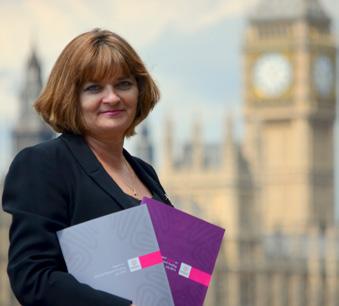
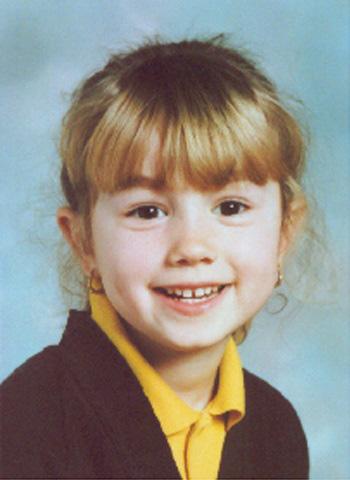

Our Chief Executive reports on landmark campaigning success
This drew the attention of the newly formed House of Commons Petitions Committee and they launched their first ever inquiry into research funding for brain tumours. They advised this would lead to the publishing of their first ever report and a Westminster Hall debate. Comforted by this we were still determined to demonstrate the strength of support across the UK for increased investment and with the support of families who were prepared to share their stories raised awareness through a social media campaign and regional papers, radio and television across the UK.





E-PETITION LAUNCHED
Over 10,000 signatures –prompted Government response
Launch of House of Commons Petitions Committee


1,104 comments received on web forum
Launch of Inquiry – Evidence given by Sue Farrington Smith, the Realf family and representatives from The Brain Tumour Charity, Children with Cancer and Cancer Research UK

Evidence given by 15 web forum respondees
By the closing date of the e-petition we had achieved 120k+ signatures – Thank you so much to all involved. The petition committee launched their report and I was proud to sit alongside Maria and present our case.
The date of the debate was announced. We were determined to demonstrate the strength of support. Again we galvanised your support and in your hundreds you acted; writing to and visiting your MPs to share the issues and engage them in our campaign.
Rebecca Harris, Chair of the APPG, sent every MP a letter to encourage them to attend. I wrote to them highlighting the statistics, our Director of Research enlisted the support of scientists and clinicians who signed a letter to MPs, highlighting the issues from a researcher’s perspective and our newly appointed Public Affairs Officer, Greg Judge, sent them all a briefing. Some of our celebrities and scientists sent a letter to The Times and Sheila Hancock wrote to the Huffington Post.
We set ourselves a target of involving 50 MPs in the debate and were overwhelmed that over 70

Evidence given by Professor Geoff Pilkington, Professor Garth Cruickshank, Professor Tracy Warr and Karen Kennedy, Director of the National Cancer Research Institute (NCRI)


Over 30,000 signatures reached



attended with 30 speaking and 15 intervening. Even more let us know they wanted to be there but couldn’t because of meetings elsewhere. Our supportive MP database is growing thanks to you.
George Freeman responding on behalf of the Government said it was the most well attended Westminster Hall debate he’d seen.
“Iwanttopaytributetothepatients andtheirfamiliesandlovedoneswhose experiencesandwhosepaindrivethis campaignandthisissue.Itismygreat privilegeastheMinistertoseethatacross differentdiseaseareas,andtodayinthe debate,andinyourwork,youarelifting atorchandjoiningamagnificenthistory ofpeoplewho,throughtheirsuffering ofdisease,insistonourdoingbetterand whodrivecampaignsandraiseawareness, leadingtoincreasedfunding.”
This is such a huge move forward in our campaign and we are indebted to the Petitions Committee for taking up our cause.
100,000 signatures
Close of e-petition –120,129 signatures
Report launched
WESTMINSTER HALL DEBATE
We will not stop here – BrainTumourResearch will not stop campaigning to increase the level of funding for research into brain tumours.
At the current rate of national spend it will take 100 years to find a cure. Brain tumour research funding needs to increase to £30-£35 million a year – in line with other cancer research funding.
Now is the time for change!
Now is the time for the Government to listen!
Now is the time for the Government to stop failing brain tumour patients and their families and to put things right!
TOGETHER WE WILL FIND A CURE!
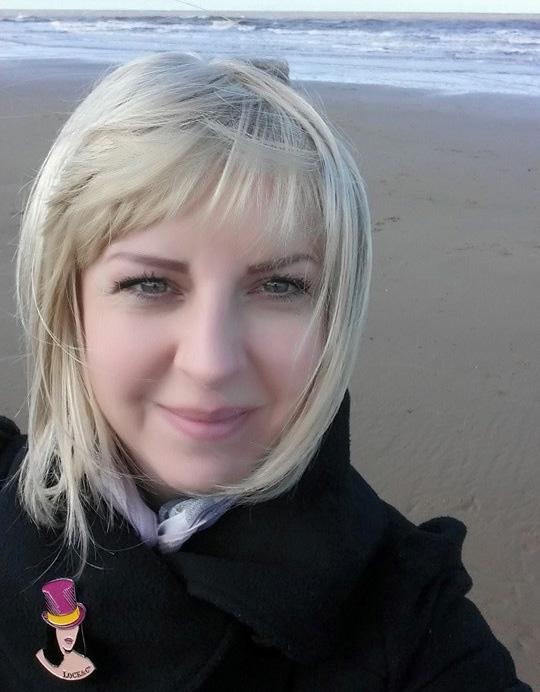
In August 2014, a CT scan revealed that Cat Anderson, aged 36, had a brain tumour. A follow-up MRI scan led medics to think that it was benign and that it could be completely removed. However, following surgery and a biopsy, the devastating news came back that the tumour was in fact cancerous, although slow-growing. Cat’s family and friends all rallied round to help and to fundraise, resulting in the setting up of the Fundraising Group –CatInAHat!
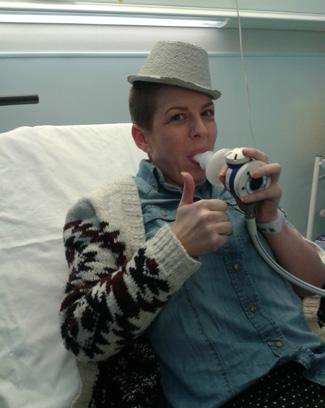
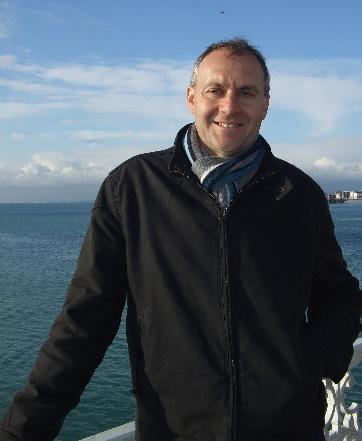

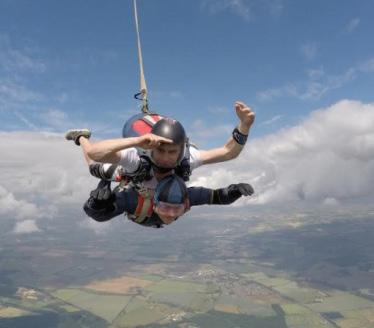
Sponsored head shaves and skydives, arduous assault courses and a family fun day are just a few of the fundraising activities Cat In A Hat have taken on so far, raising thousands for vital research.
tomakearealdifferenceandhopethat moreeffectivetreatmentsandultimately acureforbraintumourscanbefound –andsoon.MeanwhileCatremains positiveandupbeat.Shesaysthatno-one canreallytellwhentheyaregoingto die–youcouldbekilledinanaccident tomorrow.Hermantrais:‘Idon’tfeellike dying,soIamjustnotgoingtobother.’”
Read Cat’s full story on our website: www.braintumourresearch.org/in-hope-
The Glenn McMahon Foundation Husband, son, father and step-father, Glenn McMahon was diagnosed with an aggressive glioblastoma multiforme stage 4 (GBM) brain tumour after experiencing co-ordination problems on the golf course. He married Wendy in February 2014 and, knowing their time together would be cut short, the couple set about making the most of their lives through travel, socialising and their mutual love of fine food. Glenn died in June 2015 at the age of 53 and is hugely missed by all, not least by Wendy: “AfterlosingGlenn,Ifeellikethecentre ofmyuniversehasgone.Hehaslefta hugeholenotjustinmylifebutforour familiestoo.Weareallnowontheroad oflearningtolivewithouthiminourlives anditisnotaneasyjourney.
“LaunchingTheGlennMcMahon Foundationhasgivenmeimmensepride, butitisobviouslymixedwithimmense pain.ThistimelastyearGlennandIwere fundraisingtogether,andhereIam–fundraisinginhismemory.
“Thetwoevents–WearaHatDayat work,followedbytheMadHattersTea Party–haveraisedover£1,250!
OurFundraisingGroupsraisemoneysolelyforBrainTumourResearch.MemberCharitiesareregistered withtherelevantcharitycommissionandtheirobjectivesmayincludefundingsupportaswellasresearch.

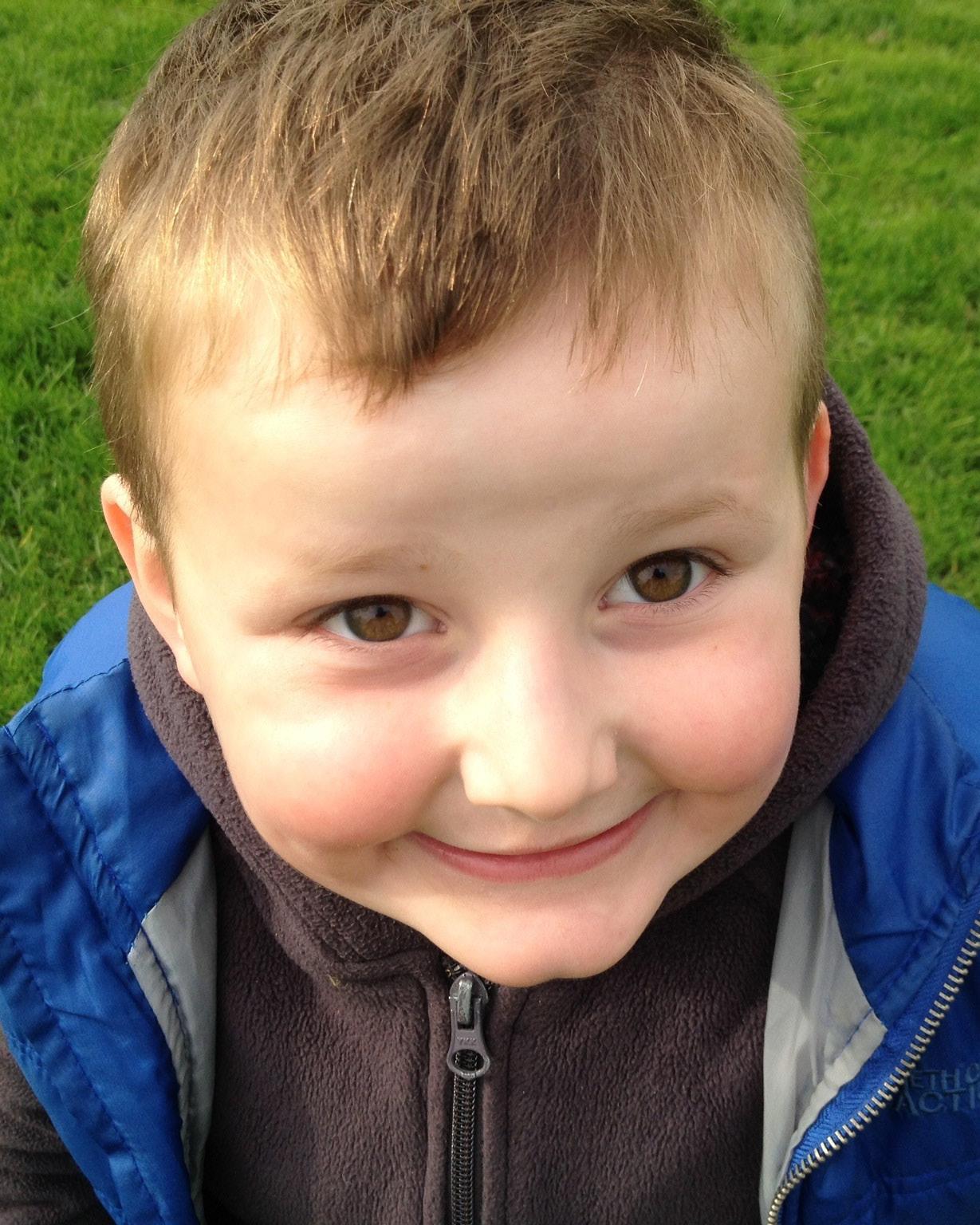
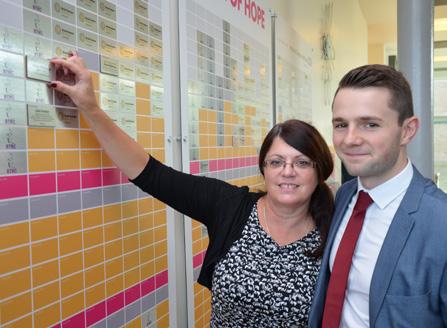
At the time of writing, the group has raised over £10,000 for BrainTumourResearchand have many exciting events planned for the future, as were Glenn’s wishes. A golf day is due to be held in 2016 at Westerham Golf Club, at which Glenn was Captain. They have also placed a commemorative bench at the 18th hole of the course.
Read Glenn’s full story on our website: www.braintumourresearch.org/in-our-hearts
Brain tumours kill more children and adults under the age of 40 than any other cancer





Send-A-Message(SAM)are the latest charity with which we have partnered in the common interest of increasing awareness and helping those affected by brain tumours. Sam O’Callaghan was just five years old when he passed away in 2014, after a brave three-year battle with brain cancer.
Sam’s mother Fiona has supported Brain TumourResearchsince Sam’s diagnosis, raising over £4,000 by taking part in the Great Scottish Run with friend Elaine Logan and holding a collection at his funeral. They also held a sell-out charity ball in November 2015 and are already planning for the next in late 2017!
After Sam’s death, Fiona set up Send-AMessage so that she could fulfil her son’s simple wish: “Before Sam passed away his daddy asked him what he would like us to do for other sick children and he simply said: GIVE THEM PRESENTS.”
An outpouring of generosity has led to hundreds of pounds of donations to their JustGiving page and Fiona and her family are supported by a dedicated team of seven volunteers/friends that are united and determined to bring smiles to the faces of children currently facing cancer treatment.
Could you help? Please get in touch with your local children’s cancer treatment centre and let them know of Sam’s mission. This way the charity can send out gift boxes to the children who need them most.
For further information visit: www.send-a-message.org.uk
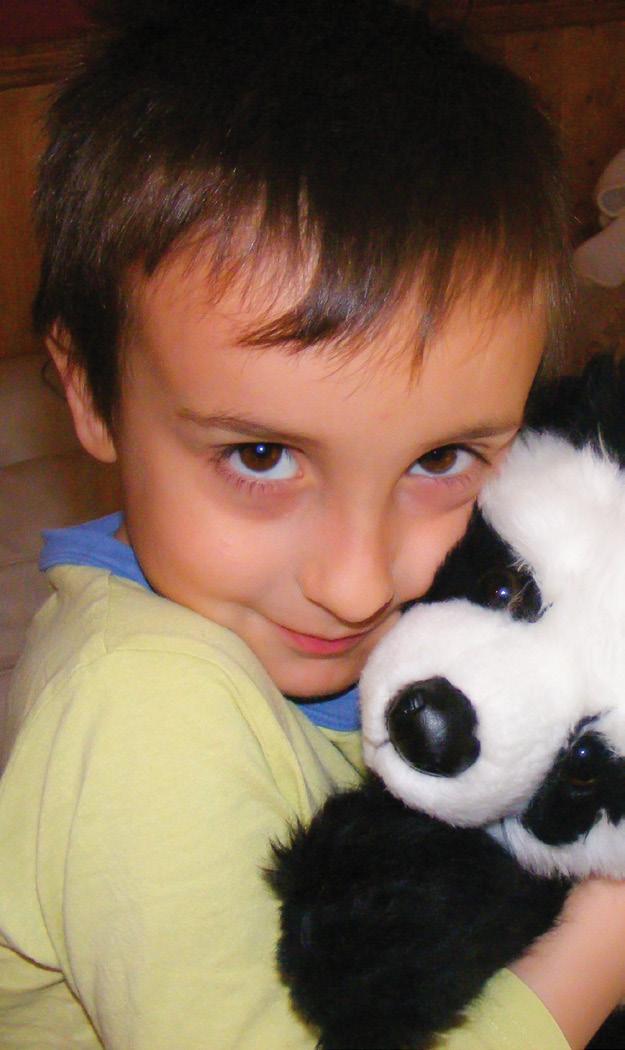
Karen Carter-Bates and her husband Dean set up CharlieChargesOnin 2014, after losing little Charlie five years before. In November 2015, the couple and their three other children, Annabelle, Tristan and Aurora visited our research centre at Queen Mary University of London to tour the labs and to place four tiles on the Wall of Hope in Charlie’s memory. These tiles represent over £10,000 raised for vital research – just a portion of their fundraising total.
Karen reflected on the occasion: “Tobeabletosaythatallthesupportfromfriends,family, localbusinessesandBroadfieldsPrimarySchoolhasalreadyhelpedussponsoreightdays ofresearchisincredible.
Itwon’tbringCharlieback,butitwillbringusclosertoacureforbraintumours.”
CharlieChargesOnhave already hosted a Black-Tie Ball and a Greek Night, as well as taking part in numerous running events in Charlie’s memory.
We’d like to thank all who continue to support Karen and her family, helping to ensure that Charlie leaves a legacy of research to improve outcomes for future brain tumour patients. www.charliechargeson.com
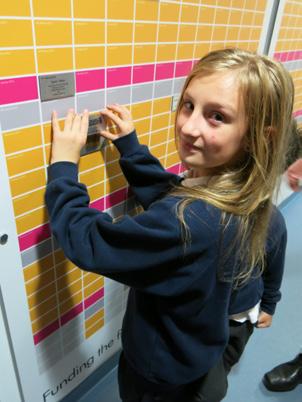
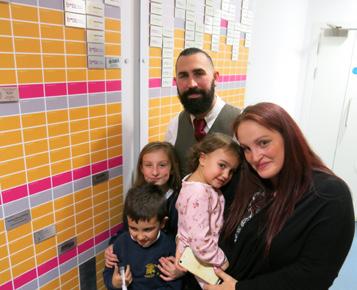


The team behind Maggie’sMemoryhave gone from strength to strength since they first established the group in 2013, so far raising an astonishing £31,000 to date in Maggie’s name. Testament to their dedication to the cause, Maggie’sMemorywere chosen alongside AnkerRadioas one of the Mayor of Nuneaton’s Appeal charities for 2015/16!
Mayor Barry Longden announced the two charities at the Town Hall appeal launch in May: “Ihave chosenthetwocharities,mainlybecause ofwhathappenedtothethreeformer
mayors,TomWilson,BobCoplandand BrianHawkes,whoallhadcancer,andI happeneduponMaggie’sMemorythrough myhairdresser,whoknowssomeone,who knowssomeoneelse,whoknewsomeone involvedwithMaggie’sMemory.”
Numerous fundraisers have been held in the area as part of the Appeal, these included a Vegas Night – with entertainment from a Robbie Williams tribute act and a selfie-booth for guests to take some candid snaps. Also a 3km Santa Walk; open to young and old, participants were encouraged to don a Santa
suit or at the very least, a festive hat! Nuneaton Cricket Club marked the finish line, where hot food and mulled wine were available in abundance for the tired walkers.
However the team didn’t stop there, organising a whole host of other events including their third annual Summer Fête, a quiz night and a psychic night – all in the past year!
We are continually stunned by the funds and awareness raised in Maggie Davis’ memory and consider it testament to an incredible lady that a whole community has thrown themselves behind the cause with such unity.
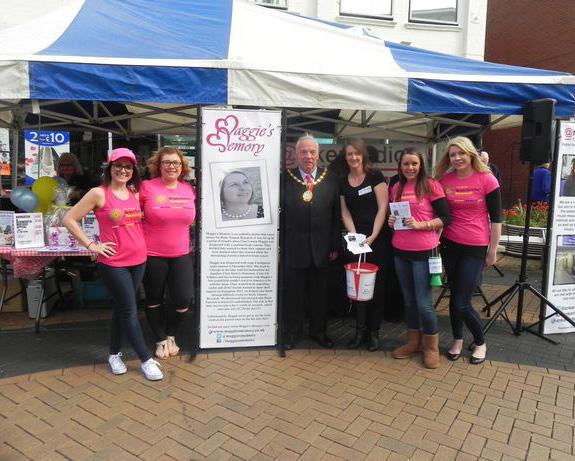
www.maggiesmemory.co.uk
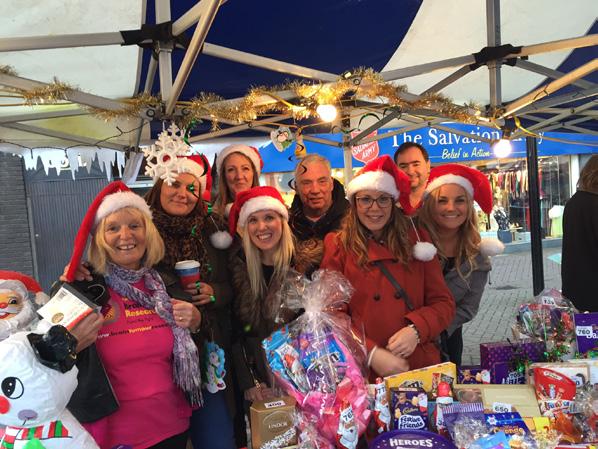

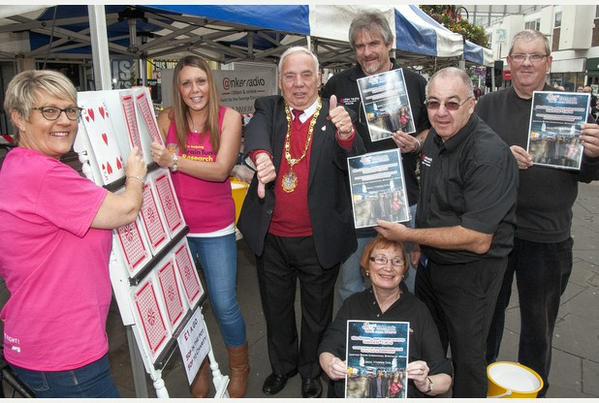
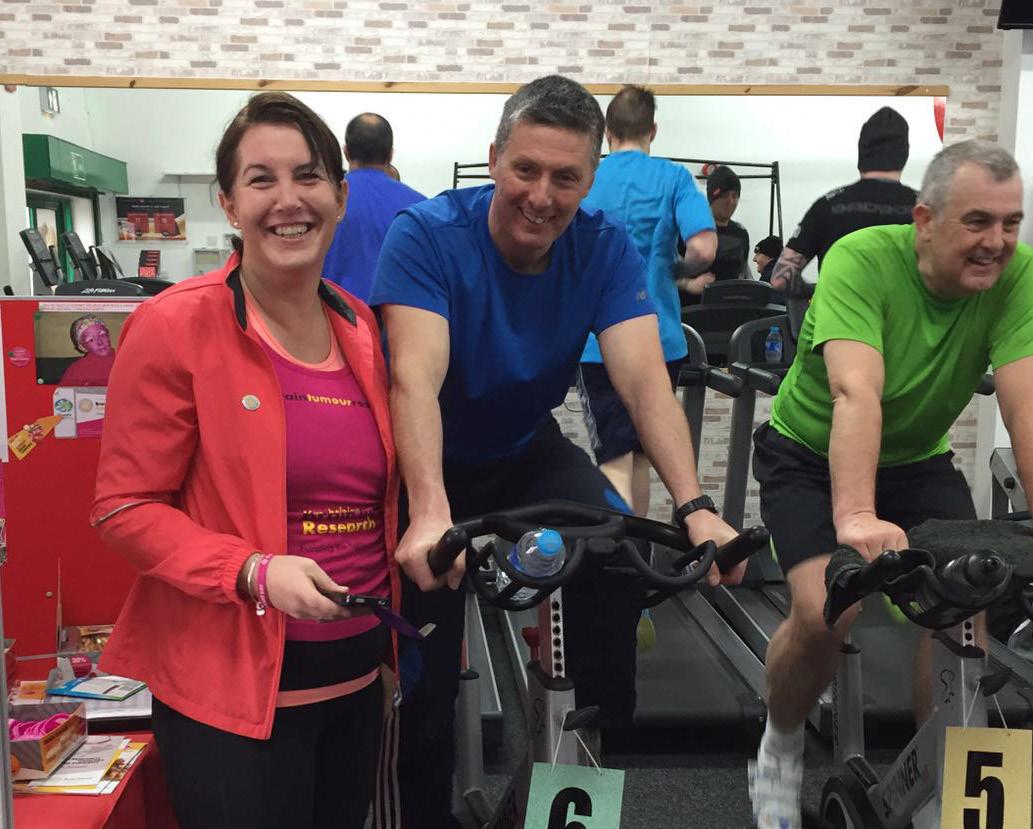
Naomi’sFightforLifeFundwas founded by Lucy Savage after her daughter Naomi was diagnosed with an ependymoma in 2007 at the age of four. Thankfully, Naomi has been in remission since 2008 and a scan in February this year confirmed that she remains cancer free.
This fantastic Fundraising Group have held countless events over the years for BrainTumour Research, ‘helping to raise thousands of pounds for vital research. These have most recently included a swimathon, car boot sale, coffee
evening and ‘Hope Tree fundraising day’ at The Station in North Yorkshire.
In February this year, they also organised their very own spinathon as part of our latest challenge event: OnYerBikeforBrainTumours (See page 18 for our full feature on this event)! ZoneFitnessin Northallerton lent their space for the team of dedicated spinners who collectively smashed their target of £2,740 to fund one day of research.
The fearless fundraisers at Head 1st Fundraising Group have produced a very special 2016 calendar for Brain Tumour Research! Organised by founder Nicole Phillips’ friend Lorraine Bateman, a group of gutsy models took part in an almost naked photoshoot in October last year and launched the calendar in November. The calendars flew out of the boxes at the event and are still available to purchase online!
www.head1st.org.uk
£10 plus£3.95p&p

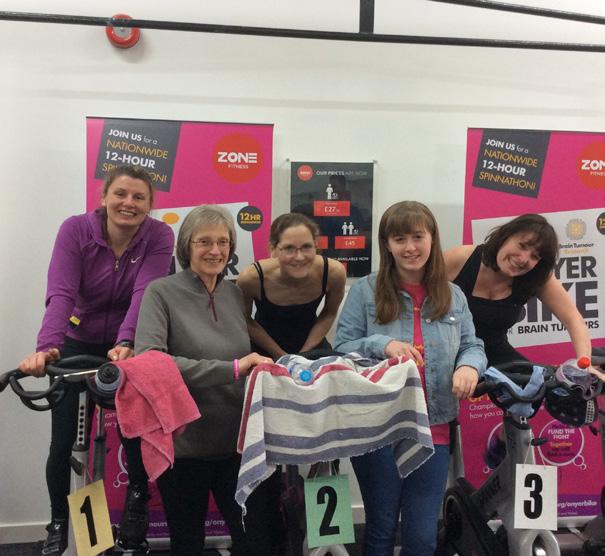
Naomi’sFightforLifeFundalso have a very active Facebook page, which they use to share not only their own updates but also information and posts from BrainTumourResearch. This is absolutely key in helping drive awareness of the devastating statistics and the severe underfunding issues surrounding brain tumour research.
Our warmest thanks to Lucy, Naomi and their fundraisers and supporters in their continued and unwavering support of BrainTumourResearch.
www.facebook.com/naomisfightforlifefund
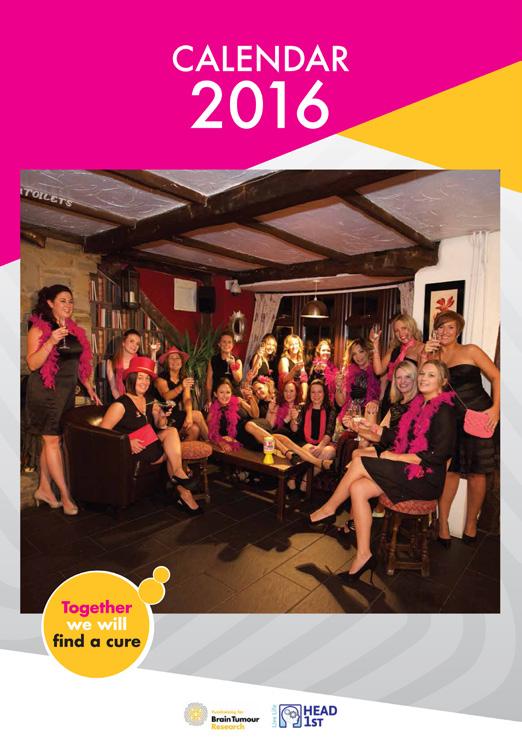
fund a research centre to put an end to brain tumours
We are the only national charity in the UK dedicated to investing funds into building a network of world class experts in sustainable brain tumour research. We want to increase awareness and understanding of this devastating disease and develop new and innovative treatments to improve outcomes for patients.
Grants already received from Trusts and Foundations demonstrate their recognition of the importance of funding long-term sustainable research at our Centres of Excellence. These generous gifts help us to attract the finest scientists and clinicians to our centres to develop and sustain a ‘critical mass’ of expertise, in turn attracting further investment.
Largegrantscancreatea‘snowballeffect’, rapidlyacceleratingresearchprojects anddiscoveriesofnewmethodstotreat braintumours,whichcouldtranslate intoimprovingmeasurableoutcomesfor patients,includinghighersurvivalrates, betterqualityoflifeandultimatelyacure forthebiggestcancerkillerofchildrenand adultsundertheage40.
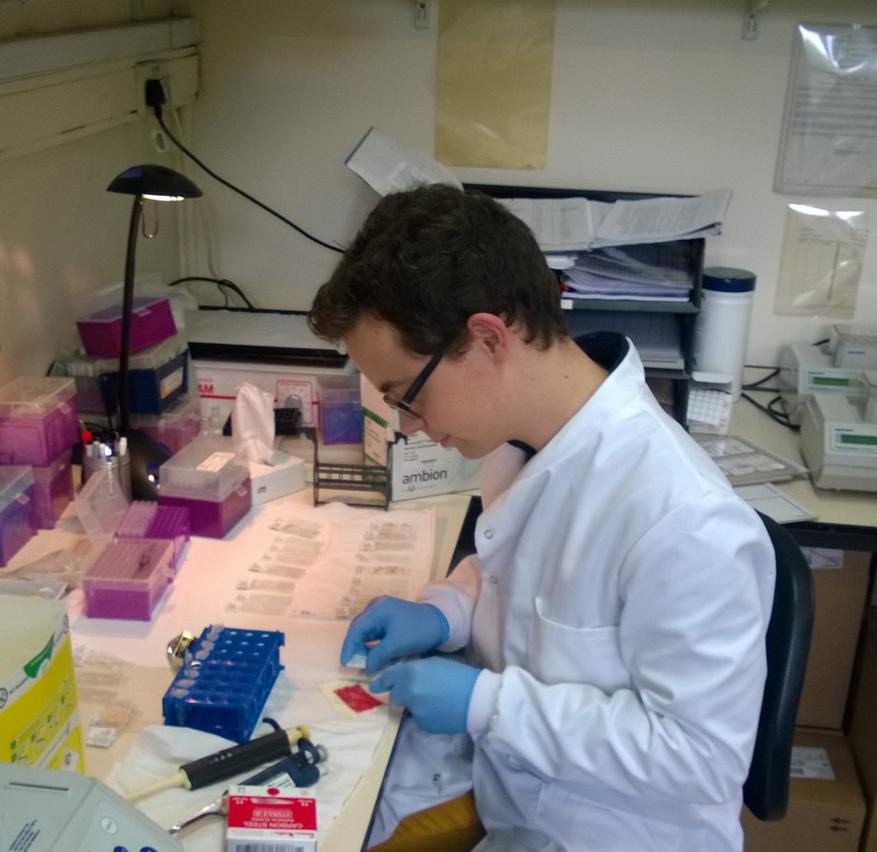
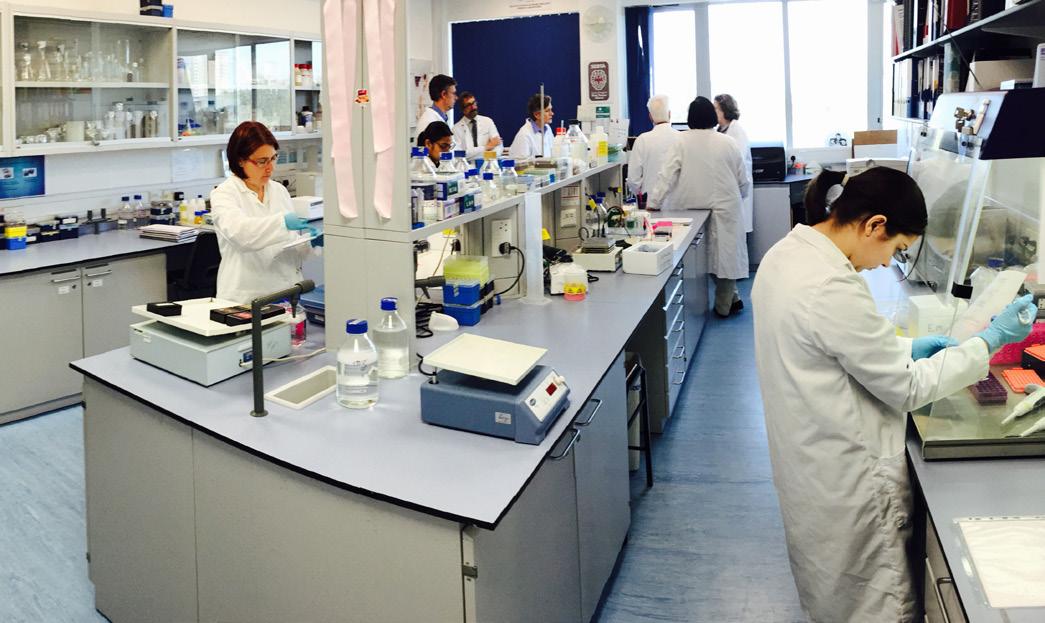
What your grants could fund:
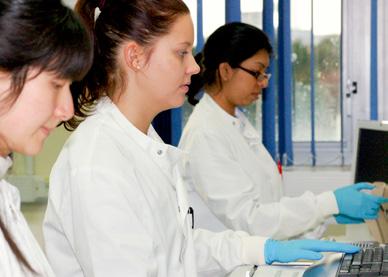
£10,000 funds our research co-ordinator at the UK Tissue Bank so that researchers can work together efficiently across the UK in order to benefit the patients of the future.
Grants of £15,000 pay the salary of one of our PhD students for a year. These researchers are examining different aspects of tumour cells and the ways in which drugs can be more effective to treat brain tumours.
The daily consumables used by each of our researchers cost about £20,000 per year.
Donations at the £35,000 level fund a Senior Research Associate. They specialise in a particular area of brain tumour research and contribute to experimental design and publications, with much of their time spent working in the laboratory.
Senior Research Associates progress to become Research Fellows and these positions are funded by grants starting at £45,000 per year. At this stage, researchers have gained expertise of the genetic workings of cells. They are able to contribute to grant application submissions and will publish their own papers – the heart of our collaborative ethos.
In 2014, BrainTumourResearchapplied for a grant from a trust set up by Ken and Doreen Bailey in their Wills. Their trustees recognised our work as the kind that the Baileys would have wanted their legacy to support and contributed a considerable £45,000. This grant allowed us to fund a PhD student in our research centre in the University of Portsmouth for three years, with match-funding from BrainTumourResearch
One of the chronic issues associated with brain tumours is the extremely limited scope of treatments available. The brain is surrounded by a powerfully protective membrane – referred to as the blood-brain barrier. This barrier is a crucial defence for the brain, guarding this most vital and complex of organs against toxins travelling
As the research taking place in our research centres develops, and as we continue to build collaboration between our expert researchers and their peers all over the world, the opportunity grows for trustees of grant-making bodies to contribute to this vital cause. Many welcome the opportunity to visit our laboratories and see first-hand what their grant is funding and meet the scientists behind the research. Some of our grant funders appreciate having their donation recognised through the placement of unique tiles on our Walls of Hope at our Centres of Excellence, each tile representing the value of £2,740, the cost of one day of research.
in the blood. Many treatments for cancer in the body, such as chemotherapy and cancertargeting drugs, are delivered through the bloodstream and the blood-brain barrier prevents these from crossing into the brain, making it more difficult to combat brain tumours.
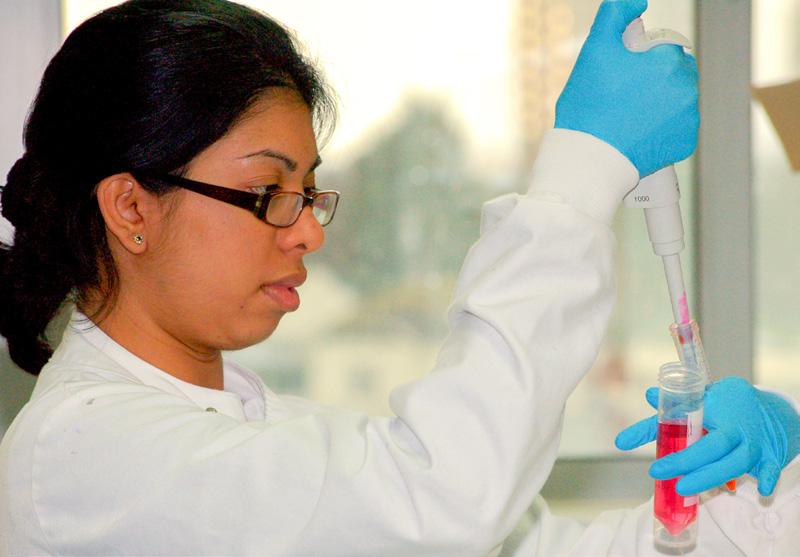
Professor Geoff Pilkington at our Portsmouth centre developed a unique all-human version that could be used by researchers in the lab. His model uses only human brain cells, human brain glioma (tumour) cells and human serum.
This blood-brain barrier model is being used by Dr Zaynah Maherally, a Senior Research Associate part-funded by the Bailey Will, to help investigate the cellular and molecular features of invading
tumour cells. Revealing the precise mechanisms of tumour cells’ invasive behaviour is essential to the development of successful new drug therapies for brain tumours.
Generous grants like this one given by The BaileyWillTrusthelp us to continue to facilitate innovative and ground-breaking research at our Centres of Excellence.
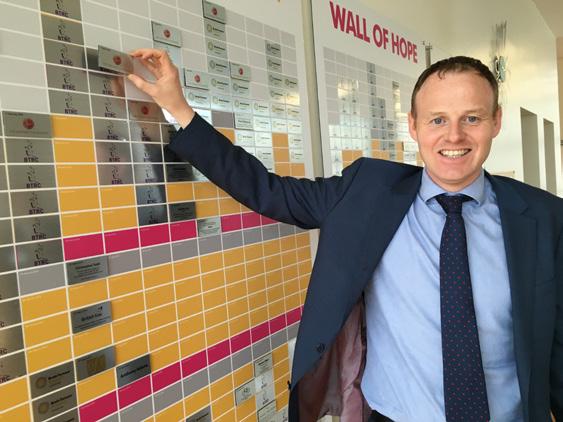
TheHooverFoundation’s logo as a clear demonstration of their support and commitment.
• Do you work for an organisation that can offer charitable gifts through an associated trust or foundation?
• Would you like to fulfil your company’s CSR targets by supporting our world-class research?
TheHooverFoundationpresented a gift of £25,000 to BrainTumourResearchin 2015 the equivalent of an incredible nine days of research. Nine tiles were placed on our Wall of Hope, each
TheHooverFoundationchose BrainTumour Researchbecause their ethos is about finding solutions to medical problems that affect a large community. They expect their grants to have a real impact on research, so that they help make a difference and contribute to improving survival rates from such lethal conditions as brain tumours and ultimately finding a cure for such devastating diseases.
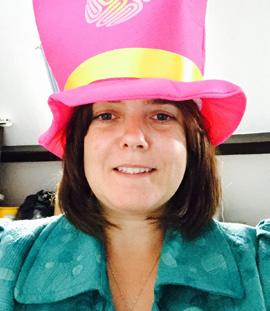
Trusts and Foundations Fundraiser, Charlotte Rooke, is here to help. Get in touch today and she will be happy to offer advice and practical help with completing applications or engaging your organisation to give a charitable gift to BrainTumourResearch.
charlotte@braintumourresearch.org

The support from hatters and milliners across the country is absolutely pivotal to the success of Wear A Hat Day and we are thrilled when more and more take part each year, helping to raise vital funds and awareness for Brain Tumour Research.
Here is our round up of the hattastic activity from Wear A Hat Day 2016!
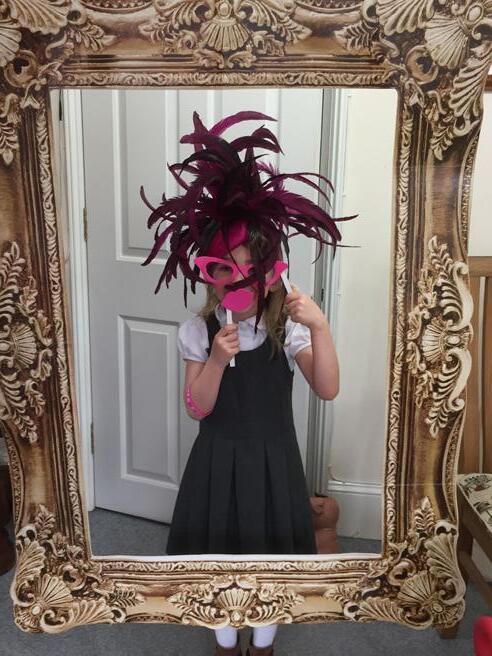

We tip our hats to Snooty Frox
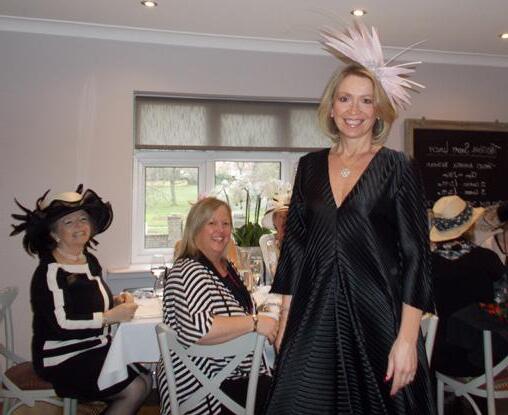
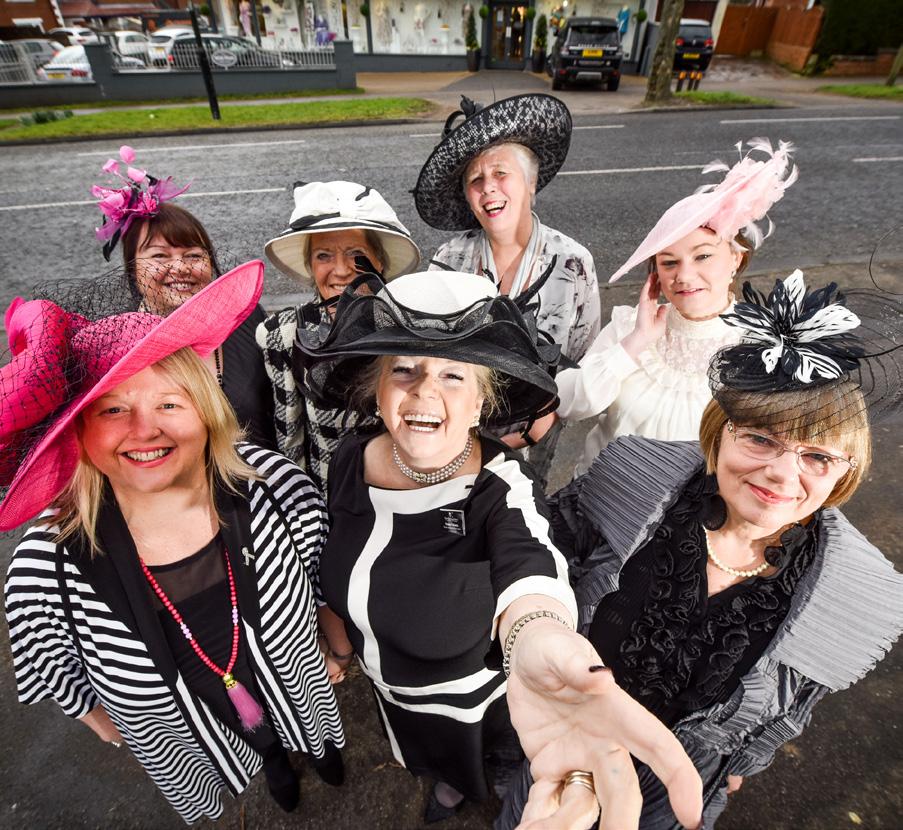

Louise Claire Millinery in Wallingford held a very special prize draw for this year’s campaign. Prizes were kindly donated by nearby Crooked Billet Restaurant and Stemtation Flowers in Henley. A bottle of champagne and hat voucher was also donated by Louise Claire Millinery themselves. The draw continued over the weekend following Wear A Hat Day and was a great success – the winners were thrilled with their prizes and they raised a fantastic amount for BrainTumourResearch.
A truly TOP-HAT team!
Ladieswear boutique, Snooty Frox of Harrogate, hosted a special Wear A Hat Day luncheon in support of BrainTumourResearchmember charity, ThePPRFoundation
Ladies turned up wearing their best and most glamorous hat in support of the ThePPRFoundation’s quest to raise £1m for brain tumour research at St James’s Hospital, Leeds. A selection of hats were modelled by the Snooty Frox stylists, and a two course lunch with a glass of wine was served at The Wild Plum.
The guests also enjoyed a charity raffle – in which among other prizes, a number of designer hats and fascinators were up for grabs, including generous donations from hat suppliers Snoxells, Veni Infantino, Ispirato, Condici, Aoife Harrison, Vivien Sheriff and a Whiteley hat as worn by Kate Middleton. Around £1,500 was raised at this great event!

Christys’ London have been manufacturing quality hats since 1773 and created many distinctive styles still popular today. Not least the ‘Homburg hat’ favoured by Edward VII Prince of Wales and Sir Winston Churchill. The generous hatters offered 10% off all online sales on Wear A Hat Day itself and also donated 10% of all sales to Brain TumourResearch.


Limited Edition
Together we will find a cure
Stephen Jones and Lock & Co Brooches
Suggested donation £10.

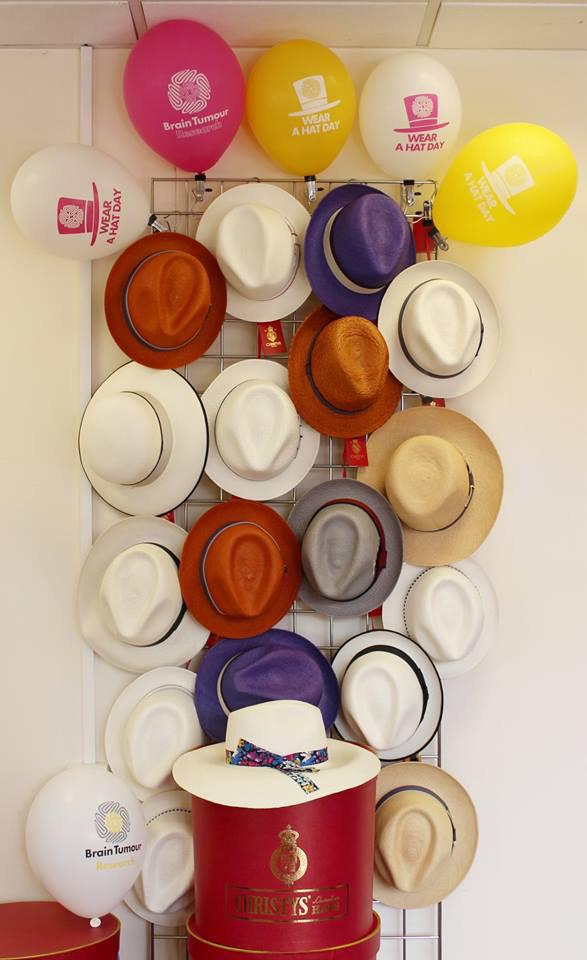
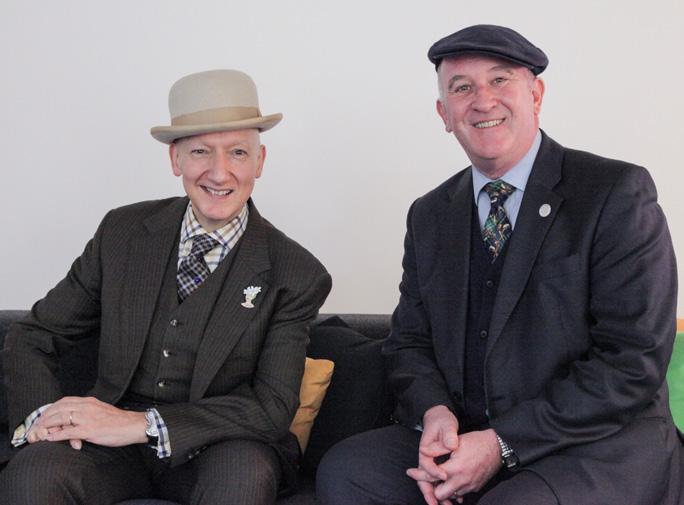
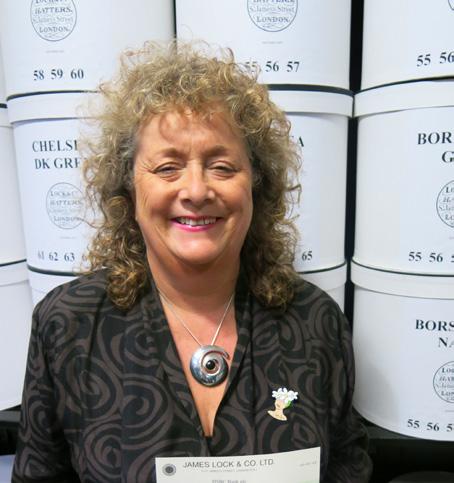
Up to 40% of all cancers spread to the brain
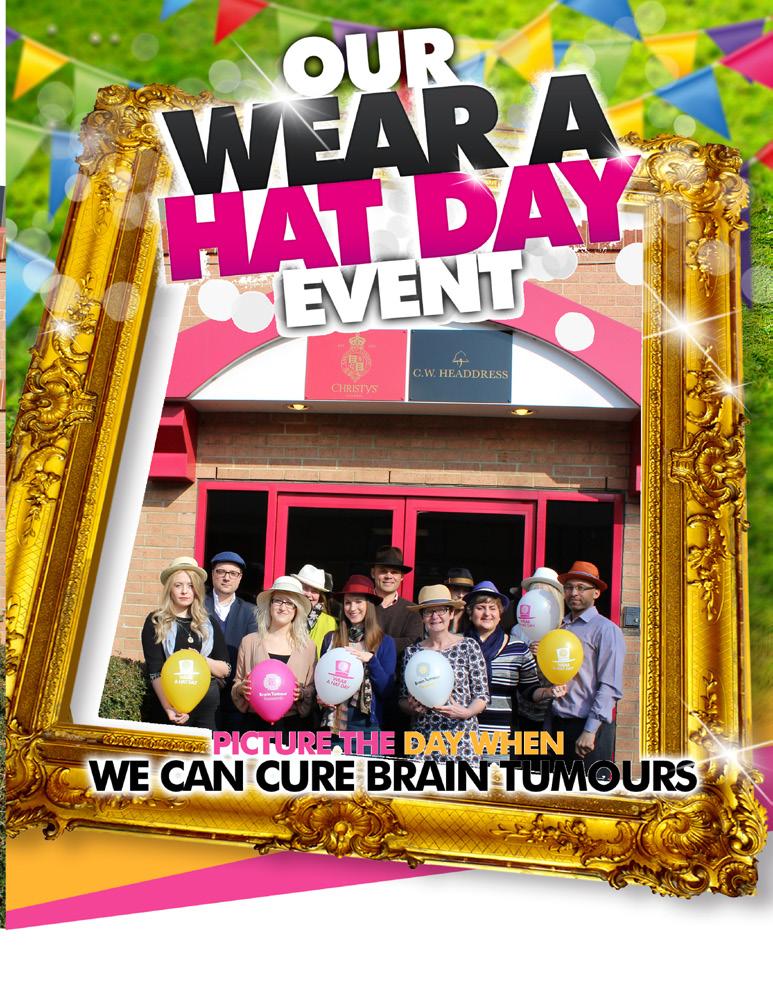
On Wear A Hat Day itself, Head of External Affairs Hugh Adams was joined by two of the most prominent names in the hat industry for a day of radio interviews: helping to spread the message far and wide of the need for greater awareness and greater funding for brain tumour research.
Stephen Jones, OBE is one of the UK’s most respected couture milliners. Working in the industry for over 30 years, we were honoured that Stephen chose to apply his artistic talents to the design of our Limited Edition Wear A Hat Day brooch for 2016 and to give his full support to the campaign.
Stephen accompanied Hugh during the morning of Wear A Hat Day, speaking to a number of radio stations across the UK about his involvement and the cause generally, which is one very close to his heart.
Sue Simpson is the Director of Lock & Co Hatters – the world’s oldest hat shop and co-creator of our Limited Edition Wear A Hat Day Brooch 2015. Lock & Co has been a steadfast support to the campaign each year; donating time, money and resource in dedication to helping us get closer to a cure for brain tumours.
Sue joined the interview panel for the second half of the day, delighting listeners with insight and anecdotes from behind the scenes at Lock & Co. When asked if she had any famous clients she answered “Yes–theyincludeLordNelsonand CharlieChaplin!”
We are hugely thankful to both Stephen and Sue for taking part in these interviews – which reached a potential collective audience of over one million people – a great way to mark Wear A Hat Day and raise awareness!











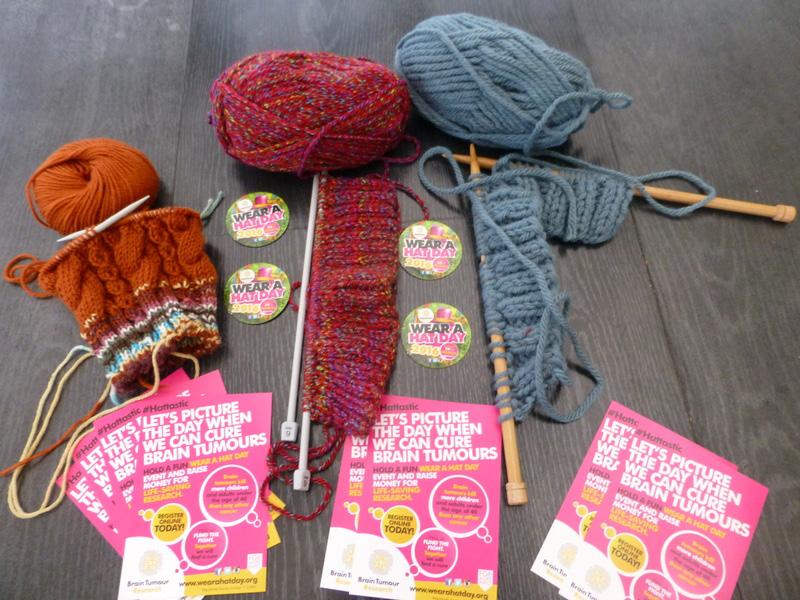
Help us FUND THE

Together we will find a cure
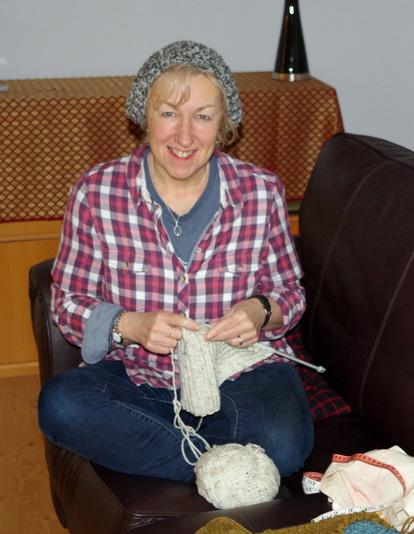

Moira McPartlin was moved to fundraise for Research that a friend from her past was battling a brain tumour. An extremely active woman, Fiona was Moira’s squash partner, cycling companion, five-a-side teammate and weight-training coach!
“Manyyearsago,Iworkedwithayoung womanwhohadmorelifeandenergyfor sportthananyoneIhaveevermet...
Irememberedherpostingaboutwearing agreyhatforBrainTumourResearch.That afternooninNovember2015Istartedto knithats.Ihaven’tstoppedsince...”
And so ‘The Big Knit Challenge’ was born! Moira set a goal of knitting 50 hats in time for
The crafty talents and contributions of Moira and friends even made it into the local press and ultimately raised an awesome £3,720!

Specsavers stores in Exeter and High Wycombe held their own special Wear A Hat Day events in 2016 –raising funds and vital awareness for Brain Tumour Research.
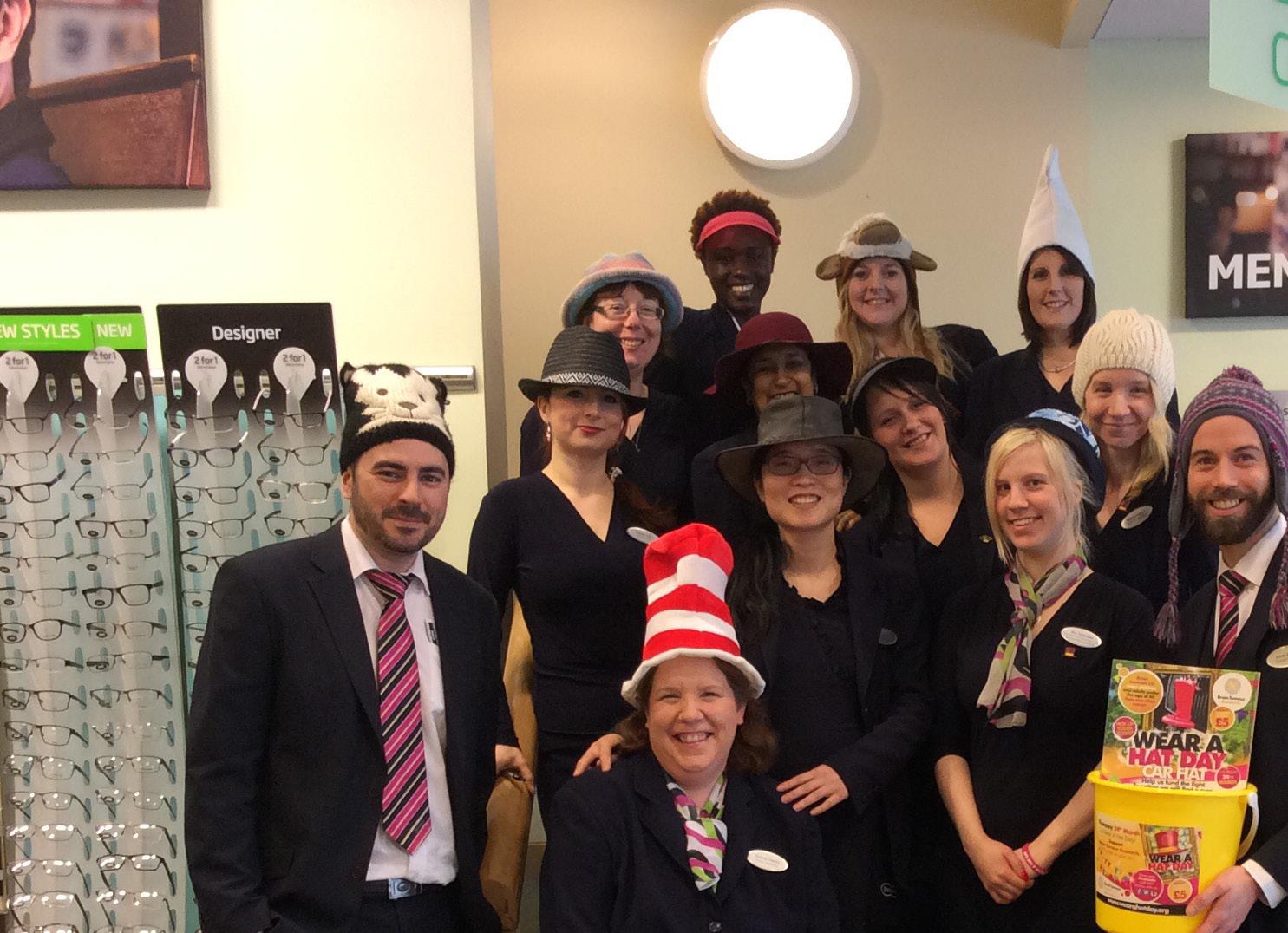
The link between brain tumour diagnosis and opticians is important as brain tumours are frequently first detected during routine eye tests. This could be because other medical investigations have been unable to consider the possibility of a tumour, or because no obvious symptoms have yet been observed.
Sophie Peters was 26 when she discovered she had a brain tumour after a chance eye test. The cause of her excruciating headaches, she strongly believes that if she hadn’t walked into Specsavers that day, her life-threatening tumour would have remained undiagnosed. (You can read Sophie’s full story at www.braintumourresearch.org/inhope)
Various Specsavers stores across the UK have supported BrainTumourResearchthroughout the years and we are extremely grateful that Exeter and High Wycombe got in touch to let us know how much fun they had this year!
The Exeter branch sold pens and badges leading up to the event and staff had a great time wearing their wackiest hats for the day, some even added extras to their headpiece to make them totally unique. The team had a great time taking photos with their photo booth kit and also asked for donations with all spectacle adjustments.
Organiser Alan Langler was very pleased with how the day went: “We raised £250 and it was amazing. There was a real air of fun on the day. Thanks to all the staff and customers that helped to support it.”
Specsavers in High Wycombe held Wear A Hat Day festivities throughout the weekend, inspired by a patient who they had diagnosed with symptoms a year before. The patient went on to have their tumour removed, however their sight could not be saved. Staff were keen to get involved with the campaign to highlight the importance of keeping a check on your eye health.
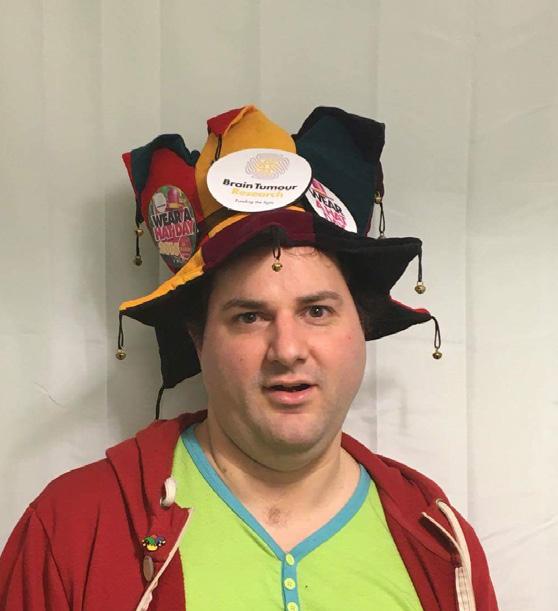
The staff really entered into the spirit of it; wearing a range of exciting hats, selling pin badges and displaying a collection bucket for donations. They raised a wonderful £147!

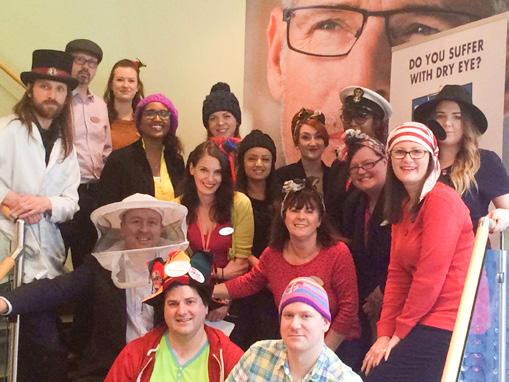

HELP US
fund long-term, life-saving research at our Centres of Excellence






















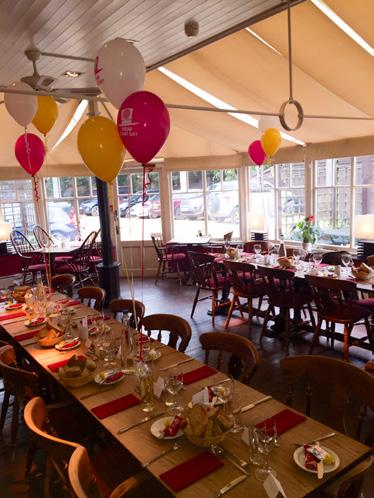
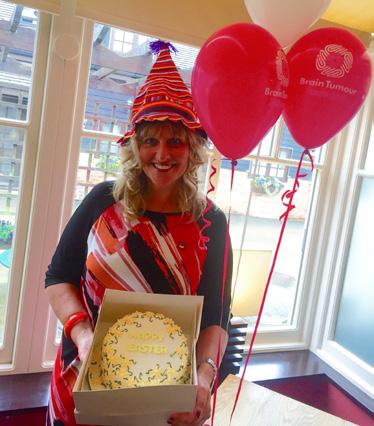
Sue Farrington Smith organised her own special event this year – an exclusive Ladies Lunch at The Old Thatched Inn at Adstock.
Twenty-five specially invited guests were able to show off their most fabulous headwear whilst enjoying an afternoon of delicious food and drink. This included a glass of Prosecco on arrival, main course and dessert, rounded-off with a selection of exquisite Petit Fours.
A raffle included lavish prizes kindly donated such as restaurant vouchers, Clinique cosmetics and chocolate. Elise, Supporter
Care Executive at BrainTumourResearch, won £50 to spend at The Old Thatched Inn and very much enjoyed the occasion: “Itwas afabafternoonfilledwithfun,gamesand greatfood!Theatmospherewasgreatand theraffleprizeswerefantastic–Ican’twait fornextyear!”
There was also an auction during which attendees could bid on a range of exciting items such as a beautiful Easter cake made
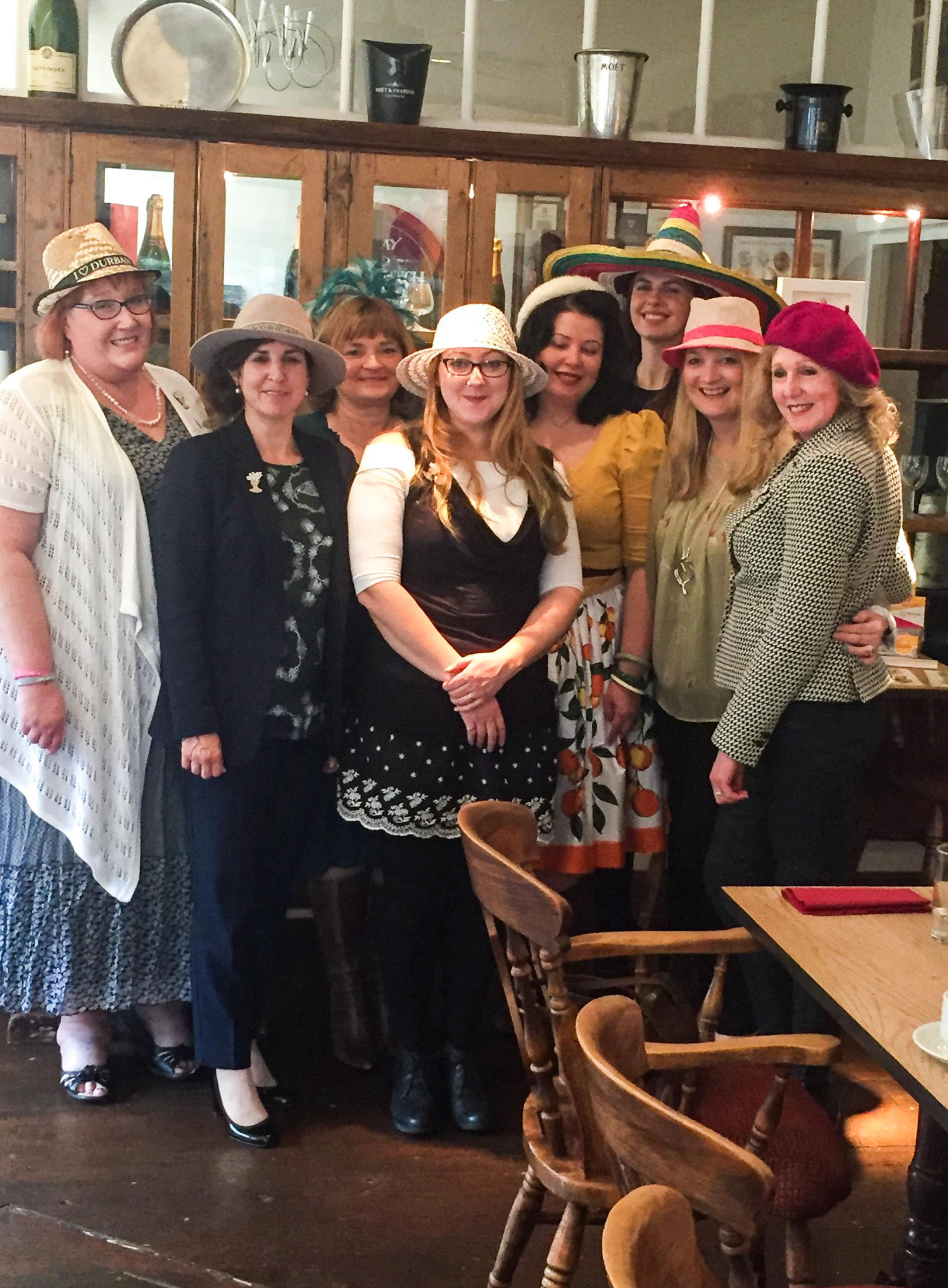

by local catering company Party Bakes, various framed artworks and a unique arrangement donated by Howes the Florist in Buckingham.
The afternoon concluded with some traditional party games organised by the host and her PA Sharon Stevens. The event raised a very tasty £663!
On Saturday 27th February 2016, hundreds of enthusiastic fundraisers got pedalling for our first national On Yer Bike event: a twelve-hour team spinathon challenge!
Supporters across England galvanised the support of their local communities, organising events at their local gyms, shopping centres, schools and community halls.

Leading budget fitness gym chain Xercise4Less, known as ‘the people’s gym’, was the national sponsor of the event, hosting On Yer Bike spinathons at six of their branches across the UK: Milton Keynes, Bristol, Leeds, Wigan, Stockton North and Wakefield.
On Yer Bike was also endorsed by Dr Dawn Harper, a familiar face on Channel 4’s Embarrassing Bodies and treasured ambassador for BrainTumourResearch. Dawn appeared in local and national press, encouraging participants for the event: ”Cyclingisagreatwaytogetmovingwhatever yourfitnesslevels.Adecadeago,Igotonabiketohelphealabadkneeinjuryand Ihaven’tlookedback.NowI’mencouragingpeopletoget movingandraisemoneyforBrainTumourResearch.”

Our thanks to Dawn for her loyal and enthusiastic support!
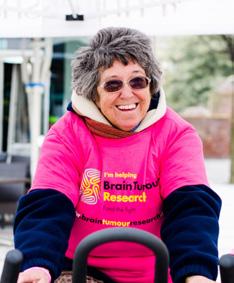
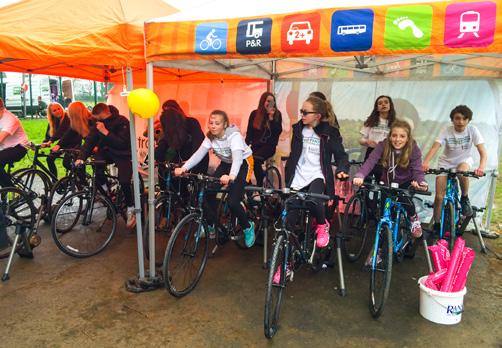
Somerset:
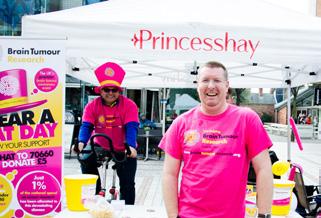
Norton Hill School – pupils cycled the distance of Land’s End to John O’Groats in memory of 14-year-old Emma Welch, who was an avid fundraiser for BrainTumourResearchbut tragically died last year from complications following routine surgery to treat the scoliosis curvature of her spine.
Devon:
Princesshay Shopping Centre – Our Community Fundraising Manager Peter Jordan, who lost his father, Jim, to a brain tumour was joined by his mum and John’s widow, Ann, 76 – it was the first time she had cycled in 50 years! She said: “Itwasdauntinggettingbackonabike aftersuchalongtimebutIhadafantastic timeanditwasallworthittoraisefunds andawarenessforthecharity.”
Cornwall:
Gyms in St Ives & Truro were joined by Derek Thomas MP, who took his turn for a spin!
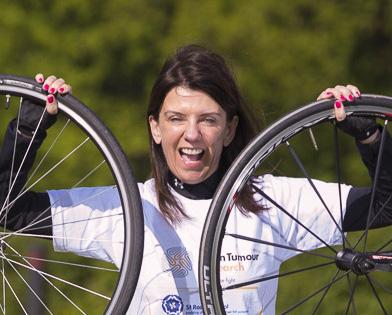
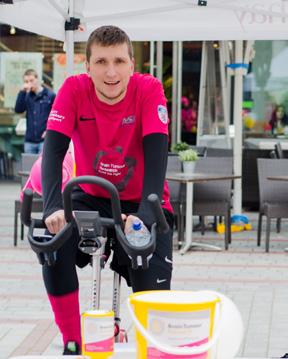



Here is a snapshot of the pedal power we saw on the day!

Hampshire:
Cascades Shopping Centre – 400 miles cycled by 21 people over two days, equivalent to the distance between our four Centres of Excellence.


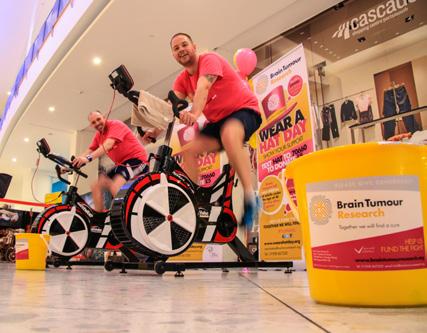
‘My Local’ convenience store in Elm Grove, Southsea held events in-store all weekend.
Inspired by On Yer Bike, tireless supporter Simon Tier, cycled 65 miles around the Isle of

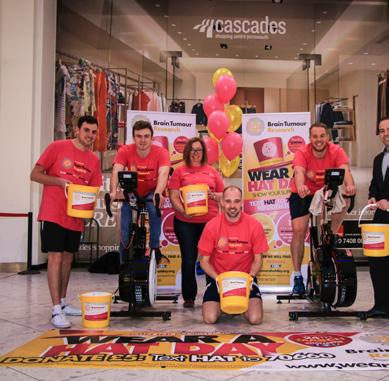
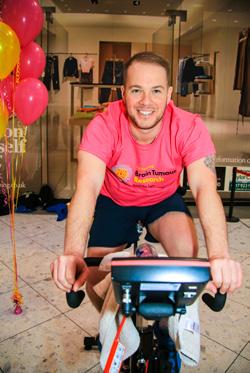
Wight with 11 dedicated friends! He summarised their adventure as follows: “Onechain,four puncturesandoneshreddedtyrelater,and wemadeit.Betterthanthat,weraisedover £1,000!”

North Yorkshire:
Mel Hennessy, founder of our Fundraising Group MINEhosted a fun event in Stockton. She reflected: “Ifeelsoproudof everyonewhotooktimeoutoftheirdayto helpraiseawarenessandmoneytohelp findacureforbraintumours.Eachand everyoneofyouaresuperstarsandIcan’t thankyouenough.”
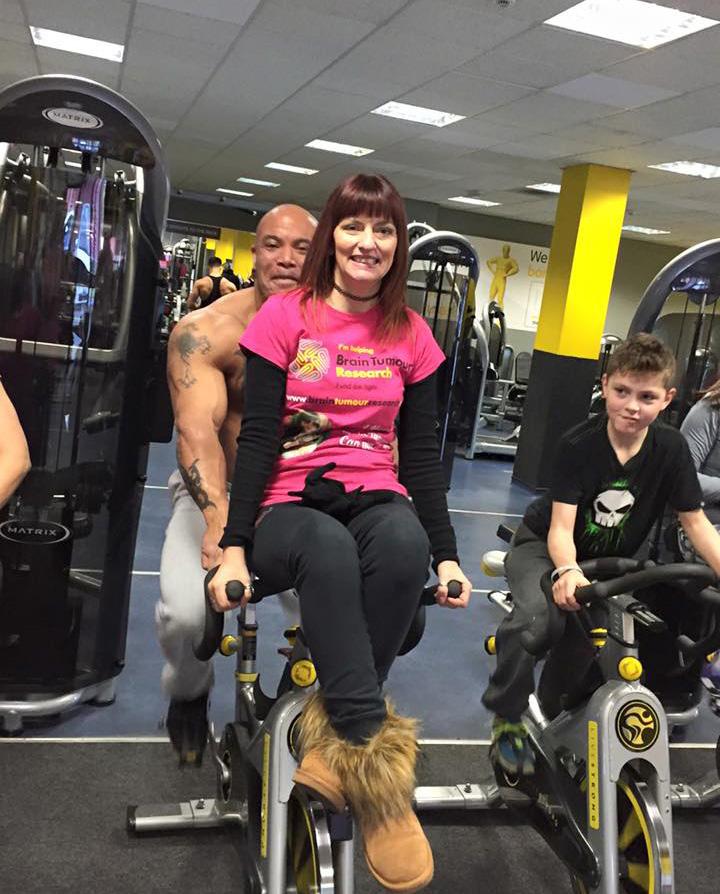

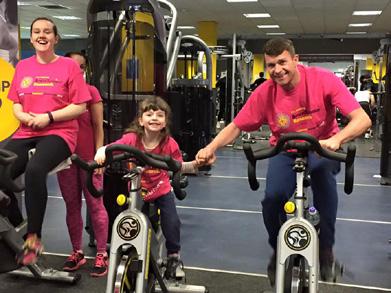
Naomi’sFightforLifeFundheld their event at Zone Fitness in Northallerton. The team smashed their fundraising target of £2,740 –nearing the £4,000 mark at the time of writing. An amazing achievement.
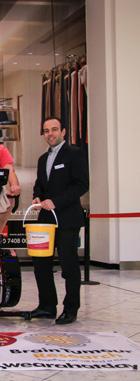
Kent:
Amy King lost her mother to a brain tumour at the age of 16. She and seven friends were TeamFlabbabikeand raised almost £700. Amy’s six-year-old daughter Lorelei also persuaded her school to hold their own Wear A Hat Day. An awesome team effort.
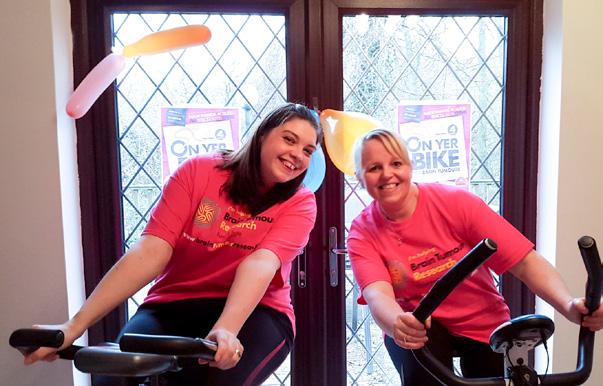

Buckinghamshire: BrainTumourResearchChief Executive Sue Farrington Smith combined her pedal power with that of the Rt Hon John Bercow MP and many other charity supporters at Swan Pool in Buckingham. Between them, they beat their fundraising target of £2,740. Sue exclaimed: “Theamazingenergyandcommitment shownbyeveryonewhogotontheirbikes forBrainTumourResearchhasbeentruly inspiring.ThedaywasgreatfunandI’m delightedthatsomanypeoplewanttojoin forcestoimprovethelivesofthoseaffected bybraintumours.”
Xercise4Less in Milton Keynes was the venue of a real team effort led by our Trusts and Foundations Fundraising Manager Charlotte Rooke – a hero on the day, completing five turns on the bike!
On Yer Bike for Brain Tumours was the brainchild of Paul and Jen Halfpenny from Glossop in Derbyshire. Paul was diagnosed with a brain tumour in 2010 and immediately started chemo and radiotherapy treatment. Although initially successful, in 2013 the chemotherapy regime proved no longer effective and Paul sadly passed away on 20th June 2014. Paul’s wife, Jen, held a special On Yer Bike 2015 in memory of Paul and, combined with the previous two years, raised tens of thousands of pounds to support brain tumour research, helping to improve outcomes for others affected by this devastating disease.
Together we will find a cure Just 1% of the national spend on cancer research has been allocated to this devastating disease
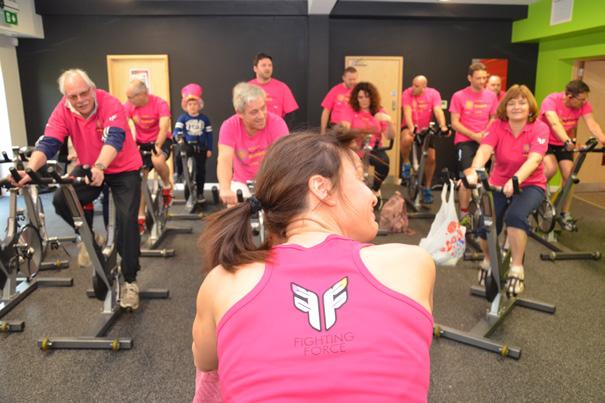
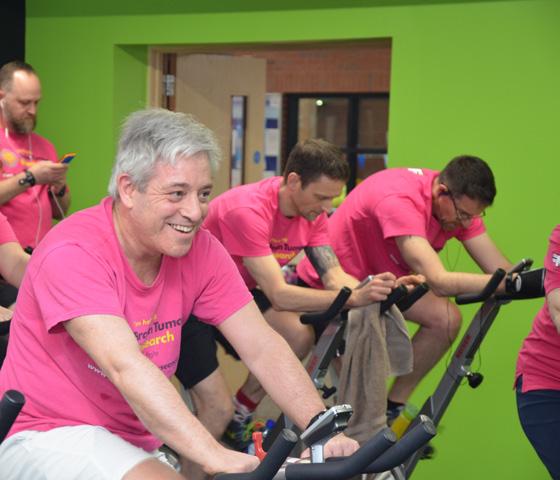

Sneha Charavda and her mum Amita had always dreamed of climbing Mount Kilimanjaro in Africa and made plans to do so together once Amita retired from the family jewellery business. However, Amita was diagnosed with and tragically passed away from an incurable brain tumour a few years before this could become a reality. Sneha reflected on her mother’s strength at the time: “The doctors told us the cancer was incurable and although mum fought bravely, three months later she passed away with our family by her side. The word incurable implies no hope but my mum always taught me to never stop believing in the power of hope.”
Determined to fulfil their dream, Sneha bravely decided to take on the challenge solo. On 20th September 2015, she climbed the 5,895 metres to the top of Mount Kilimanjaro and in doing so, raised more than £3,500 – far surpassing her target of funding one day of research (£2,740)!
Just 1% of the national spend on cancer research has been allocated to this devastating disease Help us FUND THE FIGHT
Together we will find a cure
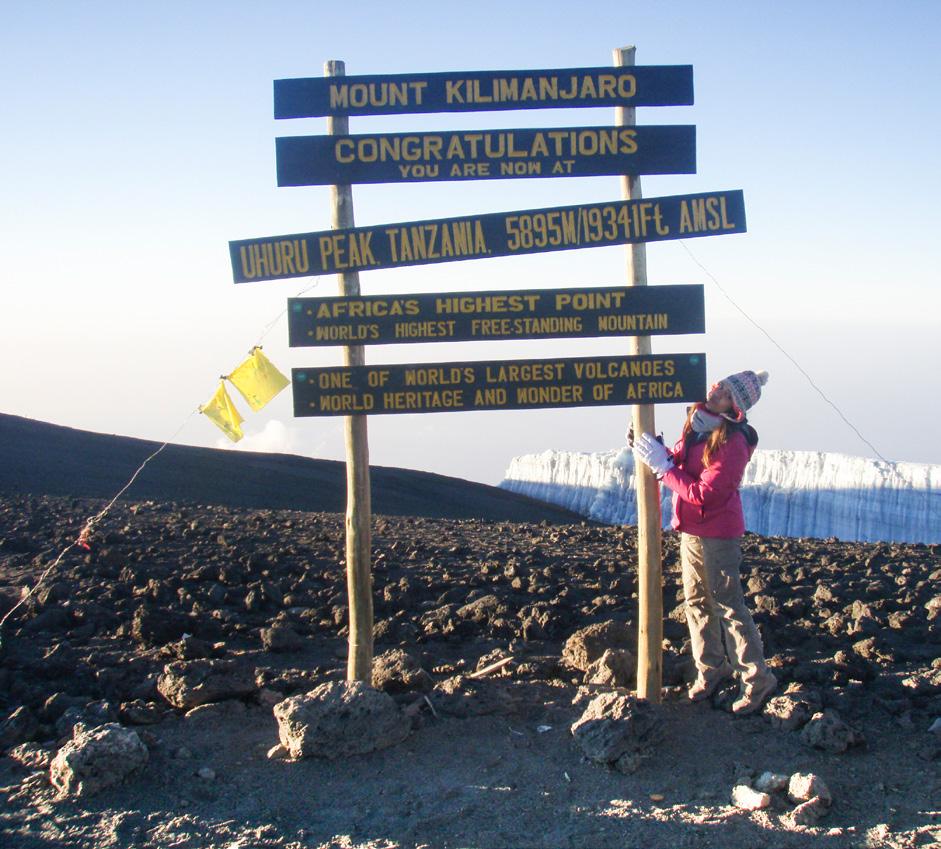

Carol Robertson, Head of our Community Fundraising explains: “Sadly,Amita’sstory isbynomeansuniqueanduntilwefind bettertreatmentsandultimatelyacurefor braincancer,familieswillcontinuetolose lovedones,oftenwellbeforetheirtime.
WearesogratefultoSnehaandallher familyandfriendswhohavedonated followingherKilimanjarochallenge.”
Thank you Sneha, we are incredibly proud to have you in our Fighting Force!

Finlay Church was diagnosed with a brain tumour in June 2014. In the 17 months after his diagnosis, Fin endured three operations, chemotherapy, a clinical trial and 12 weeks of daily radiotherapy. He gained 20kg in weight from steroids, had partial seizures and lost the use of his left hand side, ultimately becoming bed-bound. He lost his battle at the age of 11 on 25th November 2015, at home surrounded by his family.

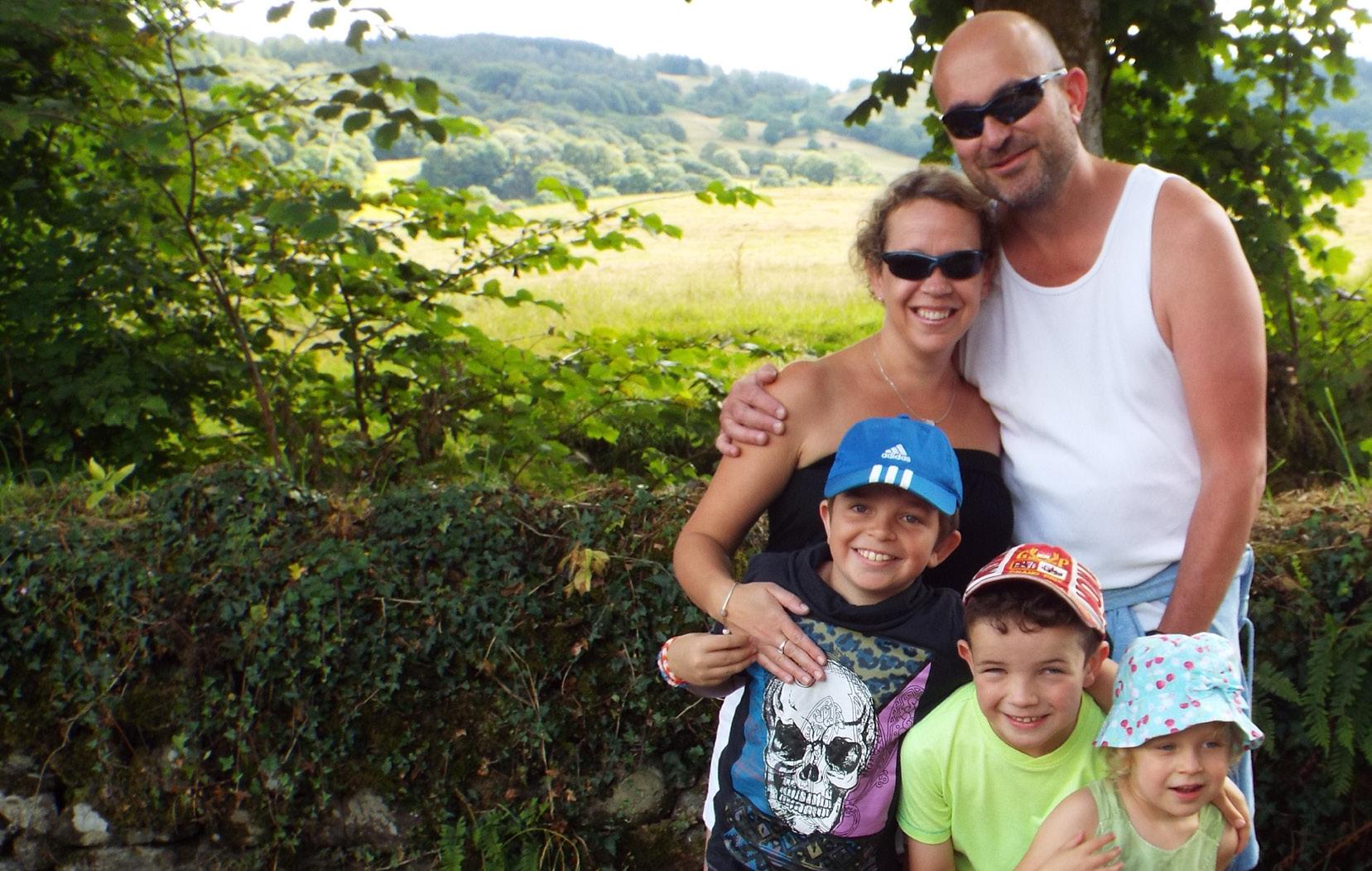
A remarkable character, Fin set about fundraising for BrainTumourResearchand Birmingham Children’sHospitalsoon after his diagnosis. In May 2015, the brave then 10-year-old organised a world record attempt for the most teddy bears in a row. Unfortunate timing meant that Fin had to oversee ‘Operation Teddy Bear’ from his hospital bed following surgery. However, thankfully he was able to witness the end of the event as the 15,534th teddy was laid – smashing the previous world record of 4,041!
Fin’s local community rallied behind him and his family, both with support during his treatment and in continuing to raise money for his chosen charities. Fundraising events have included the ‘Angels Without Wings’ ball, a ‘Movember’ campaign organised by Fin’s martial arts group
Funds raised by and in memory of Fin continue to rise, currently totalling over £60,000. This phenomenal amount is testament to Fin’s dedication to improving the lives of future brain tumour patients. His mother, Penny Church, continues to be an incredible driving force behind fundraising events and activities.
Fin’s parents agreed to share his story to help highlight the disease as national Brain Tumour Awareness Month got underway in March 2016. They released a poignant letter which Fin wrote to them just four days before he died. The letter contained his shattered career ambitions, dedications to family members and his feelings about cancer: “I’mabitscaredoflosingthe fight,”he admitted. “IhopeIdon’t.I’vejust gottokeeponfighting.Fcancer.”
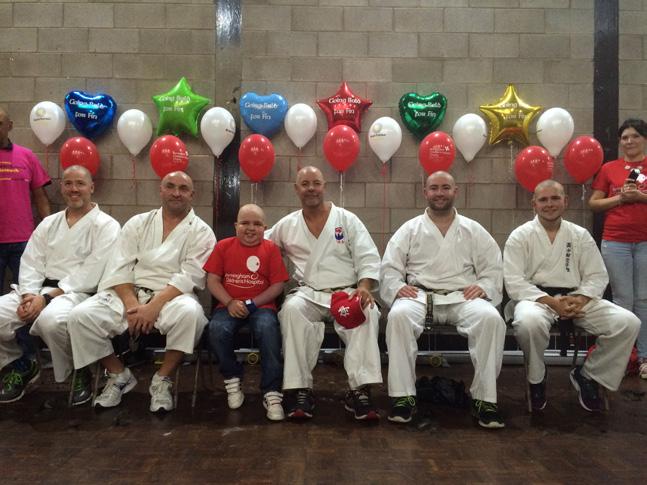

Penny and Wayne’s emotional reading of Fin’s letter gained phenomenal global TV, radio and newspaper coverage, touching the hearts of thousands.
Named a ‘Child of Courage’ at the Pride of Birmingham Awards 2015, Fin’s legacy will live on in the research he has helped to fund at our Centres of Excellence and in the awareness raised by his brave and selfless actions.
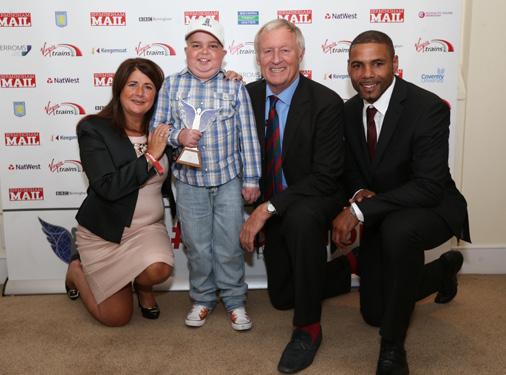
Read Finlay’s full story as told by Penny on our website:
www.braintumourresearch.org/in-our-hearts

Fundraising challenges don’t come much more exhausting than this: a single-handed row across the Atlantic Ocean! Callum Gathercole took on the Talisker Whisky Atlantic Challenge in memory of his father Clive, who passed away from a glioblastoma in August 2012. Following Clive’s death, Callum became determined to raise funds so that fewer families in the future would have to face the consequences of this devastating disease.
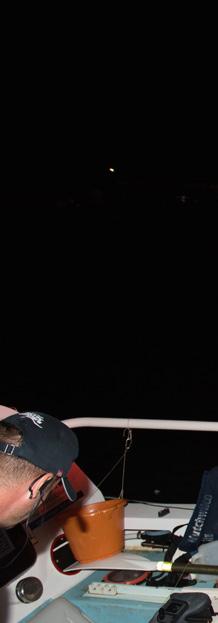
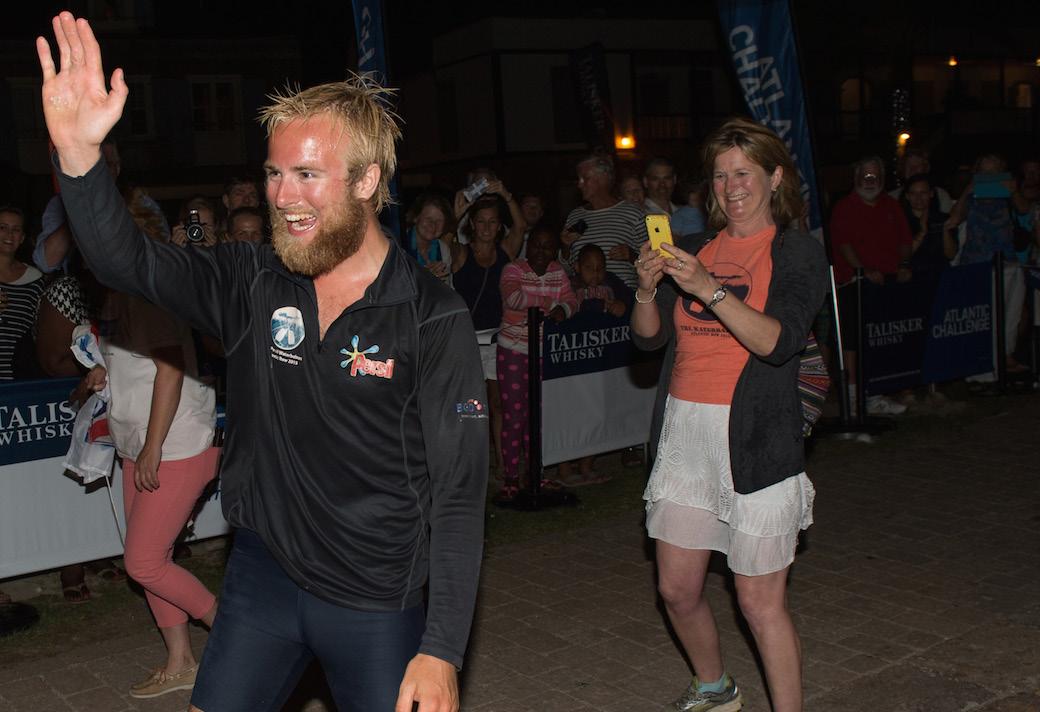
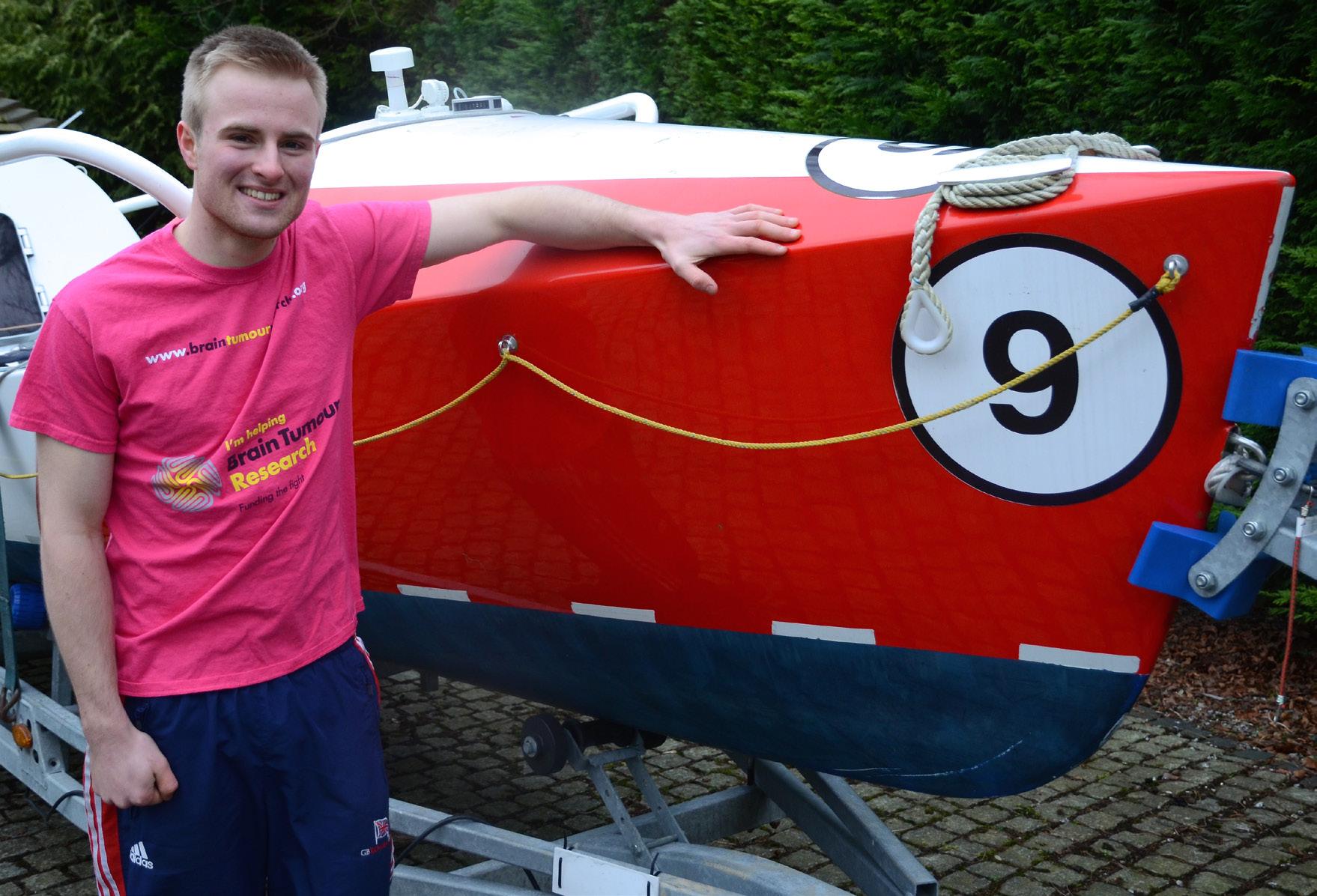
The Atlantic Challenge covers an awesome 3,000 nautical miles; indeed, more people have been into space or climbed Everest than have rowed across the Atlantic Ocean! Not only this but at the tender age of 20, Callum became the record-holder for the youngest person ever to do so, confirmed by the Ocean Rowing Society.
During moments of rest, Callum occupied himself with watching TV, topping up his calories or looking out for marine life. However the trip was far from ‘plain sailing’: “Therewereafair
Together we will find a cure
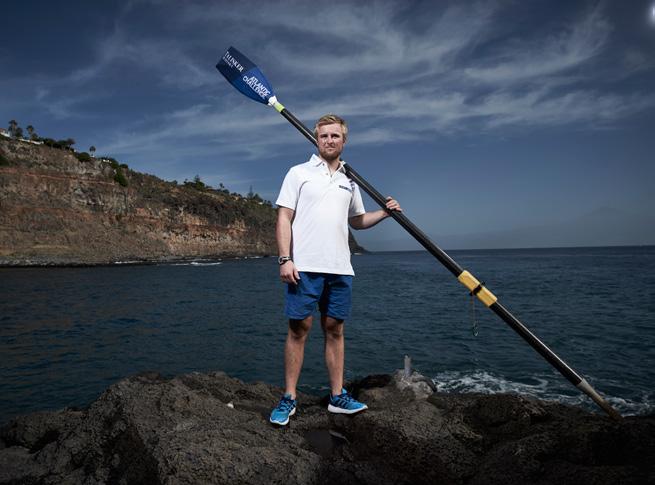
fewdayswheretherewasacrosswindora headwindandIknewonsuchdaysthatI hadtoslogthroughthisrow,throughthis dayanditwasreallyhorrible.Itwaslike Iwasrowingthroughcustard.Thatwasa phrasethatkeptgoingthroughmymind–‘it’llbebettersoon’.”
He also had a close encounter of the nautical kind... “Iwasjustgoingtosleep.Ihavea collisionavoidancesystemandthatwent off.Iopenedmycabinandsawthelightsof
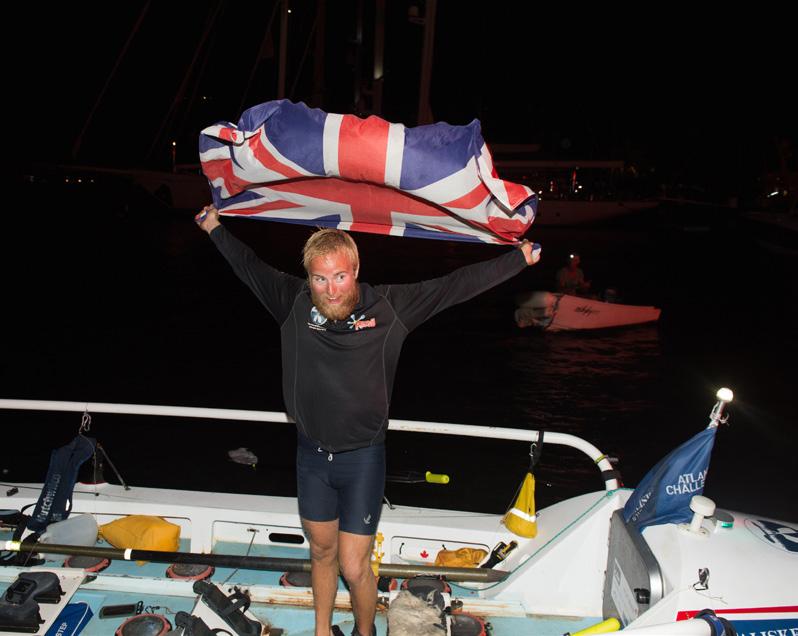
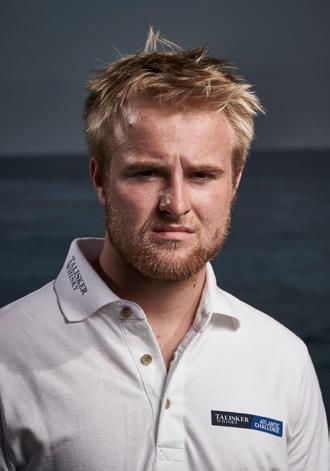
ashipcoming.Thatwasreallyscary–Ithoughtitwouldhitme.Icalledthemon theradioandtheydidn’treplyforquite sometime.Theshipcreweventuallysaw meandsteeredaway.Thatwasprobably thescariestmoment.”
Callum crossed the finishing line in Antigua 58 days 15 hours and 15 minutes after setting off from La Gomera. An astounding personal achievement which raised money for three charities; BrainTumourResearch, Princess AliceHospiceand BRACE
We can’t thank Callum enough for helping to raise funds, and the profile of BrainTumourResearch in this way – a true Fighting Force hero!
You can read his dad Clive’s story, Callum’s inspiration, on our website: www.braintumourresearch.org/in-our-hearts
during the Summer by hosting a coffee morning, afternoon tea, BBQ or dinner party for Brain Tumour Research –simply gather some friends, grab some grub and enjoy!
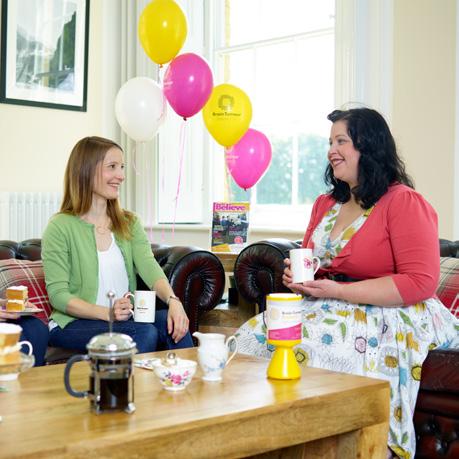
COFFEE MORNING GET TOGETHER
RAISING £300 covers the cost of equipment used during one day of life-saving research at one of our centres!
SET YOURSELF A £300 TARGET AND AIM TO SMASH IT!
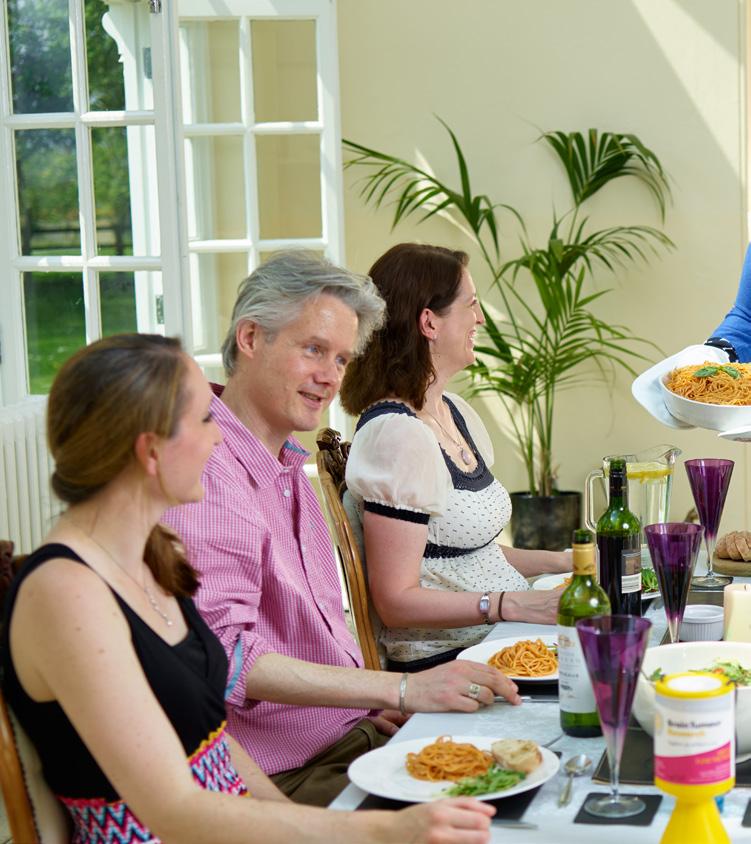

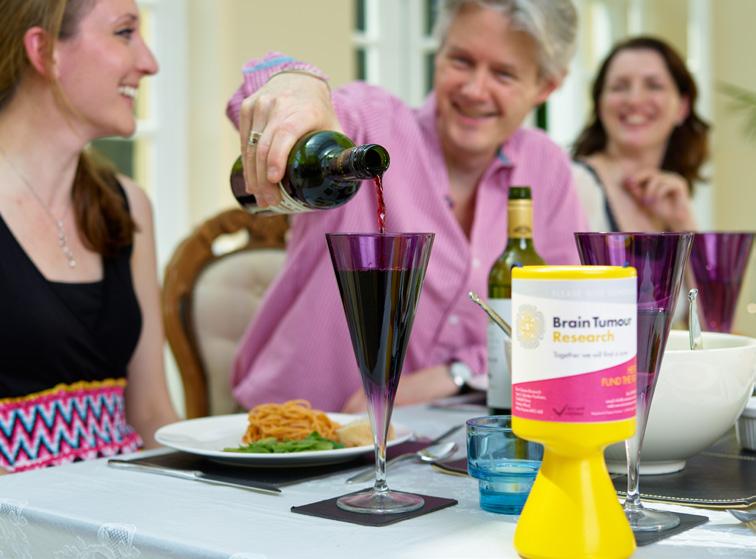
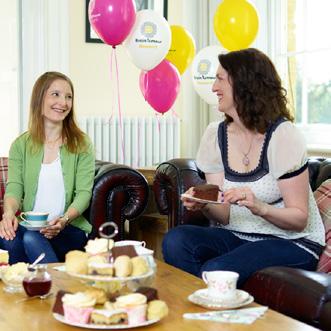
1. Set a fundraising target
Aim for £300 and you will be funding all the pipettes, solutions and dishes needed for one day of research at any one of our Centres of Excellence. Simply sell tickets for your event and hold a raffle or auction!
2. Ask a favour
Whether you’re asking for food, drink, raffle prizes or venue hire – you’ll be surprised how generous people and companies will be when you tell them why you are holding your event.
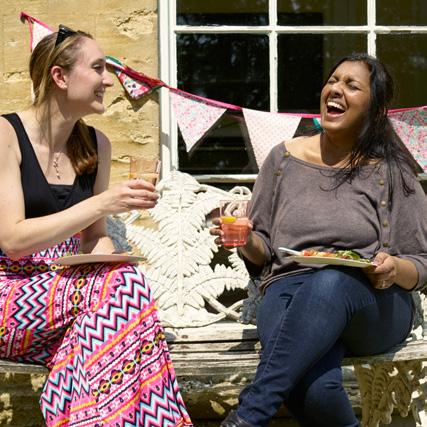
3. Shout about it!
Create a Facebook event; display posters at your school/ workplace/club; share your story with the local press and add your JustGiving link to your email footer. There are so many ways to capture people’s imagination and ask for delicious donations.
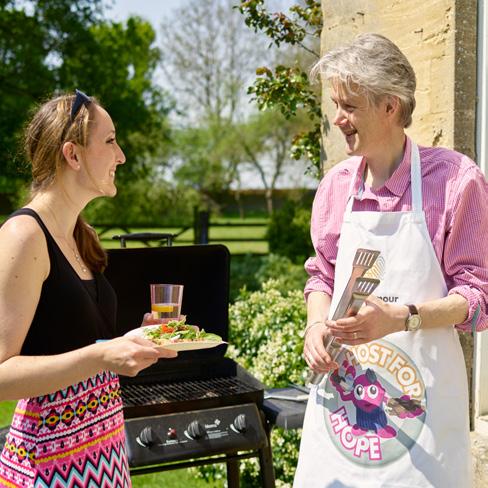

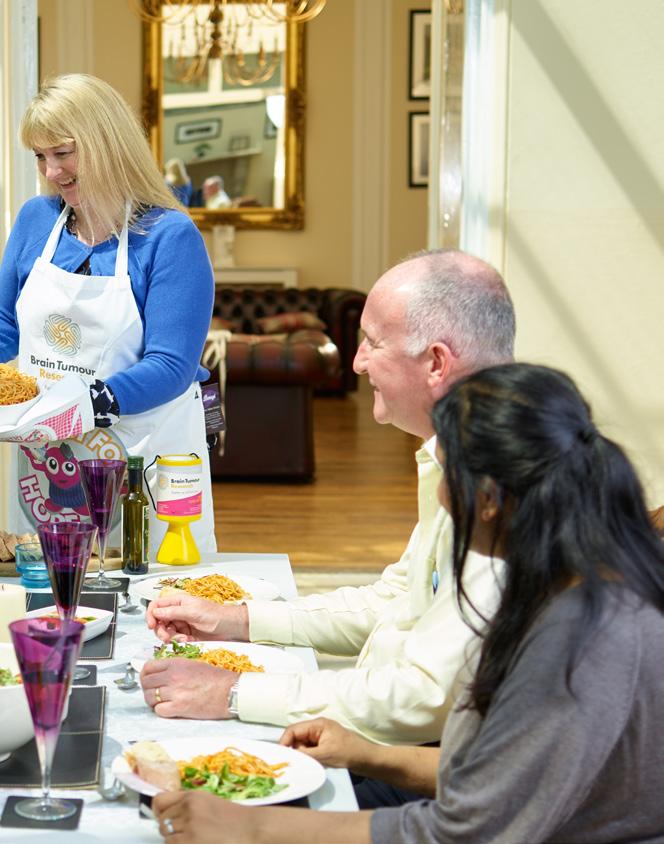
fund a research centre to put an end to brain tumours
In November 2015, Brain Tumour Research gained a vital new member of the team when Dr Kieran Breen joined as Director of Research.
Kieran’s appointment is a landmark moment for Brain Tumour Research as his specialist knowledge, experience and expertise will not only allow us to communicate research progress clearly with our supporters, but also facilitate more frequent collaboration between brain tumour researchers; not just amongst our Centres of Excellence, but also, globally.
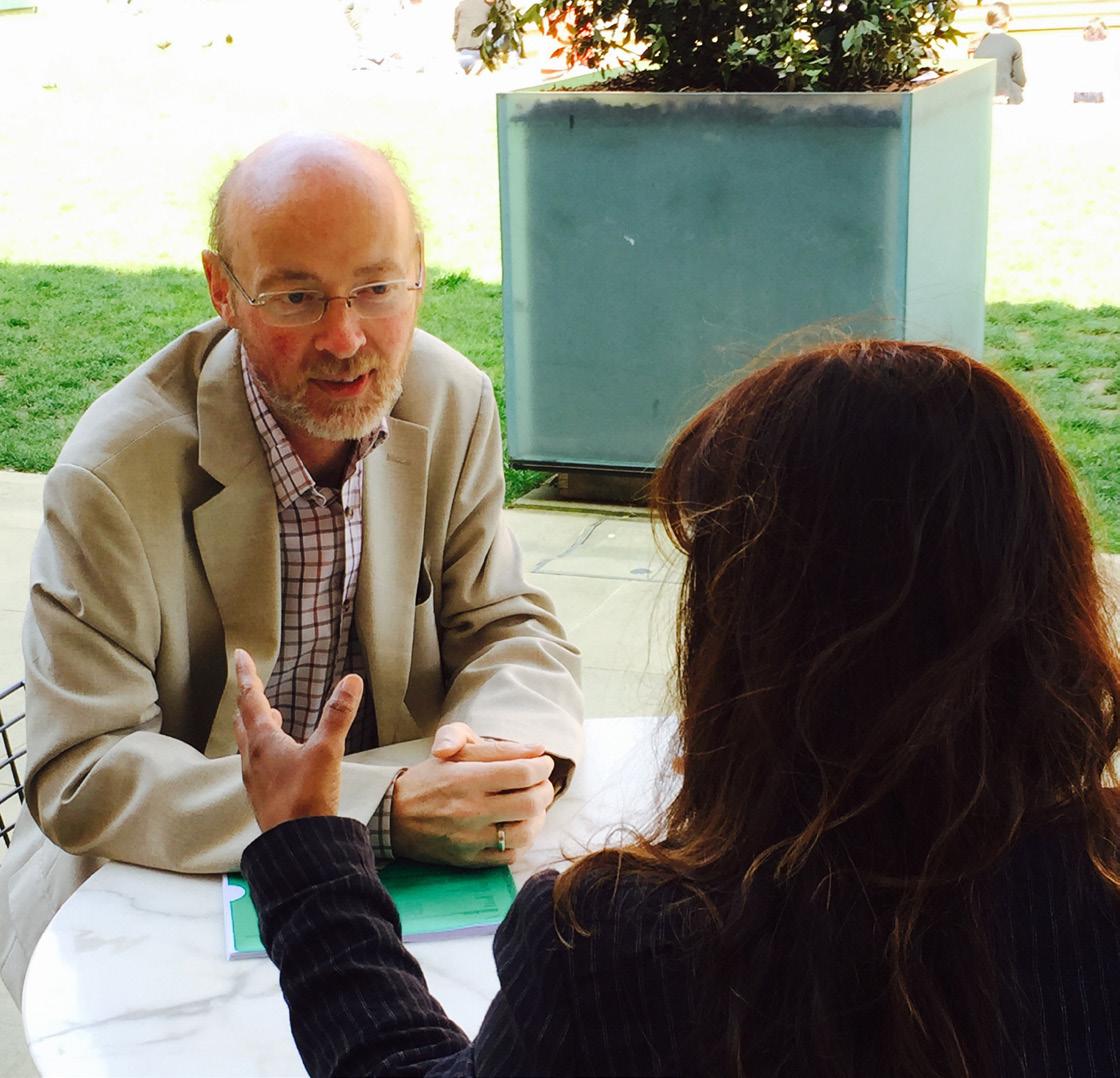
Help us
FUND THE FIGHT
Together we will find a cure
Now over six months into his role, Kieran is already making a huge difference simply by being in regular communication with the scientists we fund. Loredana Guglielmi is a Postdoctoral Research Fellow at the Blizard Institute, Queen Mary University of London (QMUL) – our Centre of Excellence established in 2014.
One day in April 2016, Kieran and Loredana got together to talk about their respective careers, common research areas and hopes for the future of brain tumour research.
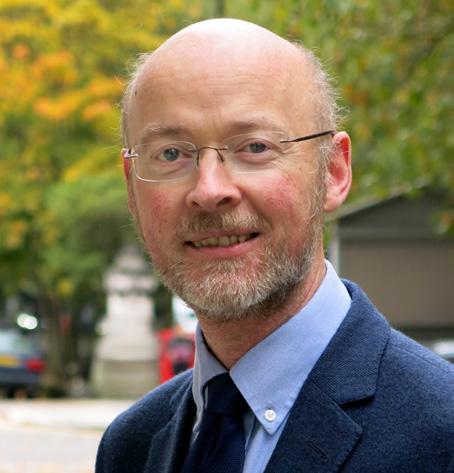
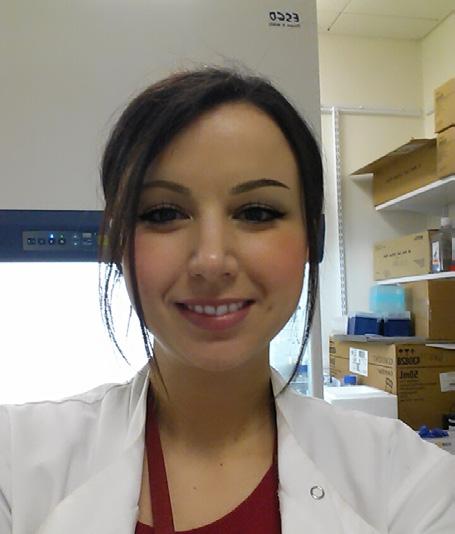
Kieran Breen, Director of Research
Kieran: Whereandwhendidyourinterest begininmedicalresearch?
Loredana: When I was at high school, I was actually in the humanities stream studying literature, philosophy and linguistics. This was in addition to being given an opportunity to study maths and the sciences. One of my linguistic projects involved data analysis and it was then that I realised that I would prefer to move into science rather than to stay in the humanities area. So, I registered for a science degree when I went to university. I did my PhD near Rome at the National Institute for Research on the study of cell biology. Whataboutyou?
Kieran: At school, I had to choose between business studies and science. I was told that I would never earn any money in science, but I did it anyway! My initial degree was in pharmacology – the study of how drugs work –and I was fascinated by how complex the brain was and how little we know. My PhD was on nerve cell development, but I did some research on why brain tumour cells link with each other in a different way to normal cells. My research then moved to the study of Alzheimer’s and Parkinson’s, but here I am again in the area of research into brain tumours.
Kieran: Whatresearchareyoucarrying outatthemoment?
Loredana: I joined Silvia Marino’s lab in April 2015 when she was awarded funding from Brain TumourResearchto set up a Research Centre of Excellence at QMUL. My main area of research interest to date had been the study of genomics –how genes work in cells, and what may happen when this goes wrong – and this post has given me an opportunity to gain more experience in this area. My PhD involved the study of cancer cell genetics and I also worked in Cambridge for eight months studying epigenetics – what actually happens to cells when their genetics change. This work was carried out in blood cells. However, this is one of the key experimental techniques
being used in Silvia’s lab, so I can build upon my existing expertise and also further develop my skills and apply them to the study of brain tumours. I am also learning how to carry out data analysis from the information that we generate in the studies so that we can make the best use of it.
Kieran: Whatdoyouthinkisthemost promisingresearchareainthestudyof braintumours?
Loredana: There is a lot of data being generated at the moment by people studying specific cell types such as glioblastoma. This is referred to in research field as “-omics” – how different components change in tumour cells and how these may interact. This provides us with a better overall view of what is happening rather than focusing just on one gene or protein that may be changed. But we need to work together to ensure that we make the best use of the data that has been generated by sharing it between research groups throughout the world. And the BrainTumourResearchCentres of Excellence provide an opportunity where this could happen, because researchers are generally not very willing to do so at the moment. Andyou?
Kieran: Well, I agree with you about data. There is lots of data out there and if all of this is analysed together, it will really bring our understanding of cancer in general, and brain tumours in particular, to a new level. But, as you say, it all depends on the data being shared, and this is where BrainTumourResearchcan play a key role. As you know, we organise an annual scientific workshop with members of the centres where we can discuss this and decide the best way forward.
Kieran: Howdoyouseeyourcareer progressingfromhere?
Loredana: Working at QMUL has allowed me to use my existing skills, but also to learn more about brain tumours and the up-to-date
techniques that are being used to study them. Silvia’s lab is at the forefront of this area of research and as well as increasing our knowledge, I hope to be able to share this by the publication of key research papers. I have two years left in my current position after which I hope to be able to apply for a personal Fellowship where I will get a grant to build up my own lab within the centre. I would like to continue to carry out research on brain tumours as I think that it is important that a researcher should focus on one particular area. But obviously that depends on me being able to get the appropriate funding!
Kieran: So,Loredana,haveyouany questionsforme?
Loredana: DoyouseeBrainTumour ResearchfundingstudiesoutsidetheUK inthefuture?
Kieran: We have no plans to do so. However, we feel that the establishment of Research Centres of Excellence within the UK will help to build up the overall research capacity for the study of brain tumours. The researchers within the centres can then use their experience to collaborate with other researchers throughout the world to obtain international funding from other sources such as the EU.
Kieran: Finally,ifyouhadnotfollowedthis careerpath,whatwouldyouhavedone?
Loredana: That’s difficult, but I think that I would like to have stayed in science, but maybe do something in the area of biomedical engineering. Andyou?
Kieran: I always liked science at school. But, a friend of mine went back to university to do a history degree when he retired, so maybe I’ll do something similar in the years to come!
Brain tumours kill more children and adults under the age of 40 than any other cancer

We are striving to fund a network of seven dedicated research centres in the UK in order to build a critical mass of experts working towards finding a cure for brain tumours. Our unique funding strategy means that all four of our already established research centres are able to work consistently on research projects in key areas, without the limitations associated with traditional grant funding. In this issue, we are pleased to be able to share updates from the frontline of research at our Portsmouth and Plymouth Centres of Excellence.
HeadofourCentreofExcellenceattheUniversityof Portsmouth,ProfessorGeoffPilkington,with theTherapeuticsResearchSub-groupLead, DrRichardHillandtheMitochondriaResearch Sub-groupLead,DrRhiannonLloyd.Thesetwo researchteamsworkcloselytogetherinengineering andtestingnewmitochondriallytargeted approachesforthetreatmentofbothpaediatric andadultbraintumours.
The latest from Professor of Cellular and Molecular Neuro-Oncology, Geoff Pilkington.
For decades, patients with malignant primary brain tumours have been treated with DNAalkylating drugs, such as temozolomide, which target the DNA within the control centres of the cells, the nuclei. Sadly, these offer little benefit over and above the radiation therapy which these patients are likely to have received. There are a number of reasons for this, firstly, the way these drugs work is by breaking strands of DNA, leading to cancer cell death, but brain tumour cells have a very efficient DNA strand-break repair kit, called MGMT, which mends these breaks. In addition, these drugs can also damage the normal brain cells and frequently do not even reach the outlying tumour cells which have spread into areas of normal brain.
Not happy with this approach, researchers at Portsmouth have been concentrating on drugs which they discovered selectively killed tumour cells, but left normal brain cells unaffected. They then discovered that these drugs, which also crossed the blood-brain barrier, meaning they could reach all the tumour cells, even those which had invaded deep into the normal brain, exerted
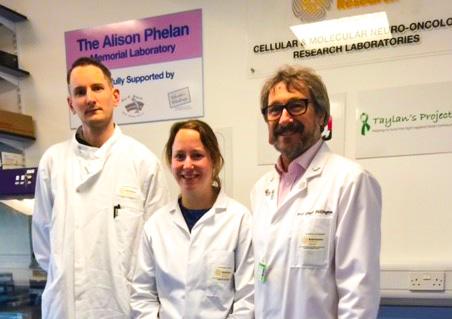
their tumour cell killing effect not via the nuclei, but via tiny bodies within cells which produce energy. These energy producing bodies are called mitochondria and the Portsmouth team discovered that certain drugs, which had previously been used for treating completely different diseases, by way of different biological mechanisms, could gain entry into tumour cell mitochondria, but not into normal cell mitochondria. This is due to the fact that the membranes around mitochondria of cells within the tumour offer less resistance than those around normal cell mitochondria. Once inside the tumour cell mitochondria, the drugs led to the ‘suicide’ of these malignant cells.
Such “re-purposed” drugs, which include anti-depressant and anti-malarial agents, are now under intensive study in the Portsmouth laboratories.
The focus has now switched from a concentration on the nuclear DNA as a target for therapy to one on the mitochondria. Interestingly, mitochondria have their own DNA and the mitochondrial DNA from biopsies of many patients with GBM, as well as paediatric brain tumours, is being screened for specific mutations which might lead to significant clinically relevant findings. Several key mutations have already been identified; of particular interest are those which have functional significance to
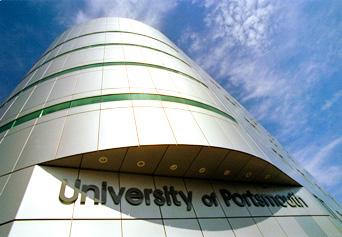
the behaviour of cancer cells and their response to different drugs. In order to study the identified mitochondrial DNA mutations in a simple environment, yeast cells are used (this approach has been used previously to address important questions in cancer biology). Identifying specific mutations which correlate with drug response to certain mitochondriallyacting, repurposed drugs will enable the team to determine which patients should, and which patients should not, be treated with these drugs. Furthermore, by use of structural biology computer-generated modelling systems, it is possible to design new drugs to treat, for example, particular sub-groups of patients within the broad group of glioblastoma.
fund a research centre to put an end to brain tumours
PhD Researcher, Kayleigh Bassiri BSc Msc talks about the centre’s current projects:
The research at our Centre of Excellence within Plymouth University is focused on finding novel methods to treat low grade brain tumours. Researchers are concentrating on meningiomas and schwannomas, which are two common tumours that form both spontaneously as well as being associated with an inherited condition, neurofibromatosis 2 (NF2). At present, there are no drugs approved to treat either of these tumour types. Patients have only surgery and radiotherapy as their treatment options, and these are not always effective or even possible depending on the location of the tumour. As part of the team’s programme of translational and stratified medicine, they focus their efforts on identifying biomarkers that will improve the speed and accuracy of diagnosis, as well as new drug targets than can be utilised in more effective therapies. Biomarkers are biochemical factors, ideally in the blood, which could indicate whether somebody has a tumour, how it is developing and whether it is responding to treatment.
Researchers at Plymouth University have entered the era of ‘personalised medicine,’ in translational brain tumour research.
It is no longer acceptable to aim to treat all patients with the same drug, as some patients are less likely to respond than others to certain drugs. This is largely due to heterogeneity between tumours, or the presence of many cells within a tumour expressing different proteins, that dictate how a person will respond, or how likely their tumour is to become resistant to a particular drug. Using a technique called mass spectrometry, researchers are able to analyse brain tumour samples directly from patients to define their ‘proteomic signature,’ or in other words find out what proteins are expressed more highly in cancer cells compared to normal cells. This allows them to then identify drugs already available that can
be tested on tumour cells in the laboratory, as a pre-clinical assessment of their effectiveness.
Furthermore, they can take brain tumours known to have specific genetic mutations and define their proteomic signatures based on these mutations. This will allow the researchers in the long-term to look directly for specific features in each patient’s tumour that will help them choose the best treatment option. Their most recent project is looking at patient blood samples to identify circulating tumour biomarkers that can also help us to decide on the best course of action, this is what is called liquid biopsy. The advantage of this technique is that it is much less invasive than a tumour biopsy.
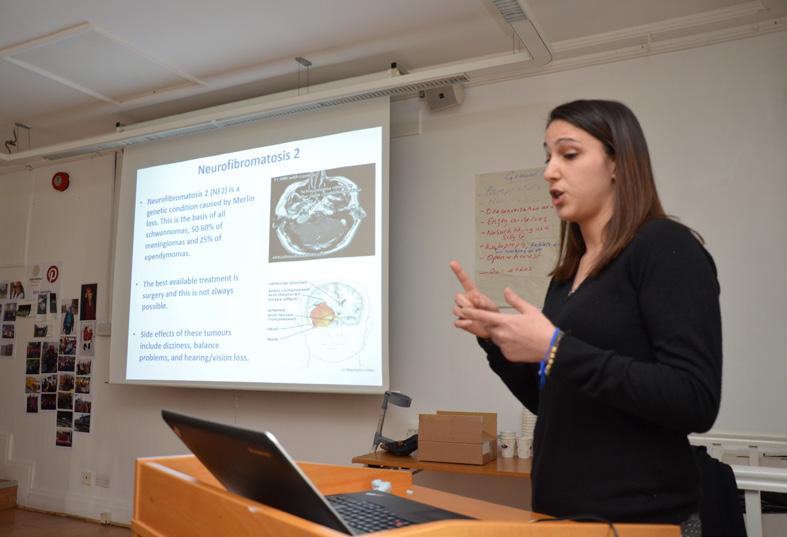
Plymouth University’s long-term vision is that they will be able to characterise each tumour into sub-categories giving patients a higher chance of responding to a particular drug. They aim to use this process within the next few years, using a modern trial design.

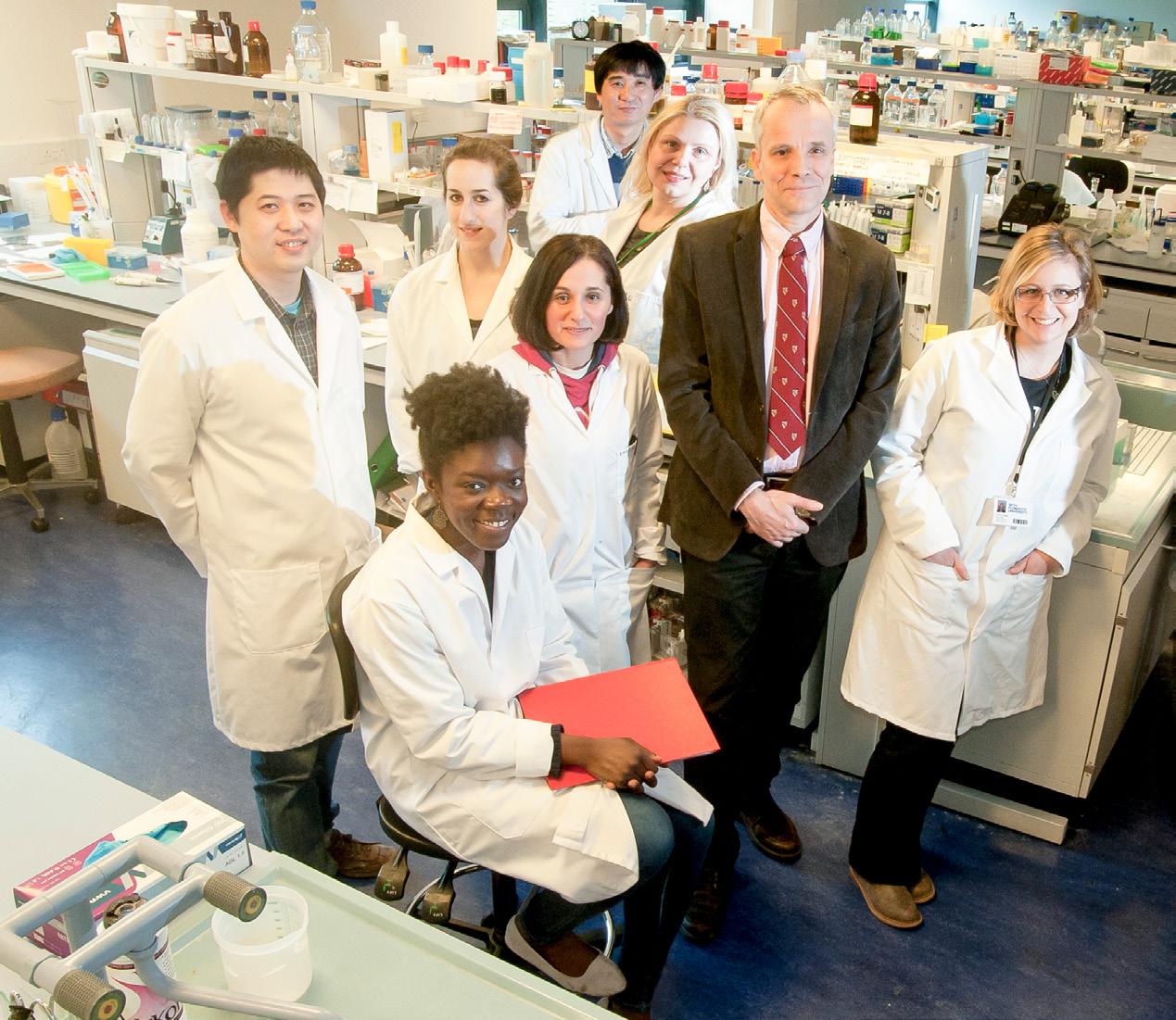

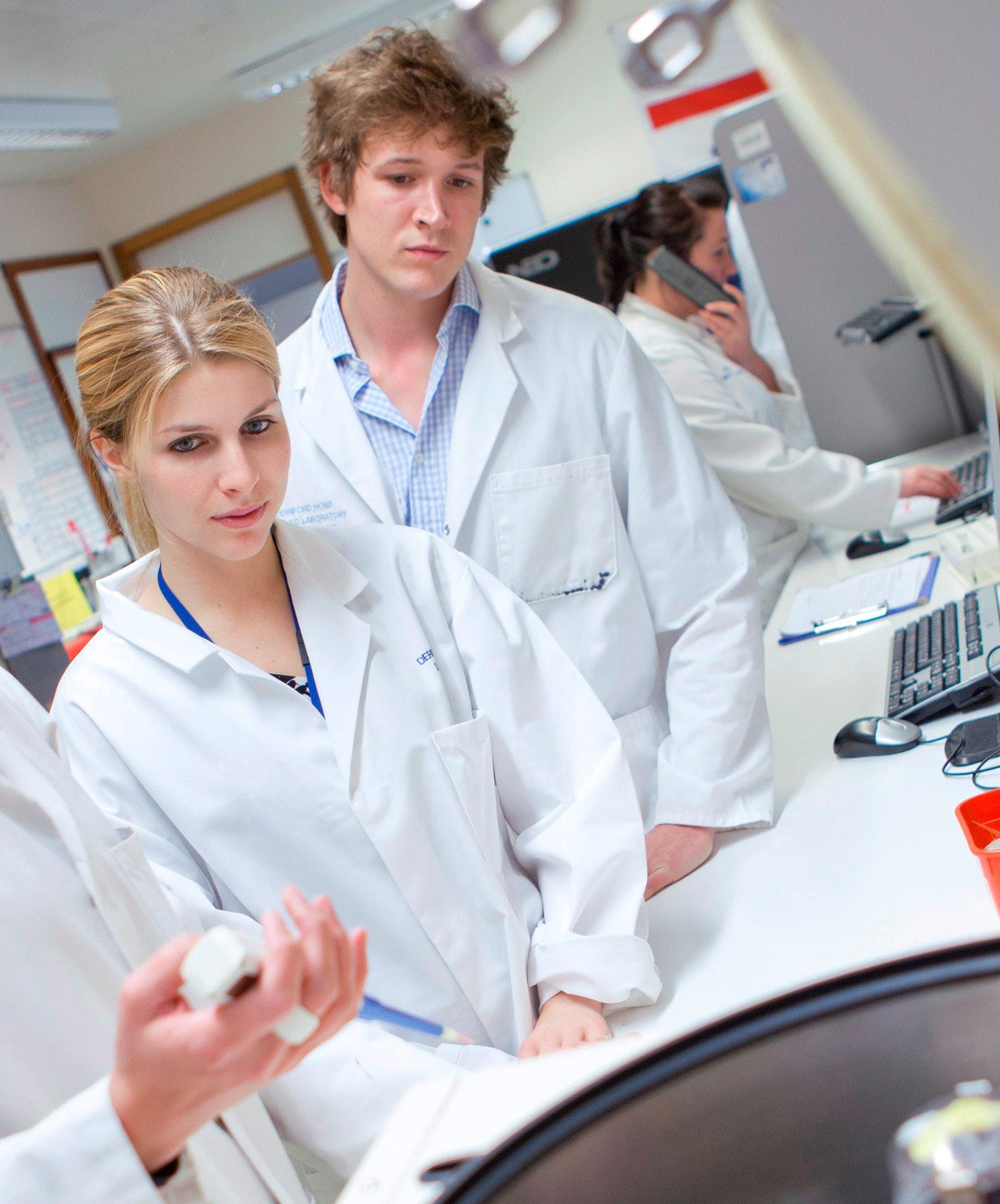

Here is a snapshot of a research lab at one of our Centres of Excellence. The range of equipment needed by our scientists is huge – here are just a few examples of the day-to-day ‘consumables’ that our teams need to carry out their vital research.
HELP US
Ranging from 26p for a flask to £240 for an extraction kit, these are essential items needed to help drive progress in brain tumour research. Just one of our centres would need over £100,000 per year to cover these basic costs.
A core item in every lab, these are used to grow cancer cells. They can only be used once, so a continuous supply is necessary but costly over time.
26p-46p each
(Quantity used per year: 100s)
Essential for researching the effects of different chemotherapy drugs on tumour cells. Multiple trays are used on a daily basis.
Approx. 50p each
(Quantity used per year: 100s)
These disposable tips are used with the Gilson pipettes (see item no. 6). They help speed up processing and reduce cross-contamination.
£3.40 per box of 96
(Quantity used per year: 500-1,000 boxes)
The most durable of all sensitive rubber gloves, wearing these is a necessity for health and safety, and again to avoid contamination during the intricate experiments.
£4.00 per box of 100
(Quantity used per year: 150+ boxes)
These are the liquids in which cancer cells are grown so that they can be used for experiments. They are grown at body temperature so that the results are as true-to-life as possible.
£11.70 per bottle
(Quantity used per year: 240 bottles)
This electric pipette is used for moving liquids around in micro quantities (one millionth of a litre) – allowing for the extremely intricate and accurate work needed in neuro-oncological research.
£107 each
(Quantity used per year: Around 50)
7
Researchers use these to isolate RNA/DNA from a variety of tissue samples. This is then used in experiments to help understand brain tumours at a genetic level to move towards greater personalised treatments.
£240 per kit (5-20 kits per year)
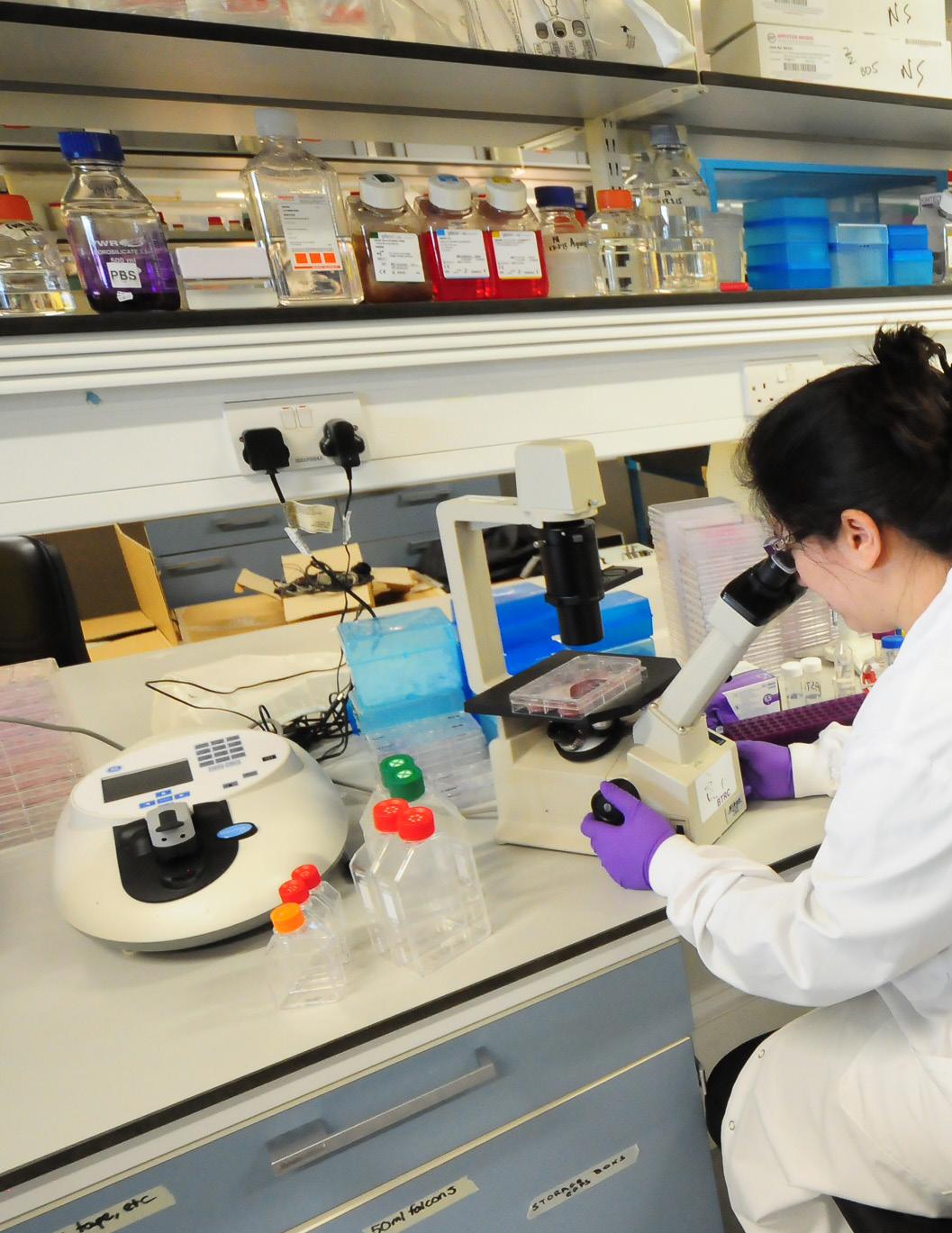
Could you help us to keep these costs covered?
Set up a regular standing order –see page 49 to find out how.
1 26
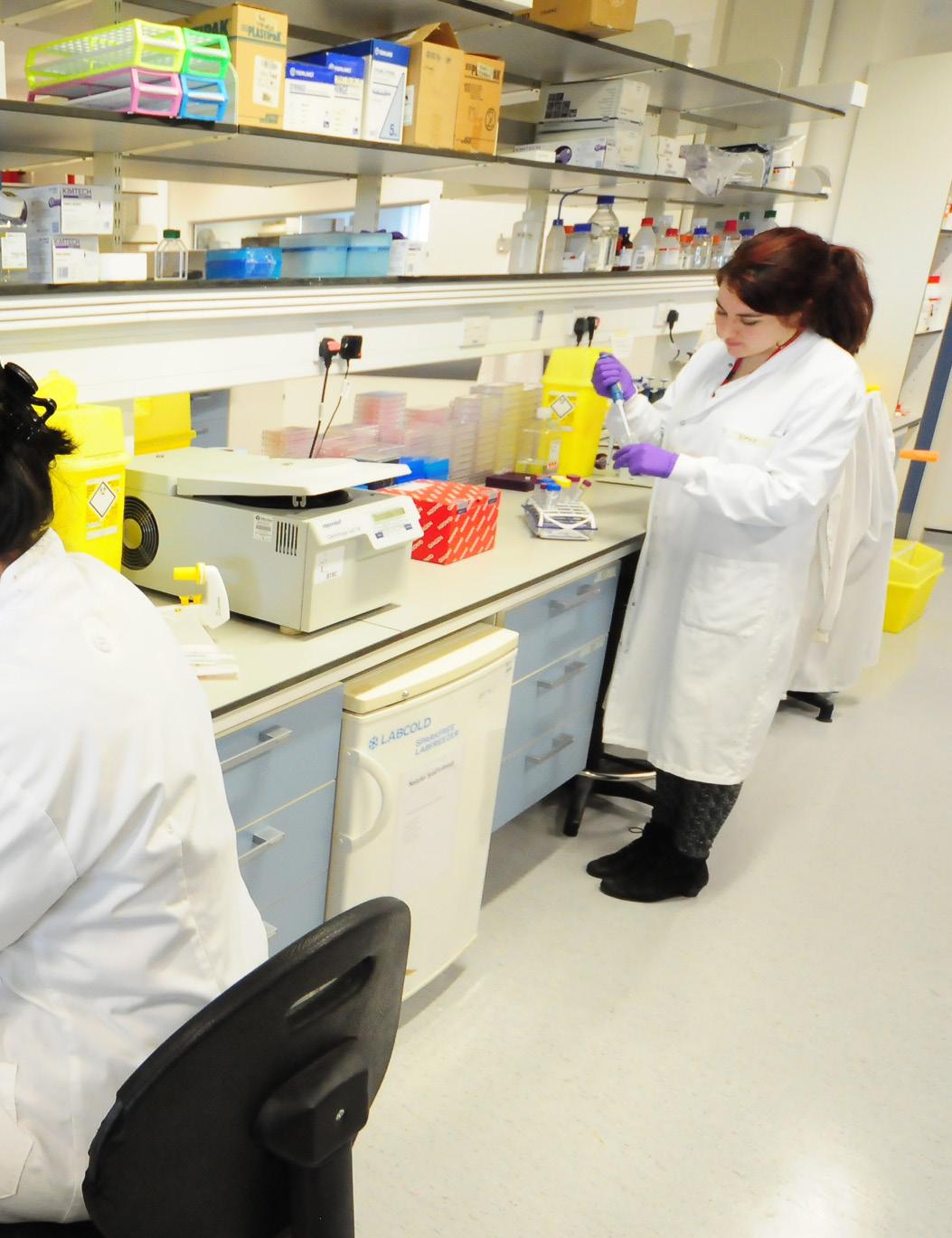
7 Text RSCH16 £5 to 70070 to donate £5
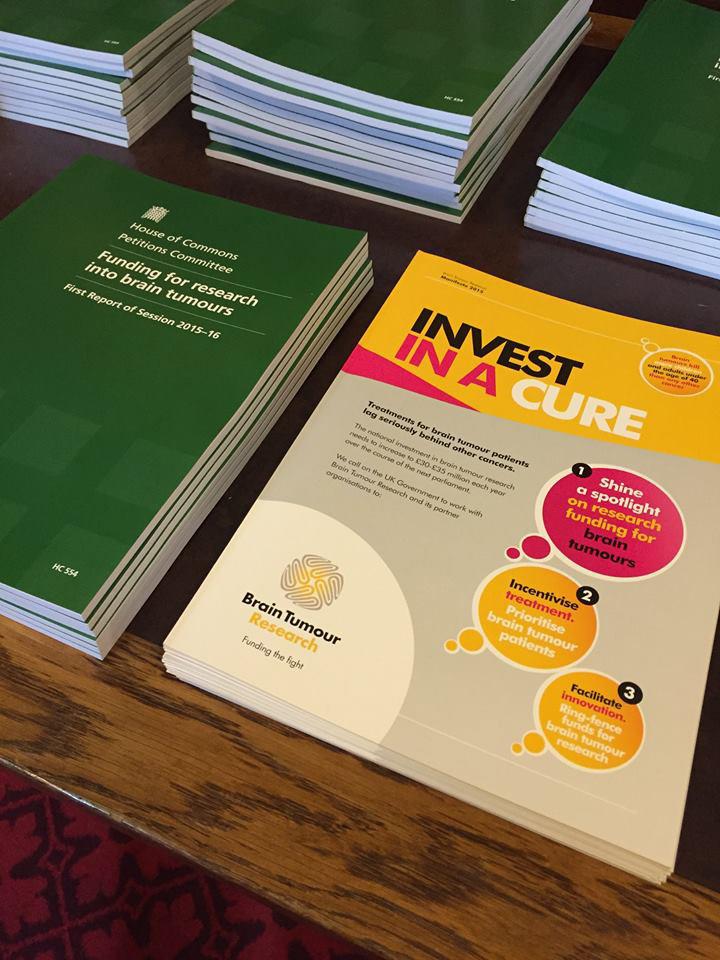
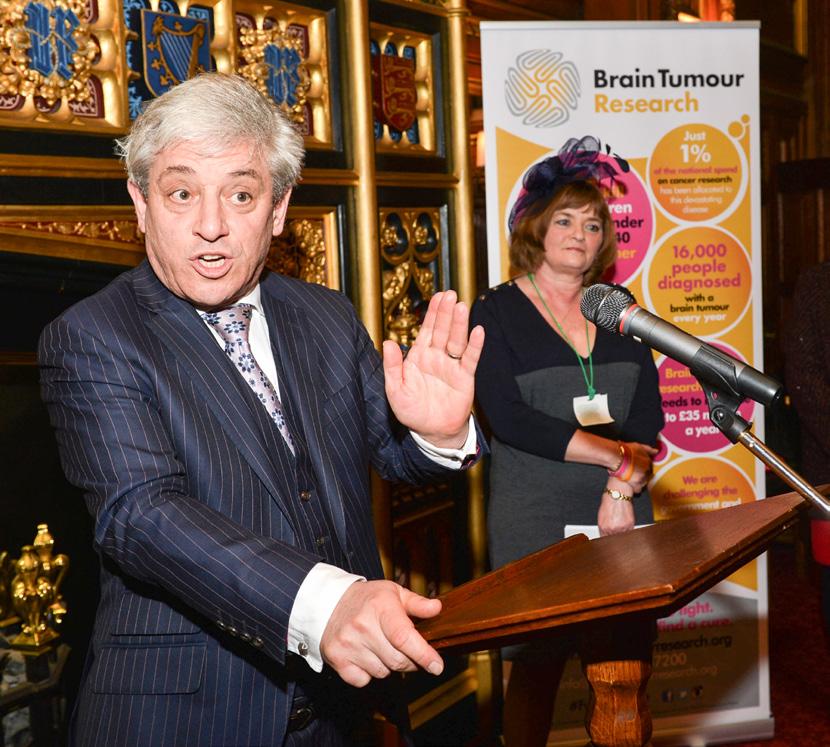
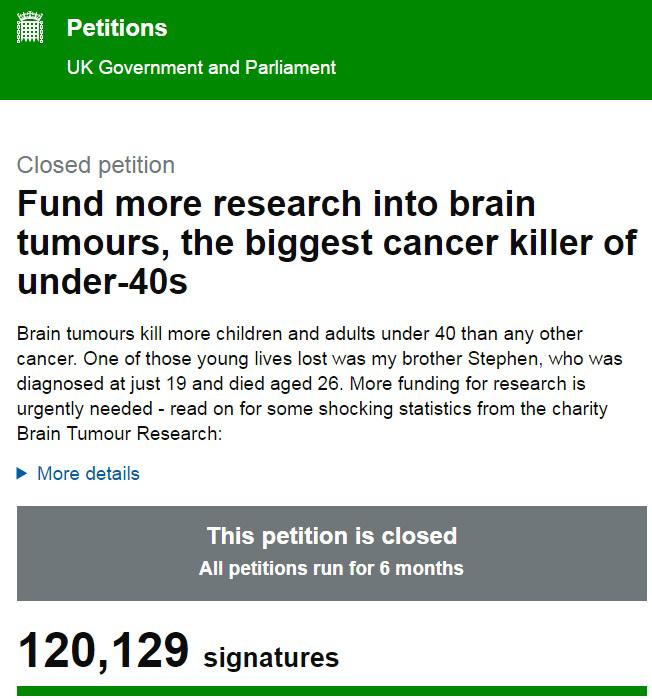
Brain tumour research funding needs to increase to £35 million a year
On 9th March 2016, at the beginning of Brain Tumour Awareness Month, we were joined by 150 guests at our annual Speaker’s House event at Westminster. MPs, scientists and supporters came together to create a united voice, raising awareness for the lack of research funding brain tumours receive.
The evening saw a kind welcome from Brain TumourResearchpatron Rt Hon John Bercow MP, as well as poignant and moving speeches from Chair of the Petitions Committee Helen Jones MP, Chair of the All Party Parliamentary Group on brain tumours Rebecca Harris, and Maria Lester, who started the petition for greater brain tumour research funding after the tragic loss of her brother Stephen. (Readtheirfullstoryonpage36)
All attendees were asked to wear their favourite hat for the event as we continued the countdown to Wear A Hat Day 2016!
THANK YOU
to everyone who joined us for this inspirational evening. Together we will find a cure.

Campaign with us
Just 1% of the national spend on cancer research has been allocated to this devastating disease
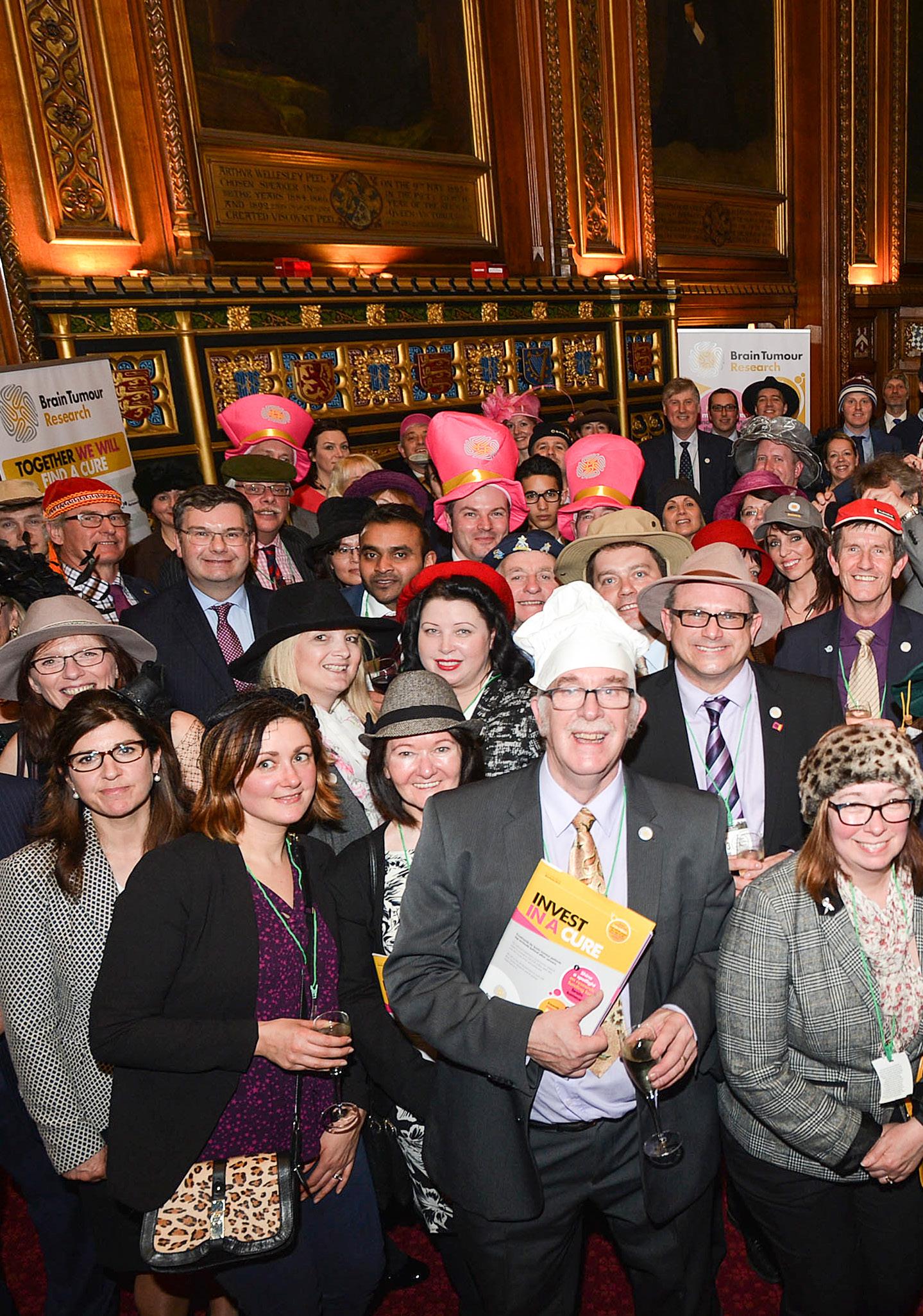
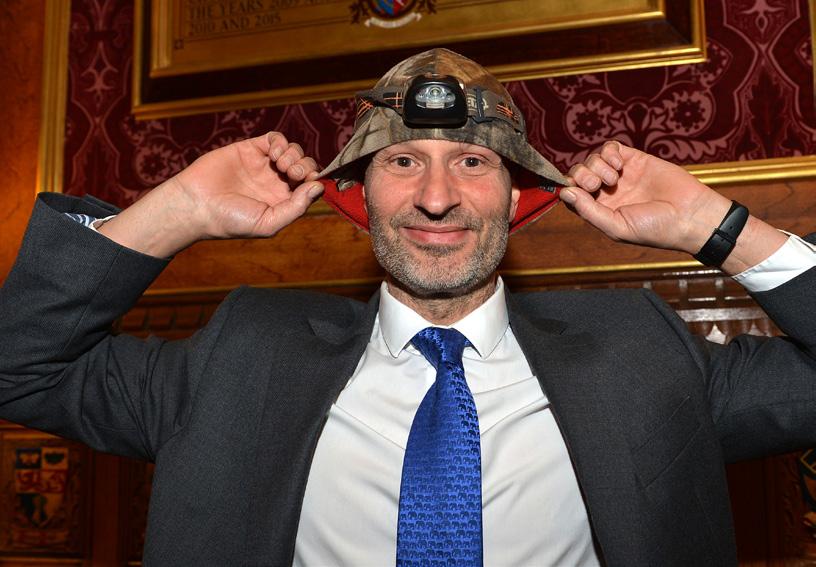
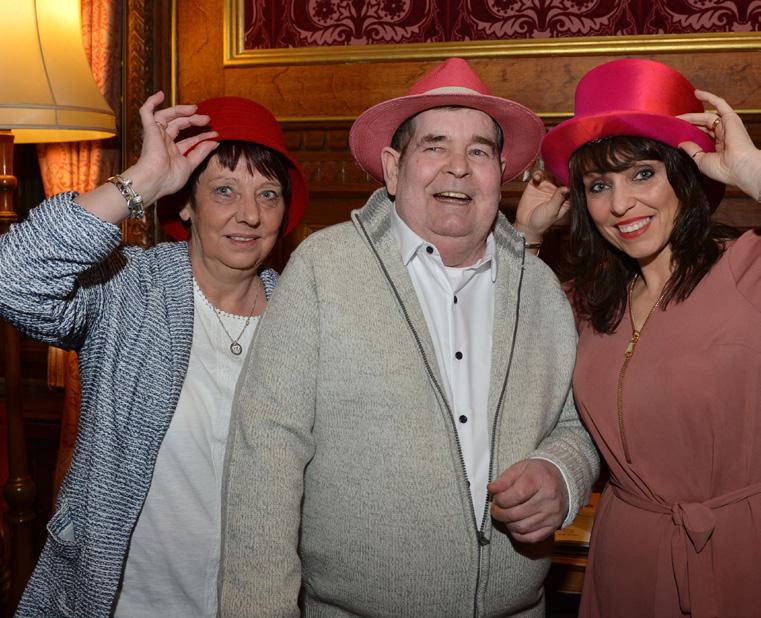
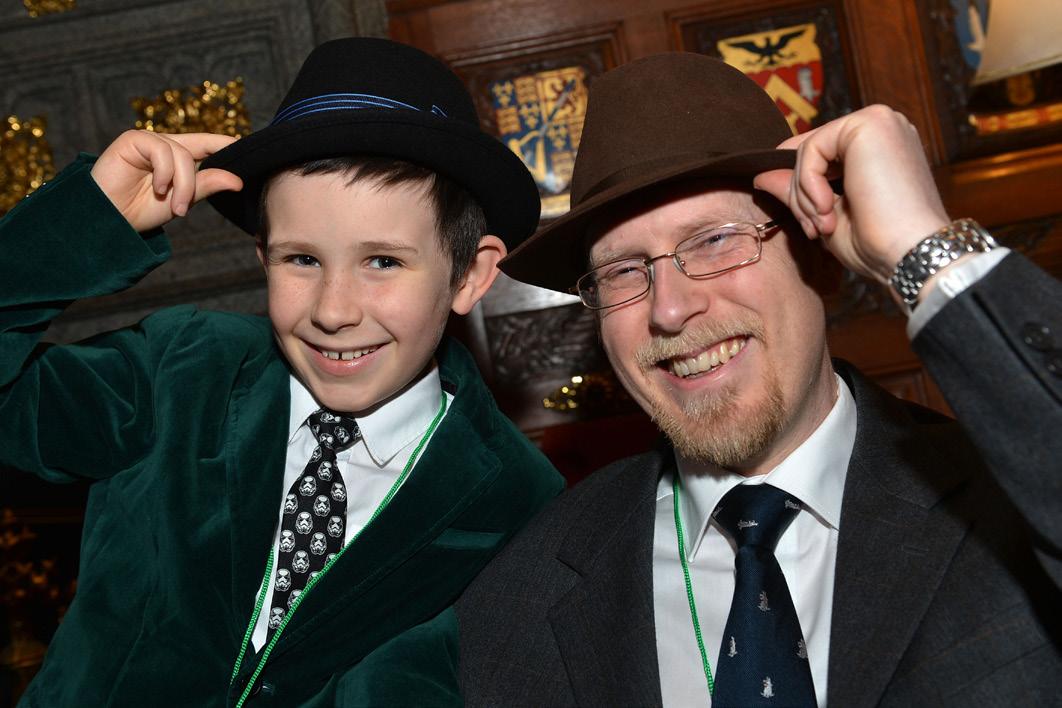
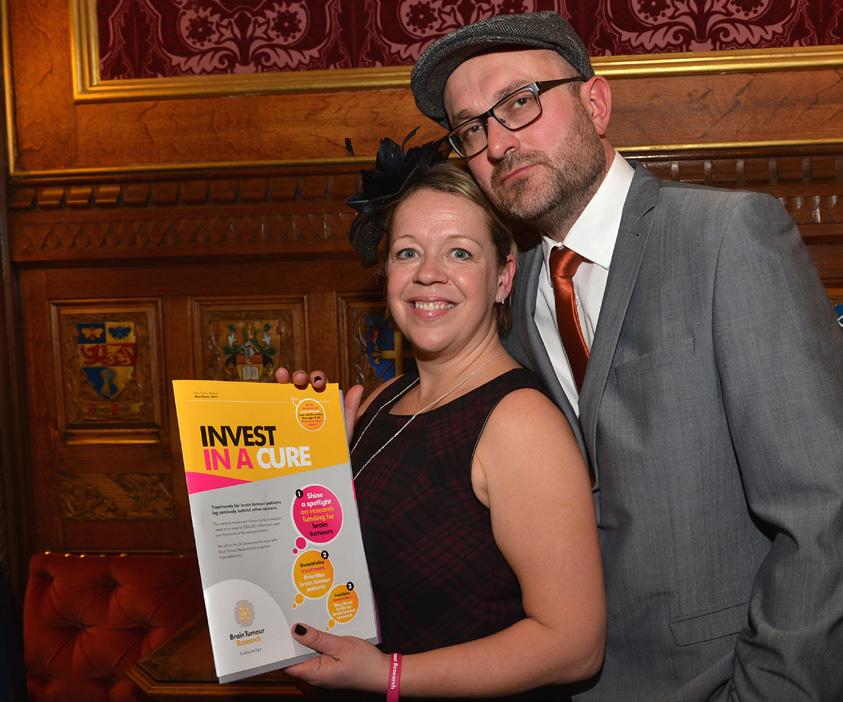
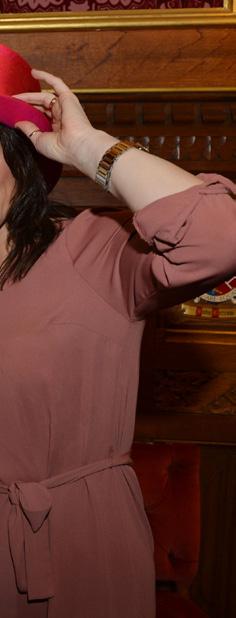

In August 2015, a year after losing her brother to a brain tumour, journalist Maria Lester set up an e-petition calling for more funding for brain tumour research. She was determined that her brother Stephen’s death at the age of just 26 would not be in vain. After just one week, the e-petition had been signed over 10,000 times, prompting the Government to publish a formal response.
It was clear that Stephen’s story had captured the hearts of many and the e-petition became a tangible representation of the collective voices of those whose lives had been devastated by the effects of brain tumours.
Upon reaching 14,000 signatures, the Petitions Committee announced that they were to launch a formal inquiry. On 20th October 2015, the public were invited to share their personal stories on the Petitions Committee’s web forum. In just ten days, 1,104 comments had been submitted. This formed a comprehensive database of evidence for what they announced would be their first-ever inquiry.
The first of four evidence-giving sessions took place on 3rd November 2015. The emotion, strength and determination of those who spoke
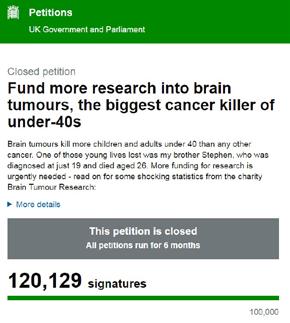
Brain tumours kill more children and adults under the age of 40 than any other cancer… Yet just 1% of the national spend on cancer research has been allocated to this devastating disease. That’s why Brain Tumour Research treats lobbying and campaigning as a priority.
was undeniably powerful and the Petitions Committee were left in no doubt of the support behind the cause.
Maria, her parents Liz and Peter Realf and countless other dedicated supporters were tireless in their campaigning for signatures and BrainTumourResearchwas also committed to galvanising support for the e-petition. Momentum grew steadily over the Christmas period and culminated in a frenzy of signatories amid saturated media coverage across the country during the final weeks leading up to the deadline of 3rd February 2016.
The final signature count came in at 120,129; an unprecedented success and the greatest momentum for any petition into brain tumours in the UK.
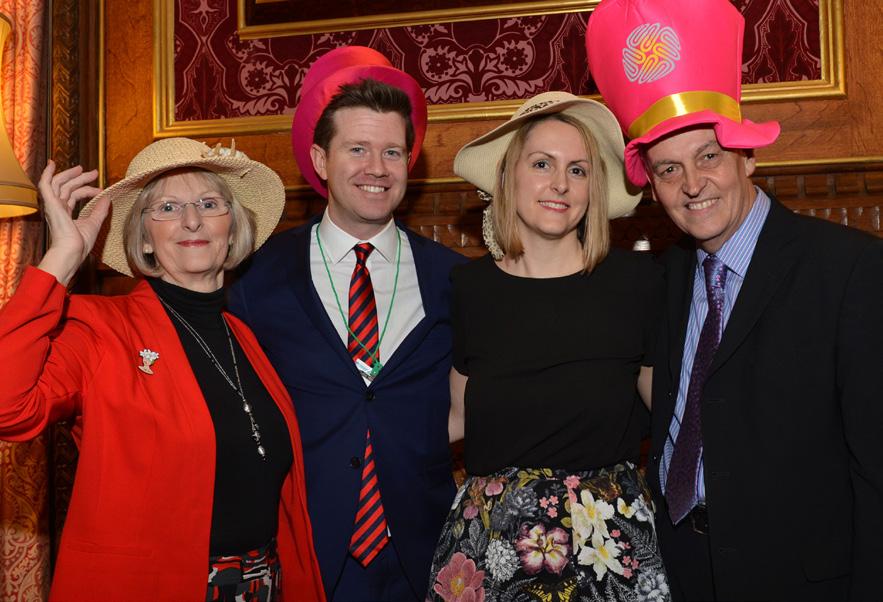 Maria Lester and family at Speaker’s House
Maria Lester and family at Speaker’s House
On 14th March 2016, just over one month after the e-petition closed, the Petitions Committee published their official report into the issue of brain tumour funding.
‘Funding for research into brain tumours’ is a comprehensive, 73-page document outlining their findings and detailing recommendations to the UK Government for improvement. Fundamentally, it concluded that brain tumour research funding has been “inadequateand notgivensufficientpriority”
The report launch event at Westminster Hall was attended by BrainTumourResearchsupporters, MPs and other cancer charities and was another chance for those all-important voices to be heard right at the heart of UK Government.
In the weeks leading to the debate we used every available resource to encourage MPs to attend. Activity included encouraging our supporters to write to their local MP; publishing a call-to-action in The Times newspaper (signed by scientists and celebrities including Debbie McGee, loving wife of the iconic Paul Daniels who had died from a brain tumour just a few weeks before) and Rebecca Harris MP, Chair of the All Party Parliamentary Group on brain tumours sending a personal appeal and copy ‘Danny’s Journey’ – a book recently written by Danny’s father, co-founder of one BrainTumourResearch’s Member Charities, TheDannyGreenFund– to all MPs.



Monday 18th April 2016 represented the pinnacle of years of support, strength and unanimity on the subject of research into brain tumours, as over 70 MPs attended a standing-room only debate at Westminster Hall – broadcast live on Parliament TV. Such was the urgency of attending MPs to share their constituent’s moving stories, they had to be restricted to four minutes each. Emotions ran high among some MPs as they shared some heart-breaking stories of their constituents –brain tumour patients, their families and their friends who had been let down time and time again by the lack of investment in brain tumour research. Treatment options for brain tumours lag severely behind those for other, better-funded cancers leading to disproportionate and shockingly low survival rates.
Sue Farrington Smith, Chief Executive of Brain TumourResearchsaid: “Iamimmensely proudthat,withthesupportofthousandsof patients,familiesandactivists,thewoeful underfundingofthisdreadfuldiseasehas finallybeenacknowledged.Ourvoiceshave beenheardandtheworkofthepast15 yearshasnotbeeninvain.
“Someofthekeyissueshighlightedin ourInvestInACuremanifestohavebeen addressedandwewillcontinuetoapply pressuretoensuregenuineprogressis made.Wehavereachedanimportant milestoneonourjourneyandwewill continuewithreneweddetermination.”
At the end of the three-hour debate, Health Minister George Freeman MP announced a package of measures to address the issues presented by MPs.
He said the Government will now:
• Establish a ‘Task and Finish’ working group at the Department of Health. This will be a special project team who will conduct an in-depth review of the key areas and recommendations set out by the Petitions Committee in their report.
• Request that the National Institute for Health Research (NIHR) produce a national register within a year to examine how public funds are spent on research. This will examine spending on different disease areas and different organs, including the brain, by the different treatments used.
• Seek to improve levels of earlier diagnosis and include brain cancer in the Genomics England programme.
Brain

We are now looking positively to a future in which the Government can use these new measures to start supporting those who have been let down for far too long.
It is with great sadness however, that we reflect on the fact that the stories told at the debate (and beyond) are due to the hundreds of lives that have been lost while fighting and waiting for change.
The future is still unclear for brain tumour research funding, but we are more confident than ever that if we continue to stand in solidarity with our supporters, MPs and larger cancer charities, we can and will bring change.
Together we will find a cure.
Help us support vital research today. Text CURE35 £5 to 70070 to make a donation.
Keep up-to-date with all the latest lobbying progress by signing-up to our email bulletins. Simply email sharon@braintumourresearch.org to be added.
You can also go online for the latest lobbying news, to register your interest in future campaigning events and to read our ‘Invest In A Cure’ manifesto:
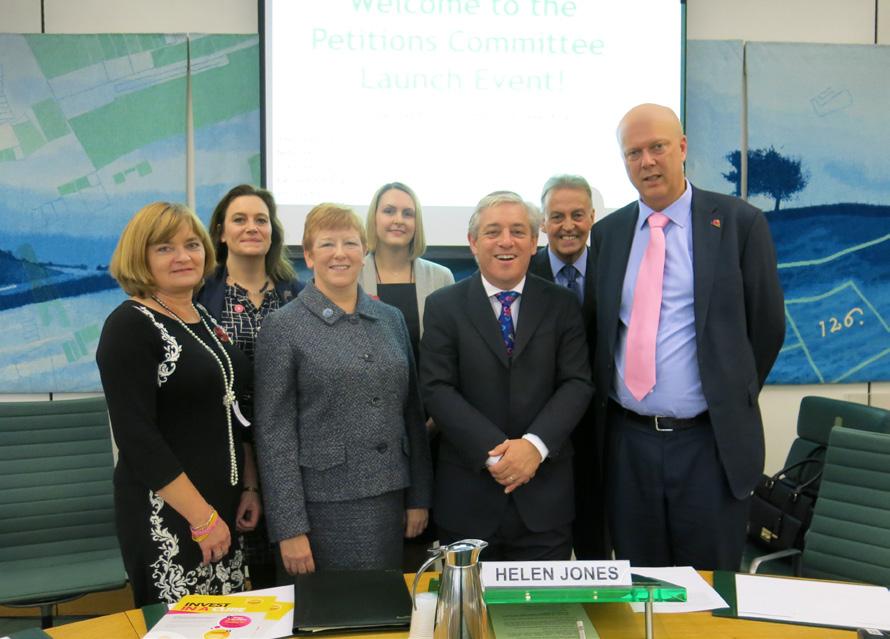
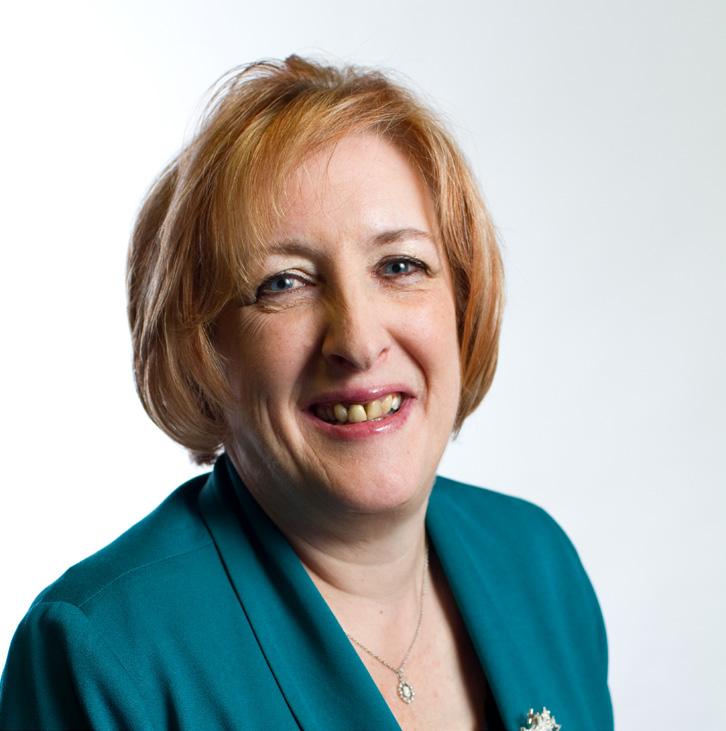
of St Helens Citizens Advice Bureau, Yvonne Fovargue has worked all her life to fight injustice and to speak up for those without a voice in society.
Yvonne is the Member of Parliament for Makerfield in Wigan, Greater Manchester. During the last Parliament Yvonne served as an Opposition Whip, Shadow Minister in the Transport and Defence Teams and as Shadow Minister for Young People.
She is a member of MENSA, an avid reader of crime fiction and a fan of the music of David Bowie.
Cutting her teeth as a Housing Officer on the Moss Side estate, Manchester in the early 1980s and later in her role as Chief Executive

Tom Brake has been the MP for Carshalton and Wallington since 1997.
Tom was born in Leicestershire and from the age of eight, lived with his family in France, attending the Lycee International.
Yvonne currently holds the Consumer Affairs & Science brief in the Shadow BIS team. She is Chair of the All Party Parliamentary Group on Debt & Personal Finance. She is also an active campaigner and advocate for Credit Unions.
Yvonne is supporting constituent James Hinnigan who recently underwent surgery following a brain tumour diagnosis. James rallied the support of people in both Yvonne’s constituency of Makerfield and neighbouring Wigan. Makerfield achieved the most signatures (2,269) of any constituency throughout the UK in the recent e-petition.
Upon returning to England, Tom attended Imperial College, London where he gained a BSc (Hons) degree in Physics.
In 1988 he became a Liberal Democrat Councillor in Hackney and then in Sutton. Having been a Government Minister during the Coalition Government, Tom is now the Liberal Democrat Foreign Affairs Spokesperson, Chief Whip and Shadow Leader in the House of Commons. For nearly 20 years Tom has championed his local area and represented thousands of constituents. He has campaigned for many years on transport and health issues within Carshalton and Wallington and has won numerous awards in recognition of his campaigning.
Tom has recently raised awareness of the need for an increase in the percentage of national spend on research into cancer to be spent on research for better diagnosis and treatment of brain tumours and is proud to support BrainTumourResearch.
His recent Early Day Motion calling for support gained the signatures of 68 cross-party MPs.
Together we will find a cure Campaign with us

Our zealous team of PR professionals is always on the case tracking down good opportunities to raise awareness and funds for BrainTumourResearch
In the countdown to the closure of the e-petition on 3rd February, PR managers Susan and Liz (pictured below) were rallying supporters across the UK to share their stories in the media to ensure the magic total of 100,000 signatures was reached – enough to spark a parliamentary debate. And you didn’t let us down! Thanks to numerous radio and TV interviews and features in national and regional newspapers, the final tally of signatures was more than enough –in excess of an eye-watering 120,000!
Highlights included Maria Lester, the originator of the online petition on the anniversary of the death of her brother, Stephen Realf, executing an amazing call to arms on BBC Breakfast, our very own Director of Research, Dr. Kieran Breen’s

motivating interview on Sky TV and journalist Nicki Waterman’s feature in the Sun about remaining incredibly positive despite her diagnosis with an aggressive brain tumour, just weeks after losing her husband. Nicki went on to be interviewed by Lorraine Kelly on ITV breakfast television.
Dedicated supporter, Emily Corrigan, just 28 when diagnosed, decided that the e-petition warranted shock tactics. Normally going to great lengths to hide it, she courageously decided to post a photo of her great big scar on Facebook (pictured above left). The post went viral and was shared 18,745 times, leading to a powerful piece in the Daily Mail on the very last day that people could register their signature.
Throughout the UK, the rally cry for signatures went out across social media, with a fiercely-fought competition to be the constituent with the most signatures.
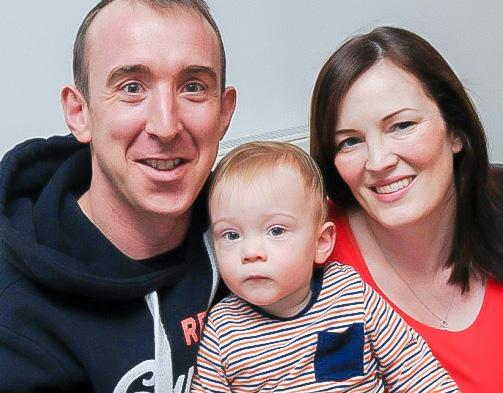
This accolade finally went to Makerfield, largely down to the extraordinary inspiration of Ashton-in-Makerfield dad, James Hinnigan (pictured above right with his young family), who mobilised thousands to sign the e-petition while waiting for a date for brain surgery and to join a clinicial trial.
Following the publication of the Petitions Committee first ever report, we were able to secure yet more national headlines. None more so perhaps than in The Independent which led with a headline announcing that Health officials have “failedbraintumour patientsandtheirfamiliesfordecades.”
We’d like to say a huge thank you to everybody who helped make brain tumour history and secure a milestone debate at Westminster. Together we will find a cure.
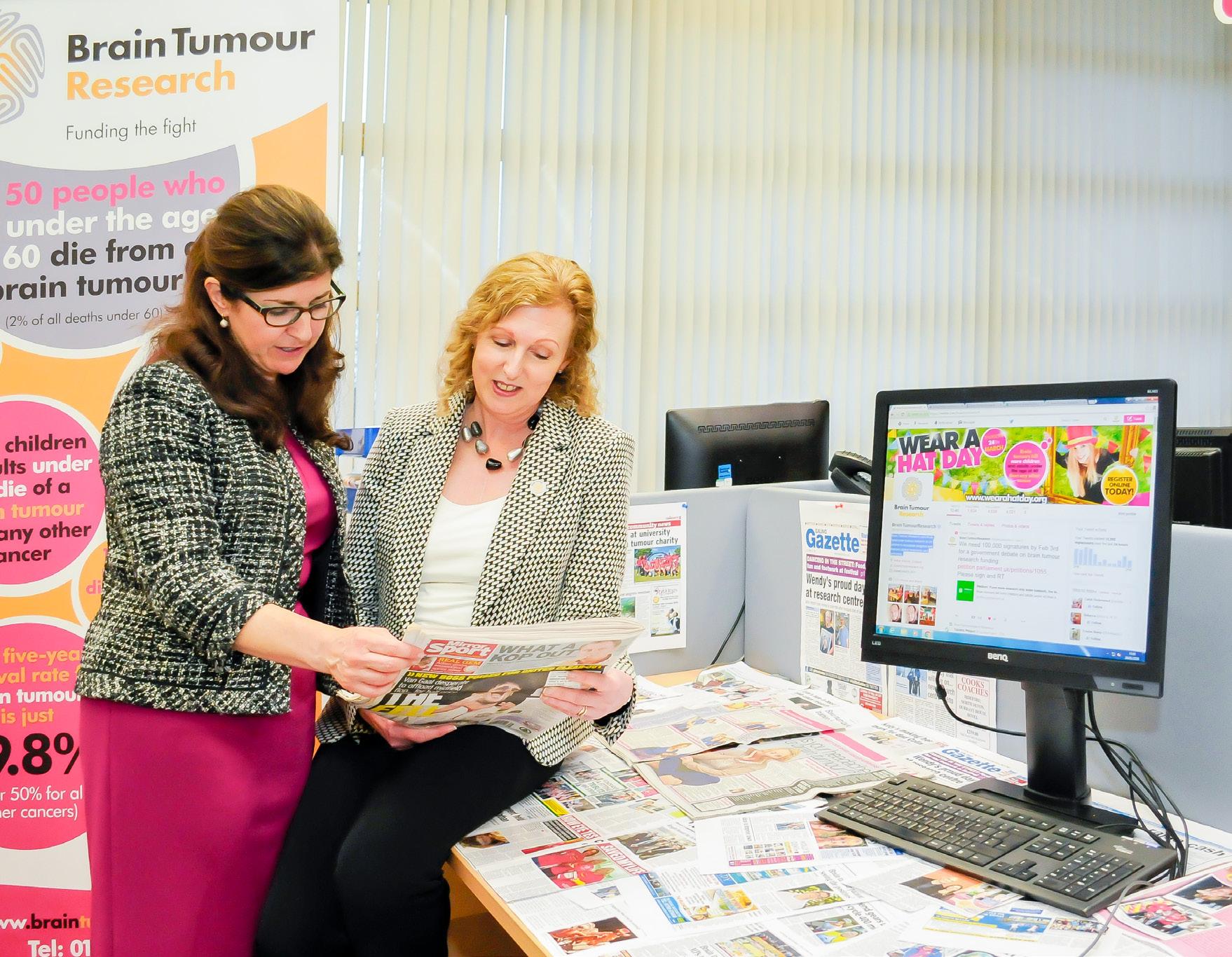
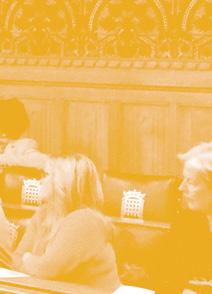
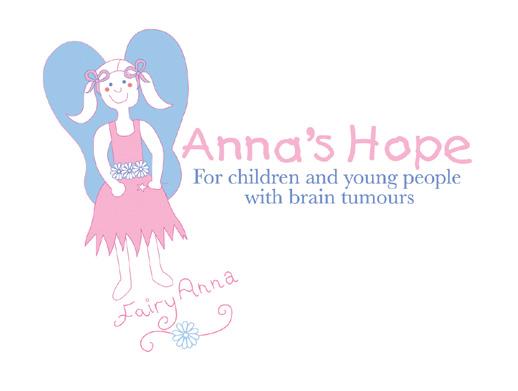
On 8th October last year, Anna’sHopewas the chosen beneficiary of Global Radio’s ‘Make Some Noise’ campaign, which unites all of Global’s radio stations in helping disadvantaged children and young people across the UK; collectively reaching 24.1 million people every week.
This was a unique opportunity for our member charity to reach a large audience with their story in order to increase awareness of this devastating disease. In addition to this, in April 2016 they received a cheque for the incredible sum of £49,650 – the total raised through the campaign!
Carole Hughes, Founder of Anna’sHopespoke of the significance of Global Radio’s support:
“WeareverygratefultoHeart,Globaland alltheirlistenersfortheirgenerosityin supportingAnna’sHopeandinhelpingus raiseawarenessforalloftheworkwe’re
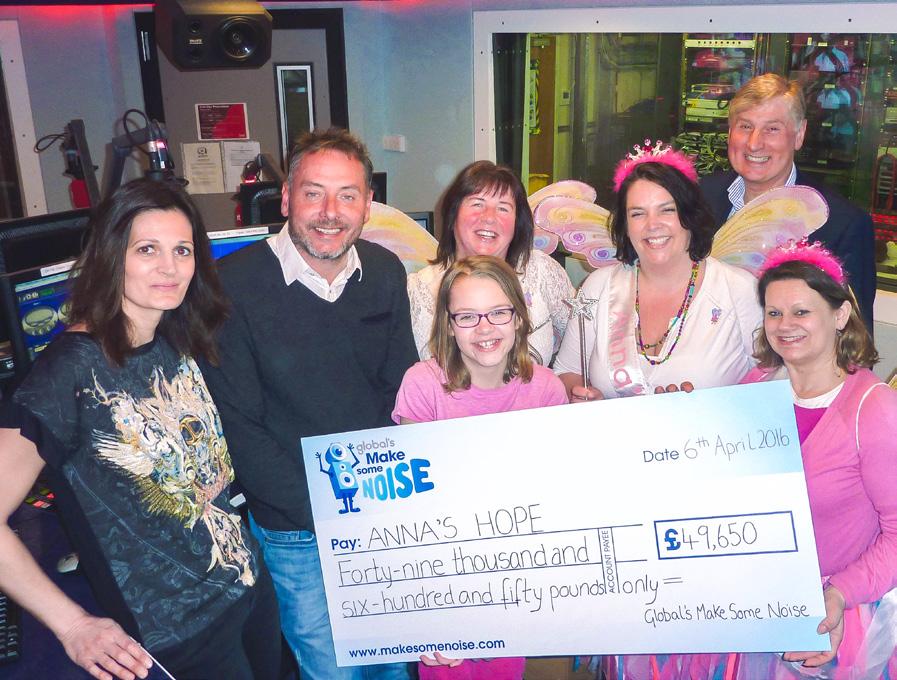
doing.Annacertainly changedourlivesandnow ischangingthelivesof100’s ofchildrenintheregion.This extrafundingthatGlobal’s ‘MakeSomeNoise’hasgiven willmakeahugedifferencetoourwork.”
Anna’sHopewas established by Rob and Carole Hughes after their three-year-old daughter, Anna, passed away from a brain tumour just 15 months after diagnosis. You can read their full story on our website www.braintumourresearch.org/in-ourhearts. The charity’s purpose is to provide specialist neuro-rehabilitation support to children in the East of England and they have recently helped to establish a pioneering new service called Brainbow at Addenbrooke’s Hospital.
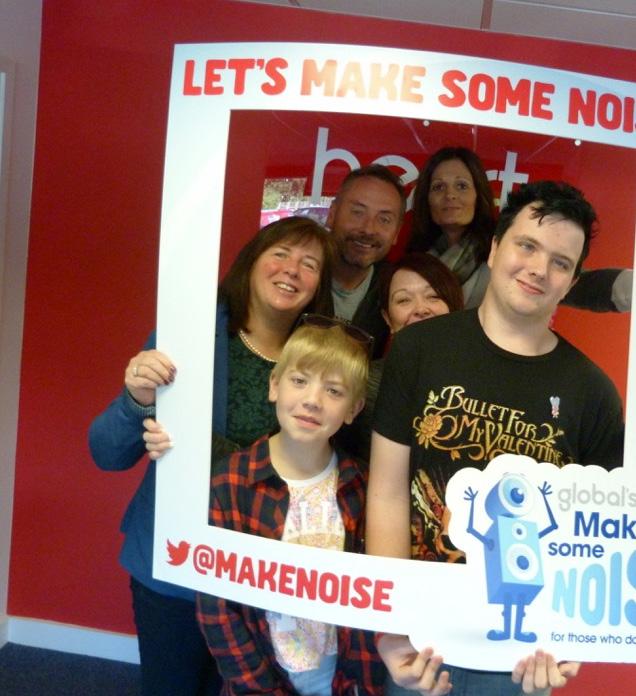


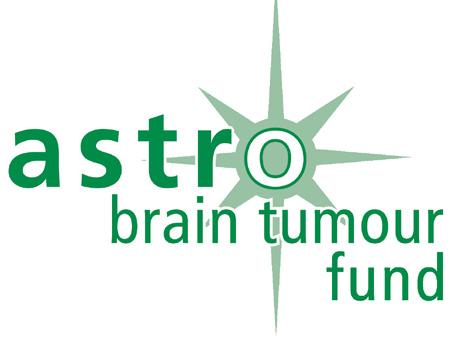
BrainTumourResearchmember charity Astro BrainTumourFund(ABTF) has had another successful year, with increasing numbers of supporters. Imaginative fundraising events brought in hugely appreciated funds to support research into finding a cure for low-grade gliomas. Over the last 15 years ABTFhas funded innovative research at the Children’sBrain TumourResearchCentre, Queen’s Medical Centre, Nottingham, Birmingham Children’s Hospital and Institute of Child Health, Royal Marsden Hospital and Institute of Cancer Research, National Hospital for Neurology and Neurosurgery at Queen Square, London, Hull Royal Infirmary, Blizard Institute at Queen Mary’s, University of London, Wolfson Molecular Imaging Centre at The University of
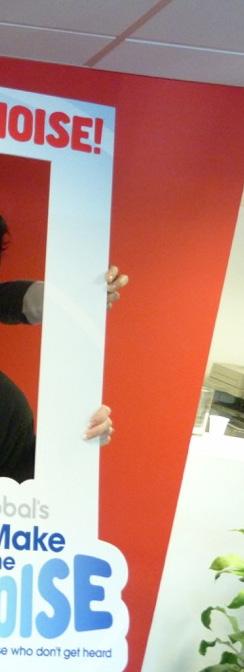
Manchester and The Walton Centre for Neurology and Neurosurgery. Their laboratory-based funding is currently focused at the BrainTumour ResearchCentre of Excellence in Plymouth University.
On the clinical front, ABTFremains committed to bringing new therapies to patients as quickly as possible. They are therefore working in close collaboration with the inspirational charity Matthew’sFriends, together funding a ground-breaking clinical support service for both low and high-grade patients wishing to use ketogenic dietary therapy alongside their standard package of care and treatment. Benefits of the diet have been proven to help children with epilepsy but it is too early to say how effective it is for the treatment of brain tumours. There are a handful of individual case studies where the ketogenic diet is believed to have contributed to effective treatment of a brain tumour. But this is still controversial; it is too early to say this is proof. Clinical trials are being planned for the UK and we hope to see more conclusive evidence of the therapeutic qualities of the ketogenic diet in brain tumour patients soon.
Patients should not attempt a ketogenic diet on their own; this therapy needs careful medical supervision by the Matthew’sFriendsteam in partnership with neuro-oncology clinicians.
If you would like to know more about ketogenic dietary therapy and the existing clinical support service for brain tumour patients, please see the Matthew’s Friends website at or call them on 01342 836571. www.matthewsfriends.org
To help Astro Brain Tumour Fund raise money to support the research, please contact them via their website at www.astrofund.org.uk or call them on 01485 52 52 79. Your contributions large and small will make a real difference.
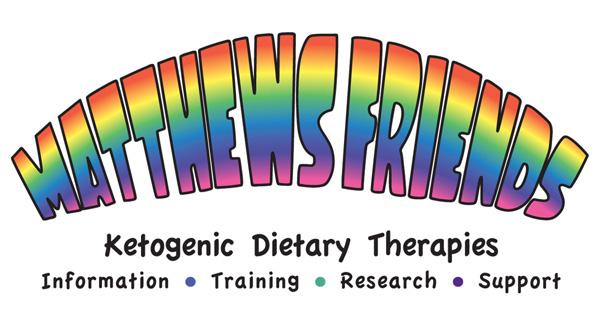
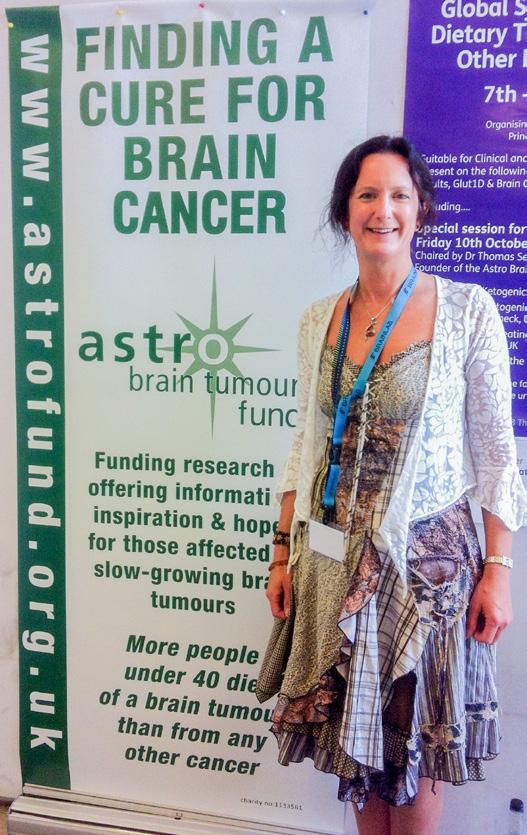

Never feel lost with brainstrust’s guide to support in your area.
service and resources, which helps people to feel less afraid, less alone and more in control in the face of a terrifying brain tumour diagnosis.
Helen Bulbeck, Director of Services and Policy at brainstrustsays:
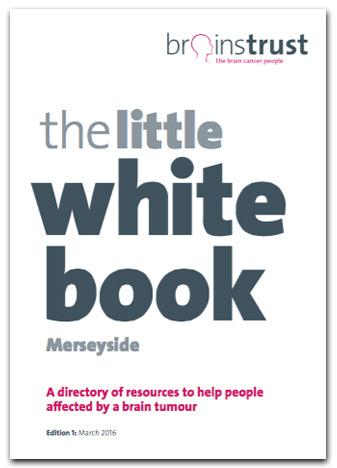
Brain tumour support charity and member of BrainTumourResearch, brainstrust has recently launched a number of new editions of ‘The Little White Book’. These directories, which are produced regionally, signpost people living with a brain tumour and their families to all of the support available in their local area. They feature details on a range of services including networking, psychological support, financial advice and complimentary therapies, alongside many more. The books serve as another part of brainstrust’s personal support
“We know how lost you can feel when you or your loved one is diagnosed with a brain tumour. But we also know how many invaluable support services there are available locally that can help you at every step of your brain tumour journey. We’ve worked tirelessly at brainstrust to find the best local services to help people, and we’ve put them all in these easy to access guides. The books, alongside our 24/7 support, will help people live a better quality of life, which we know can lead to a better outcome”
BTRCended another successful fundraising year with their annual carol concert at the beautiful All Saints Church in Fulham – there was a slightly different flavour with a guest performance by the Refuge Temple Gospel Singers who gave an upbeat rendition of Silent Night and Hark the Herald Angels Sing. The All Saints Choir was also joined by Charing Cross Hospital brain tumour patient Reuben Hill who earlier in the year featured in a BBC documentary on the state-of-art neurosurgical tool, the Raman probe, which is being trialled at Imperial College and was used to remove a brain tumour while he sang hymns!
Another Charing Cross patient and huge BTRC supporter, Anna Swabey, has galvanised a veritable army of supporters to help her raise an ambitious target of £100,000. Already well on her way to achieving this, a Spring highlight was a trip to Paris, where 12 runners competed in the Paris Marathon in support of Anna’s campaign. They all completed the course at varying speeds ranging from 2.75 to 5.75 hours. But between them they raised a staggering £20,000+!
One of the runners merits special credit – Sarah Hargreaves decided that running the Paris marathon was not challenging enough for her, so the following day got on her bike and cycled to Amsterdam, where she ran another marathon the following Sunday!

Visit:
www.brainstrust.org.uk/advice-resources.php to read more about the guides and to request your copy.
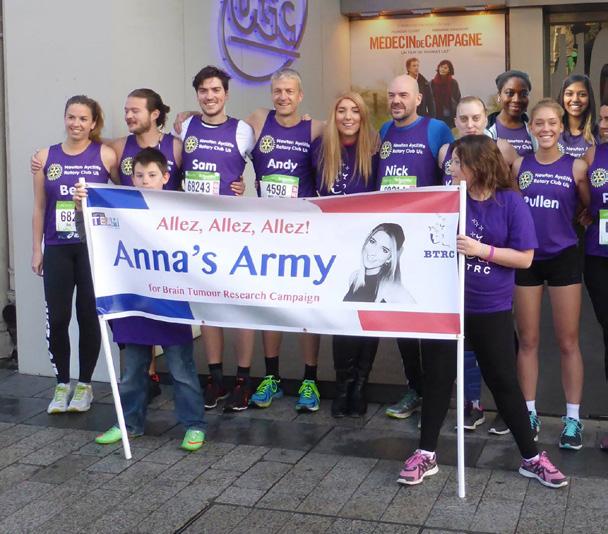
Meanwhile BTRC’s research projects at Imperial College London made some significant advances in the clinical research arena, with some groundbreaking neurosurgical tools – featured on national television – which bring the laboratory into the operating theatre, by giving surgeons a molecular fingerprint of the tumour within seconds, which can subsequently be analysed in depth in the laboratory, allowing the scientists to suggest new treatment options which can attack the tumour and lead us closer to a cure.
Visit: www.wayahead-btrc.org
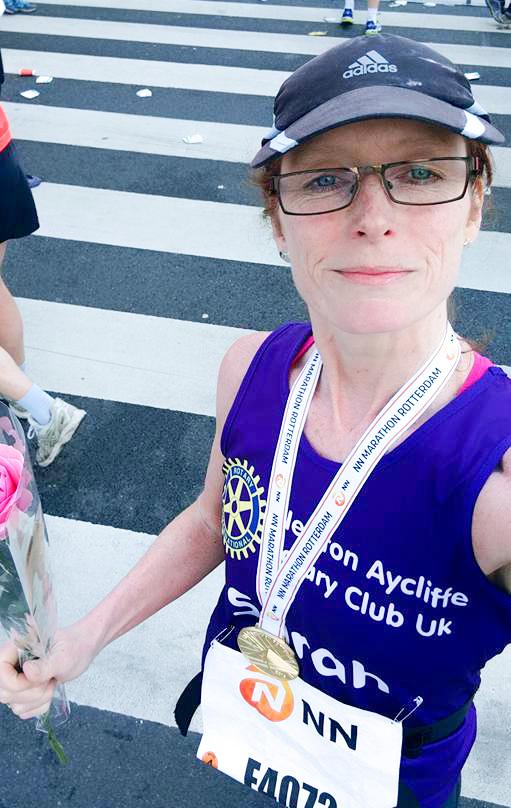
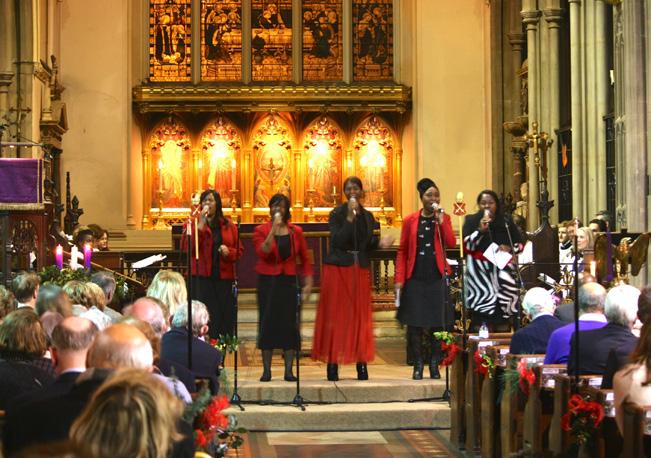
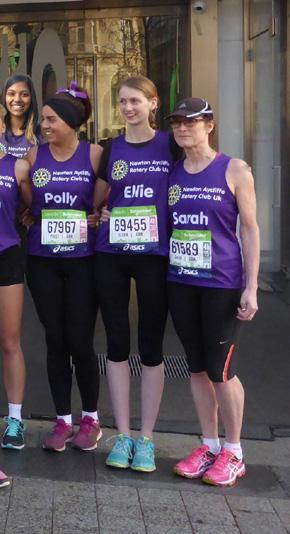
Danny Green was a fit, healthy and active 10-year-old boy when he was diagnosed with a grade 4 medulloblastoma in November 2011. He fought a brave 10-month battle against the disease but eventually lost his fight in July 2012.
Danny’s parents Lisa and Chris established The DannyGreenFundto raise money for research and increase awareness of not only brain tumours but Posterior Fossa Syndrome – a post-operative condition common with brain tumour patients –from which Danny suffered on a daily basis.
Posterior Fossa Syndrome (PFS) is a condition which manifests as neurological symptoms such as mutism, weakness in one side of the body, ataxia (unsteadiness), poor muscle tone, partial facial paralysis and incontinence, to name a few. Danny suffered hugely from many of these symptoms, though luckily with intense physiotherapy he was able to overcome most of these problems and could walk with the aid of a walking frame.
In Danny’s memory, the family have already been able to improve the lives of many children suffering from PFS, helping them to regain their strength, co-ordination and mobility through a range of therapy type, from horse riding to hydrotherapy.
Danny’s father Chris has now written a book to further raise awareness of brain tumours and their tragic effects. ‘Danny’s Journey’ is the retelling of his son’s tragic story from a deeply personal perspective.
“I wanted to show what a warrior he had been and how he had been affected by his brain tumour. Sadly a child with a brain tumour has to endure so much, has to cope with the effects of harsh chemotherapy drugs
and of radiotherapy and is not promised a cure.
“Our family didn’t get the happy ending we so desperately wanted but Danny is the inspiration for all we do and hopefully ‘Danny’s Journey’ will help others to understand just how devastating brain tumours can be for both the child and the whole family. We are passionate about working with Brain Tumour Research and are honoured to be a member charity. We hope that ‘Danny’s Journey’ will help the fight for more research spending for brain tumours, as without research there will be no cure.”
‘Danny’s Journey’ is available to buy directly from www.thedannygreenfund.org.uk or via BrainTumourResearch’s eBay page, www.ebay.co.uk/usr/braintumourresearch
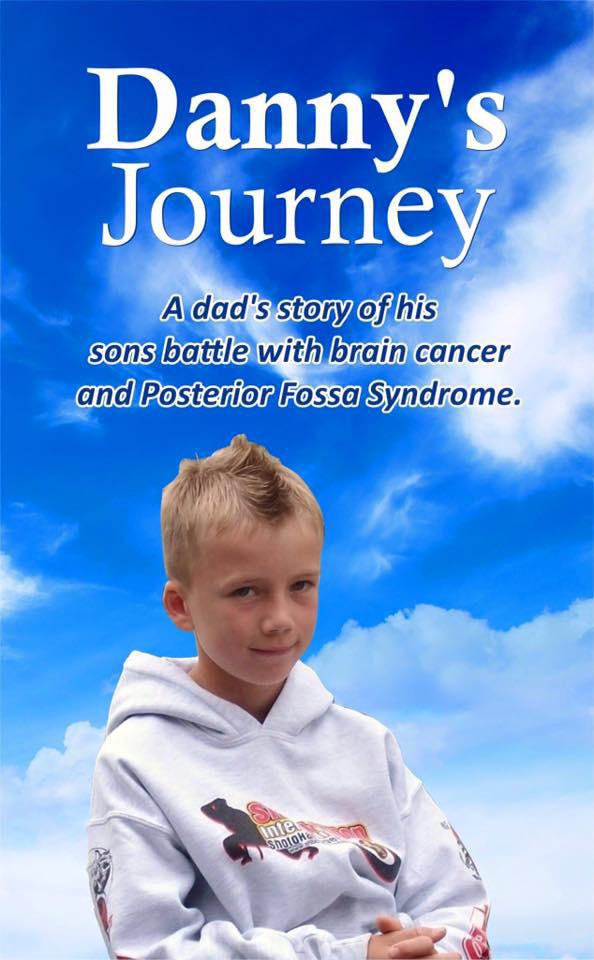




































































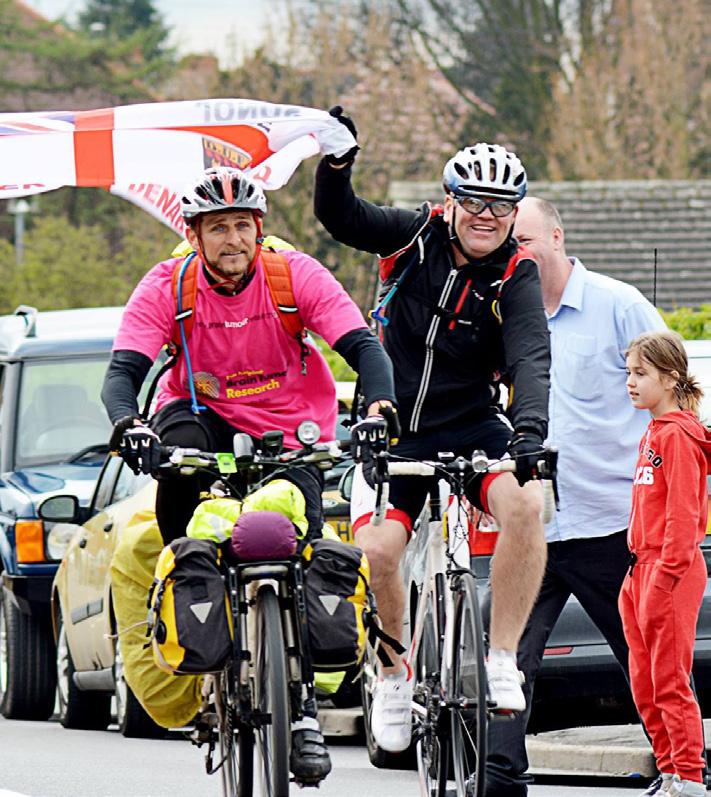
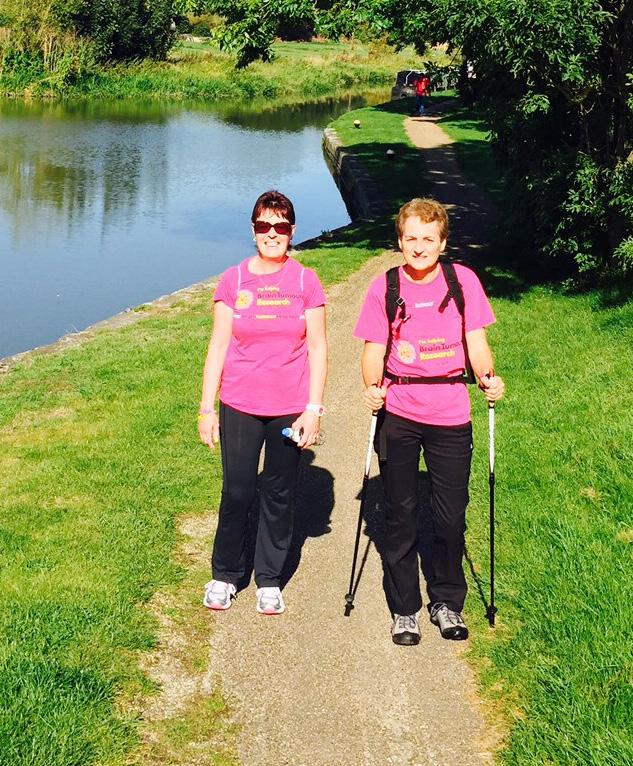
Grand
Union Canal Walk














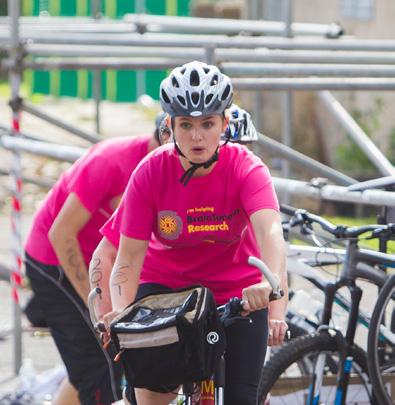


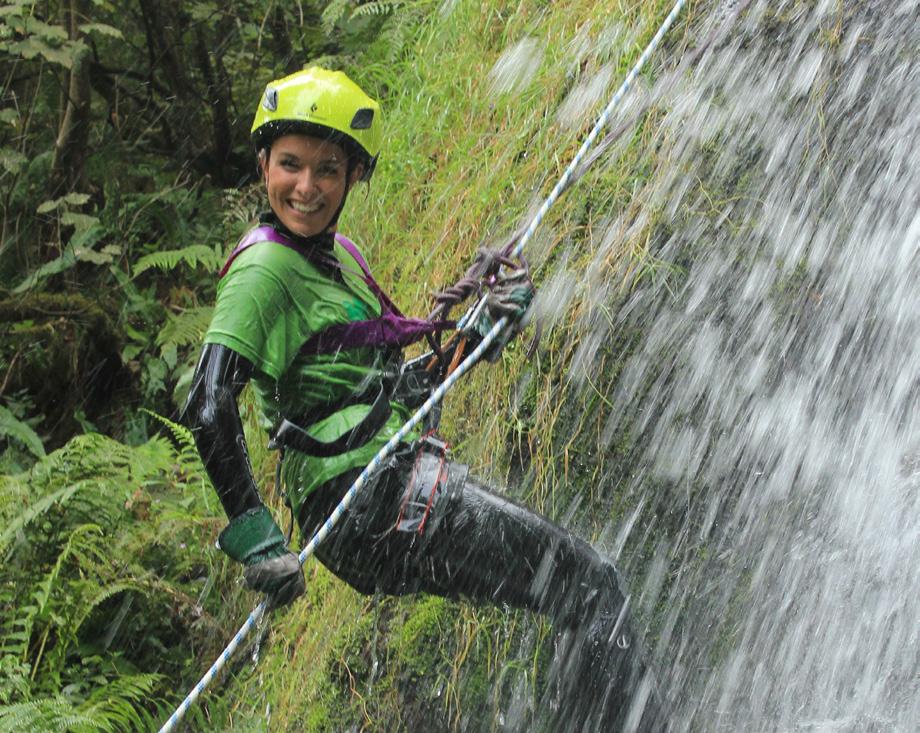
Canonteign Falls


Ride London - Surrey
31st July
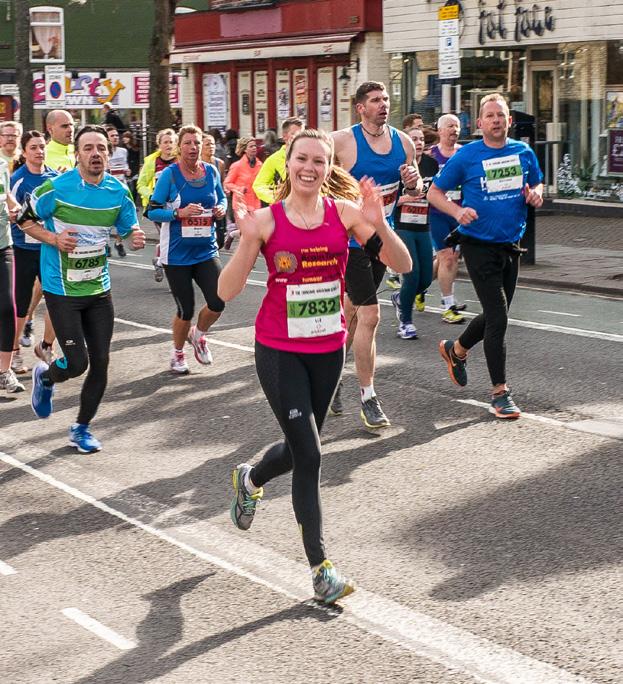
24th September
Great North Run 11th September
Abseil










11th June





Devon




Swim The Serpentine 24th September
Berlin Marathon 25th September



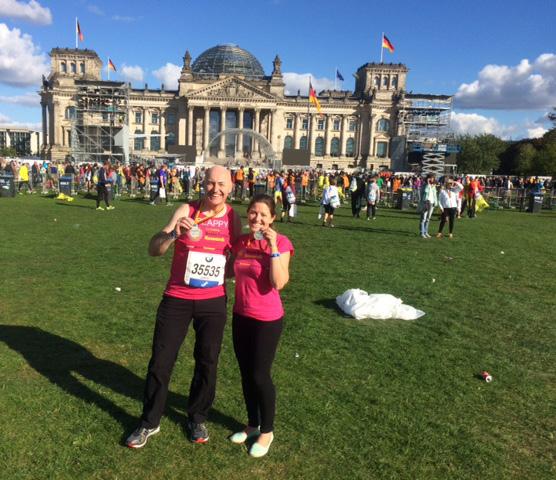

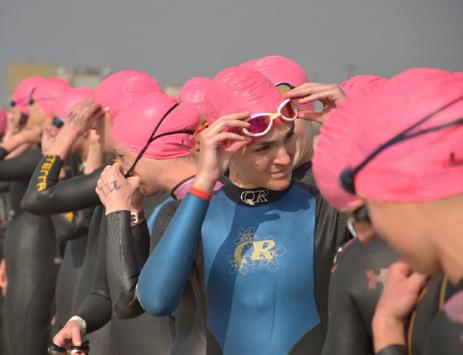
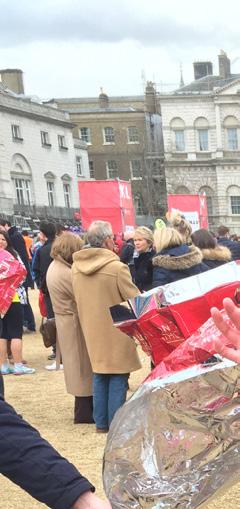





































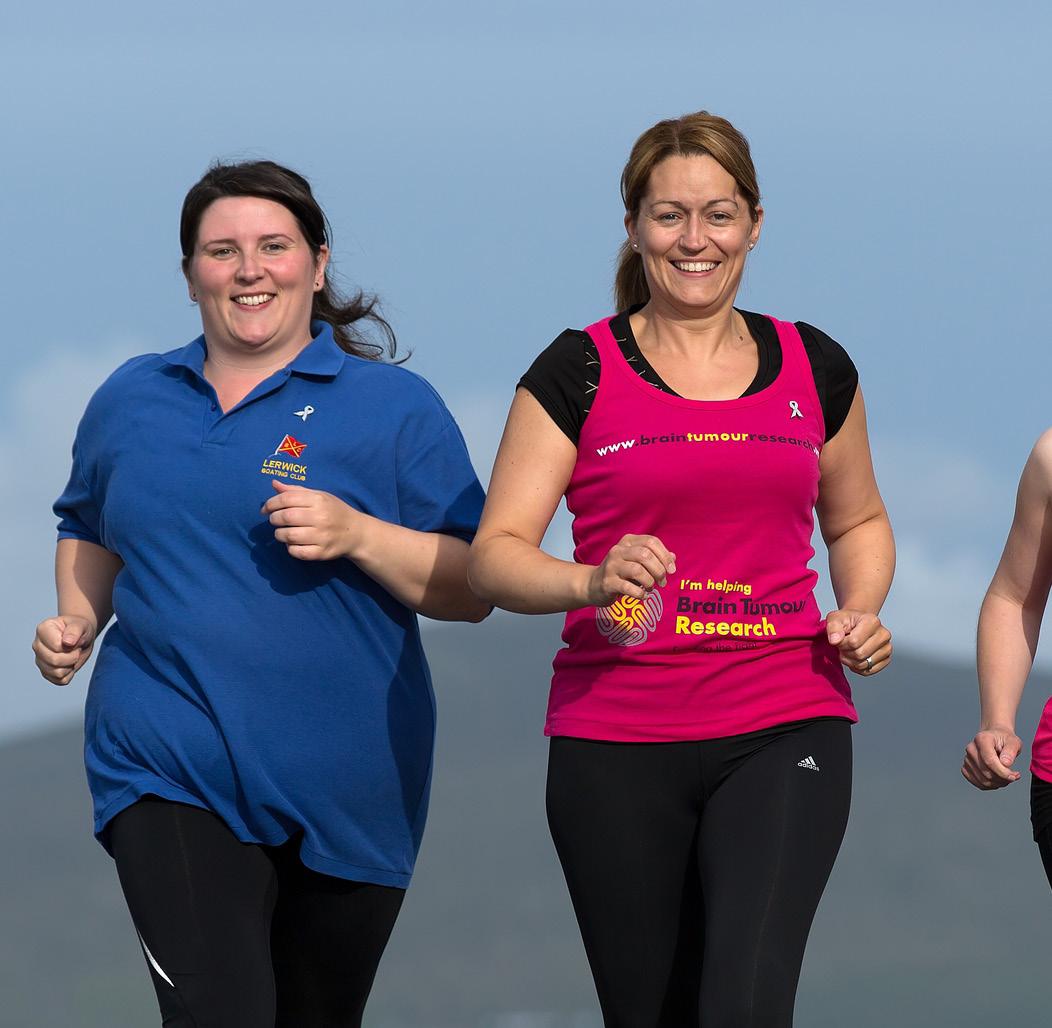
















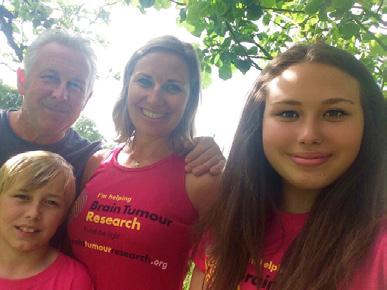











































































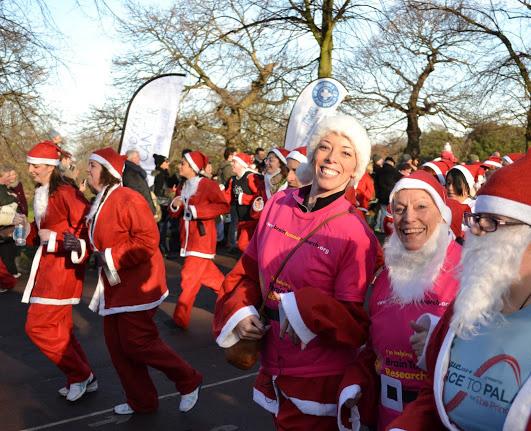






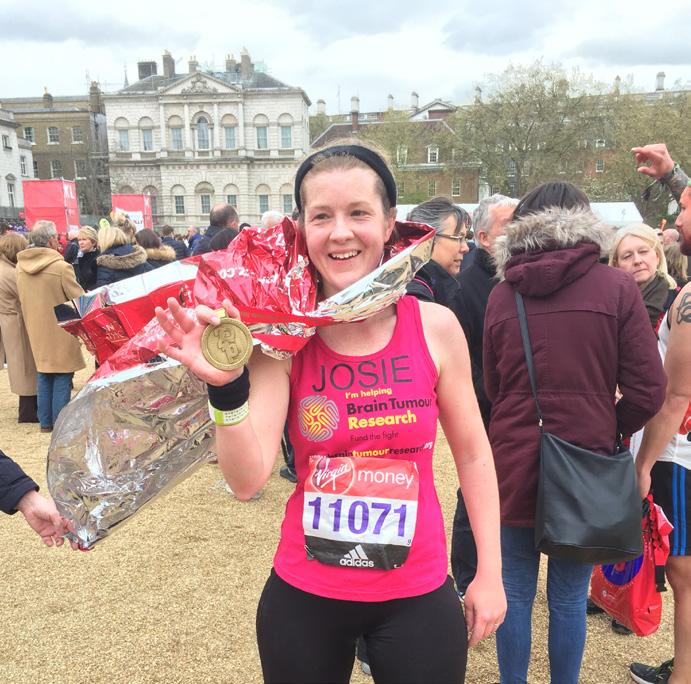

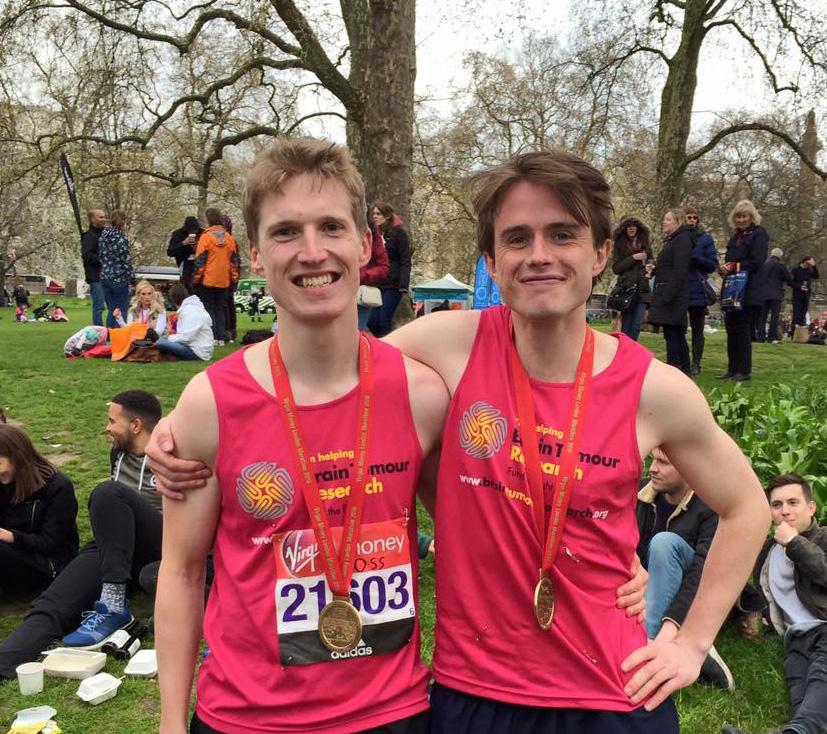
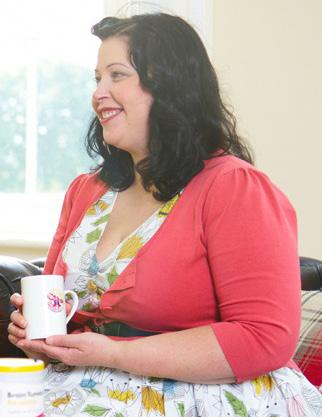
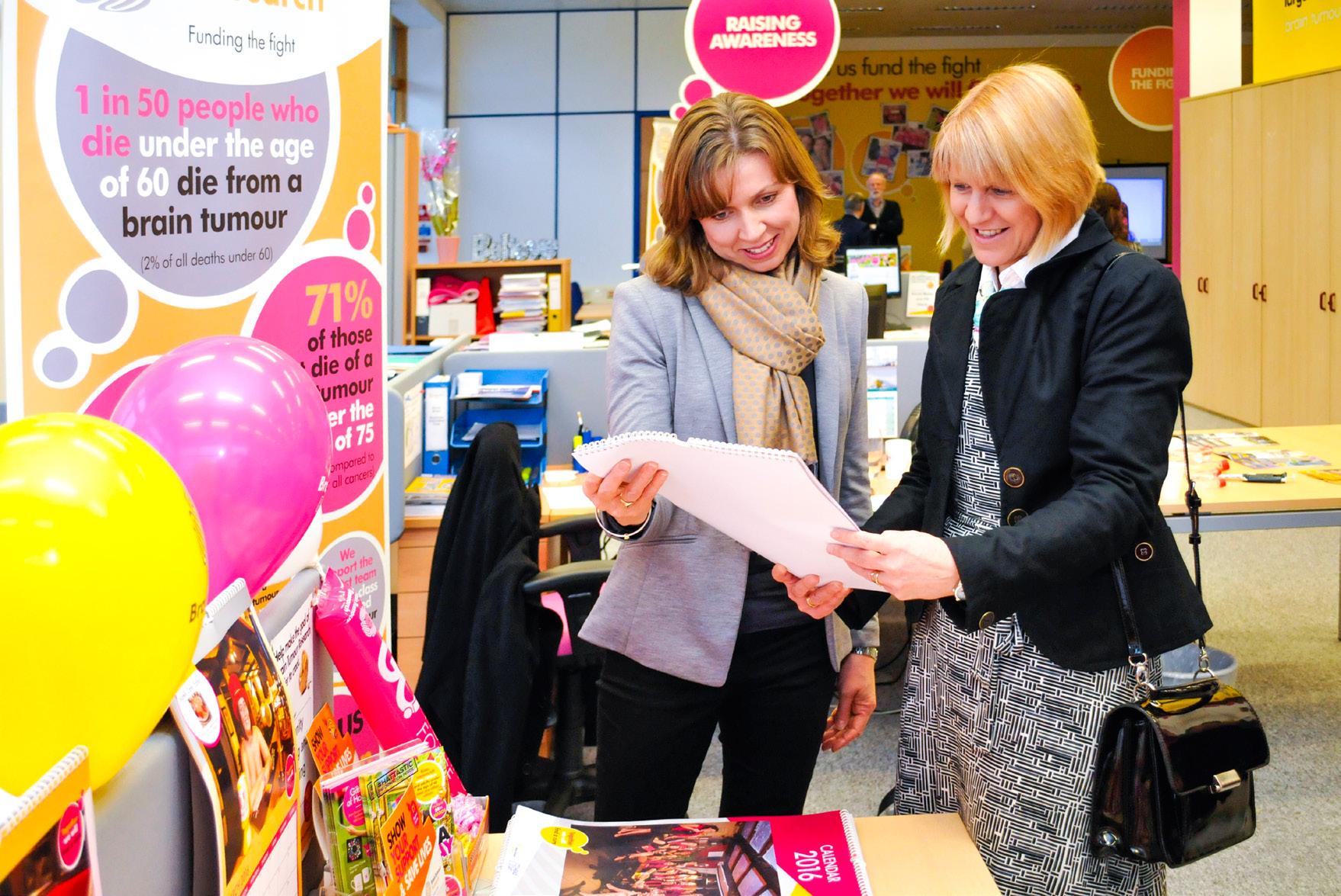
In November 2015, Brain Tumour Research moved from its ‘birthplace’ in the rural village of Padbury, near Buckingham, to Milton Keynes – marking an important milestone in the growth of the charity.
It is thanks to the tireless dedication shown by our supporters, fundraisers and activists that we outgrew our base in the farm at Padbury, home of Chief Executive Sue Farrington Smith and her family, and moved to a larger office in Shenley Wood, Milton Keynes.
The new office is ideally sized to accommodate BrainTumourResearch’s growing team and band of Head Office Volunteers and we are confident that the new location will foster a great many opportunities to engage with a larger community of potential fundraisers and supporters.
Paul Griffiths, Chief Executive of Milton Keynes Chamber of Commerce said: “Wearedelighted thatthisimportantcharityhaschosenourcity andIhopepeopleacrossMiltonKeyneswillbe interestedinfindingoutaboutthegreatwork takingplaceandpotentiallyconsidermaking BrainTumourResearchtheirCharityoftheYear, astheChamberhasdone.”
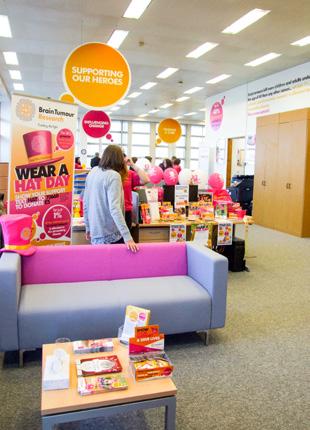
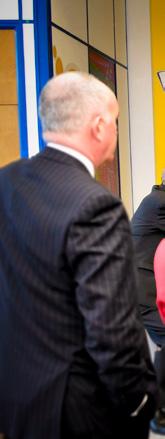
On 28th January 2016 we held an Office Open Day, at which we were proudly able to share with attendees what we have achieved.
Informative presentations were given by key figureheads from our Centres of Excellence: Professors Geoff Pilkington and Silvia Marino and Dr Nelofer Syed (pictured top right with Chairman Wendy Fulcher). This gave attendees a direct glimpse of the work that is being funded by BrainTumourResearchin Portsmouth and London.
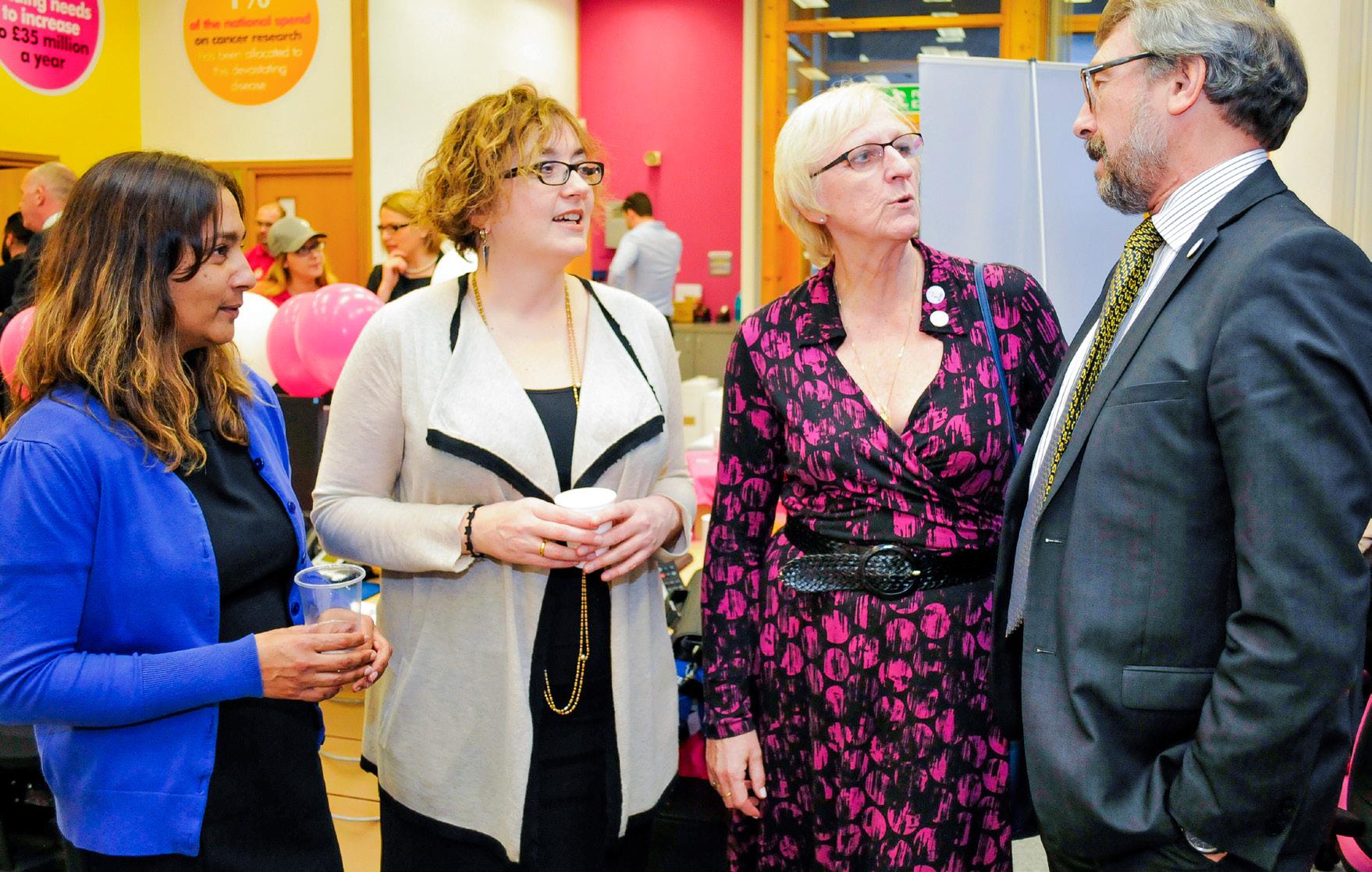
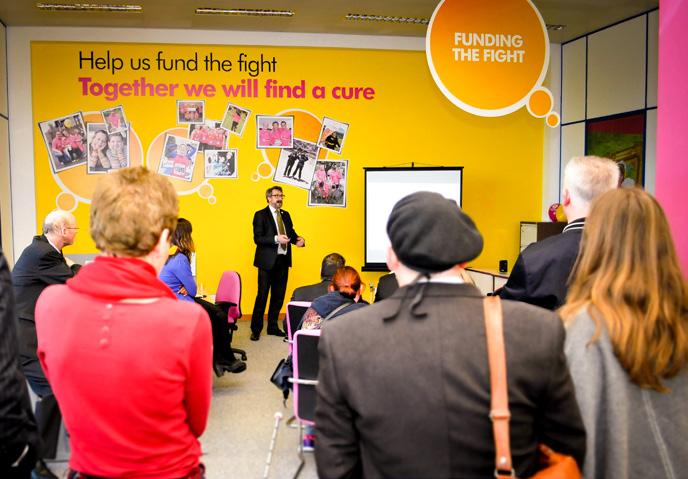
We were also pleased to be joined by local MP Iain Stewart, patron Ian Reddington and the Mayor of Milton Keynes Keith McClean, who cut the ribbon to declare the office officially open!
Visitors were invited to explore the space at their leisure and BrainTumourResearchstaff were on-hand to talk about how multiple areas within the organisation such as PR, Fundraising and Finance work together to drive forward the development of the charity and make the most of every opportunity.
AlsoinattendancewerePeterandLizRealf,the parentsofStephenRealf,whopassedaway in2014aged26.Stephenwastheinspiration behindsisterMariasettingupthee-petition whichgainedanastounding120,000+ signatures,propellingtheissuessurrounding braintumourresearchfundingtotheforefront ofthegovernmentagenda.

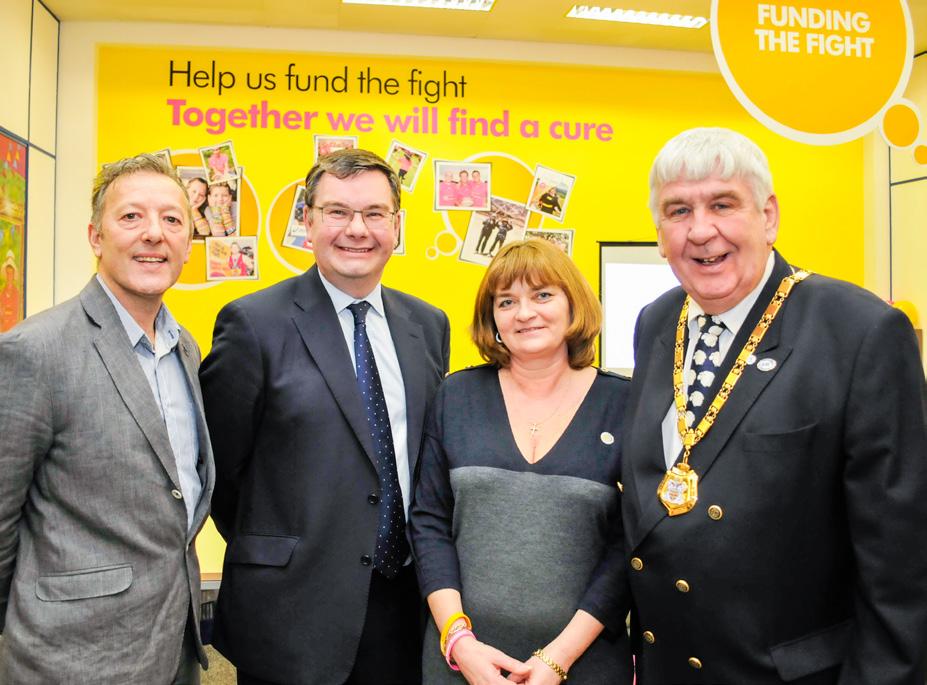
Having now spent over six months in our new home, we are thankful to have been welcomed to the local area with open arms and only have to glance at the office walls to be reminded of how and why we do what we do. Adorned with the happily exhausted faces of our fundraisers; the determination of our political activists and the key funding statistics, we are inspired by those who have been with us on the journey so far and look forward to many more joining us in the future!
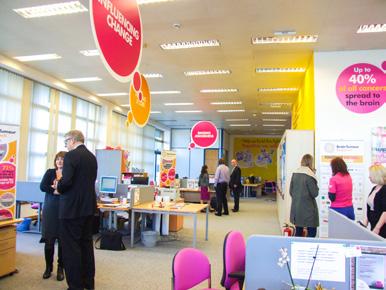
...spare some time to volunteer at our head office? We are always grateful for extra support!
www.braintumourresearch.org/volunteer-for-us
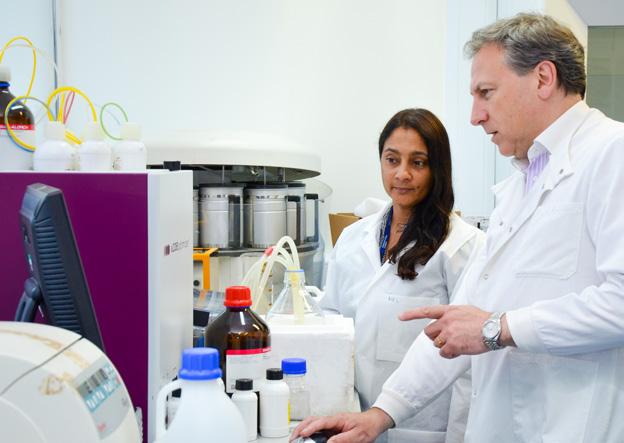
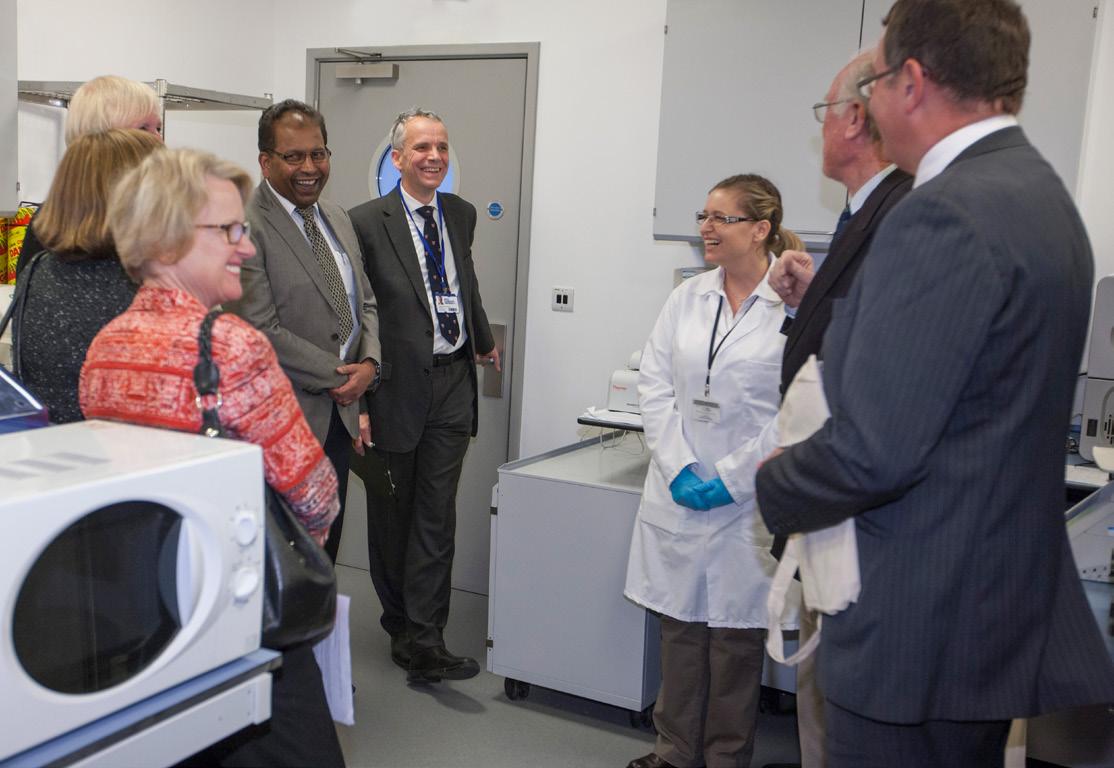
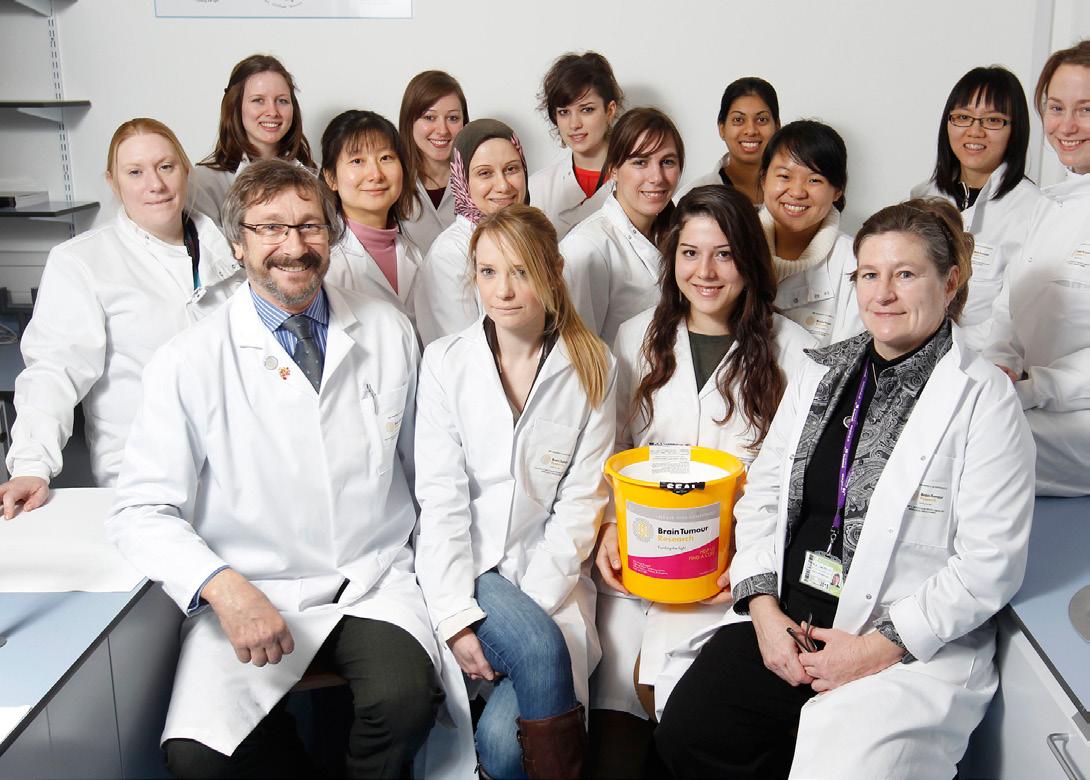
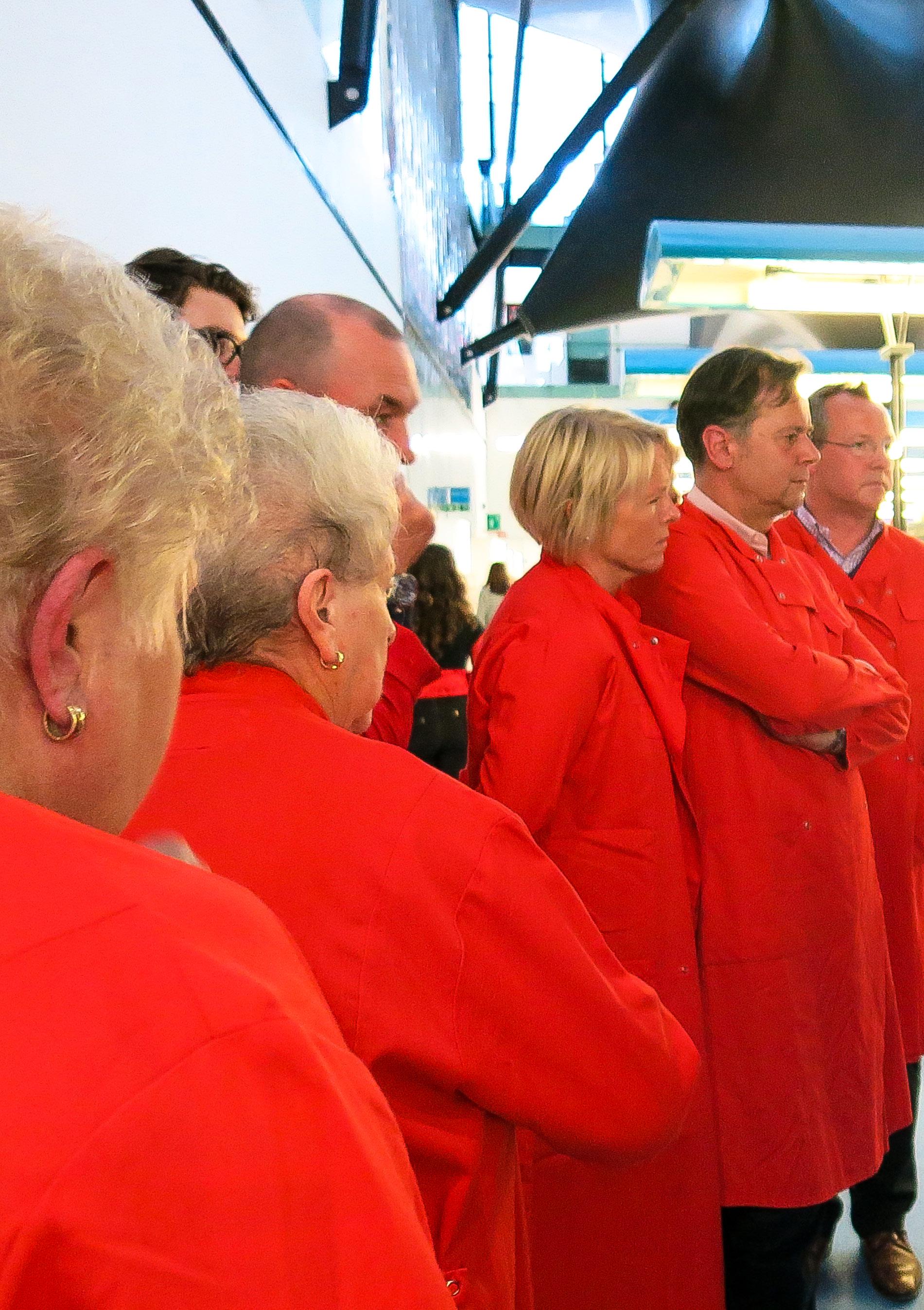
Could you make a regular, monthly donation and become an important player in ensuring our vital research continues into the foreseeable future, on a strong and sustainable footing?
Put another way – you would be helping us to plan for the future.
So, whatever you can afford, please take this opportunity to set up a regular, monthly donation – and encourage your friends and family to do the same too. There has never been a better time to help us in this way – as we grow, our team of researchers grows with us and one day, together, we will find a cure.
You can help us rewrite the future of research into brain tumours by leaving a gift in your Will, once you have taken care of your loved-ones. With your generous gift, we can think ahead to a time when the vital work we are funding leads to finding a cure for brain tumours.

Visit www.braintumourresearch.org/ legacy for more information.
We are here to help you with this – so if you would like to leave a legacy of hope please give us a call on 01908 867200 or email finance@supportercare.org
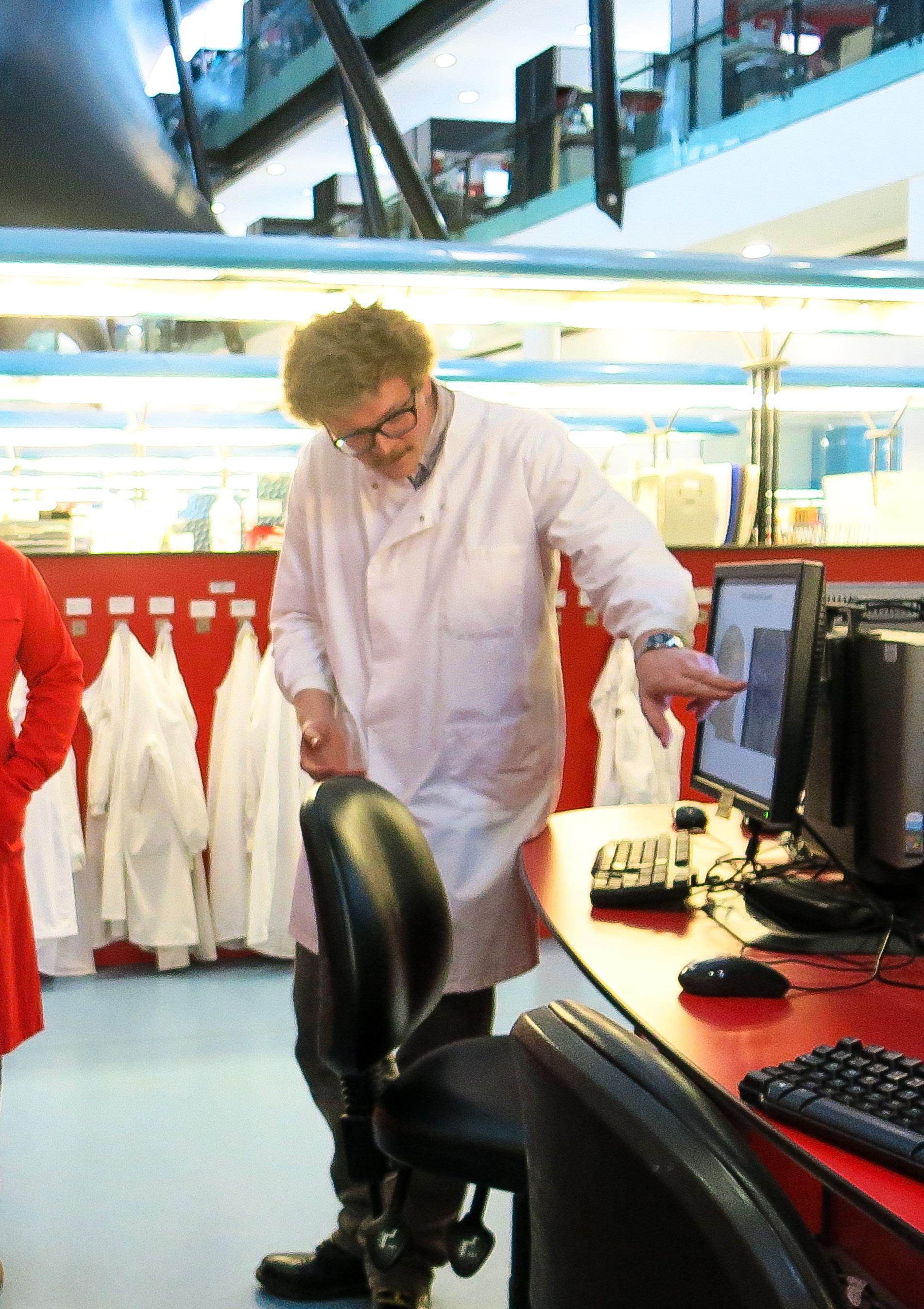

To set up a regular donation, give one of our friendly team a call on 01908 867200 or email finance@braintumourresearch.org Alternatively, a standing order form is available to download from our website www.braintumourresearch.org/donate
If you want to leave a gift to Brain Tumour Research, but have already made a Will, it’s not too late – there are two simple ways to change it. You can either write a new Will which will replace the old one, or add a codicil to the existing Will which specifies the full name and registered number of our charity.
Brain Tumour Research is a member of Remember A Charity, an organisation dedicated to encouraging more people to consider leaving a charitable gift in their Will.
Visit www.rememberacharity.org.uk and search for BrainTumourResearch
Creating an online Tribute Fund is a positive way to commemorate the life of a loved one whilst contributing to the work of Brain Tumour Research. A Tribute is entirely yours to control –whether you choose to make it a private place of reflection or somewhere that family and friends from across the world can visit.
Setting up your Tribute is simple and only takes a few moments. Once set up, it will be a place where family and friends can leave messages, share memories, light virtual candles and add poignant photos, videos and music in memory. You can control the privacy settings in every section to ensure nothing will appear that you do not want to see or share.
Your Tribute can also be added to our ‘Forever in our Hearts’ Tribute Garden. This is a place for
individuals, families and friends to share and celebrate the life of their loved one, and to find others who have been affected by a tragic loss due to a brain tumour.
Whilst your Tribute does not have to include a fundraising section, you are also able to collect donations through it which come directly to Brain TumourResearch. In addition, you can also add any personal fundraising or events you have undertaken for visitors to view and take part in.
Find out more about setting up a Brain Tumour Research
Tribute Fund by visiting
Together we will find a cure


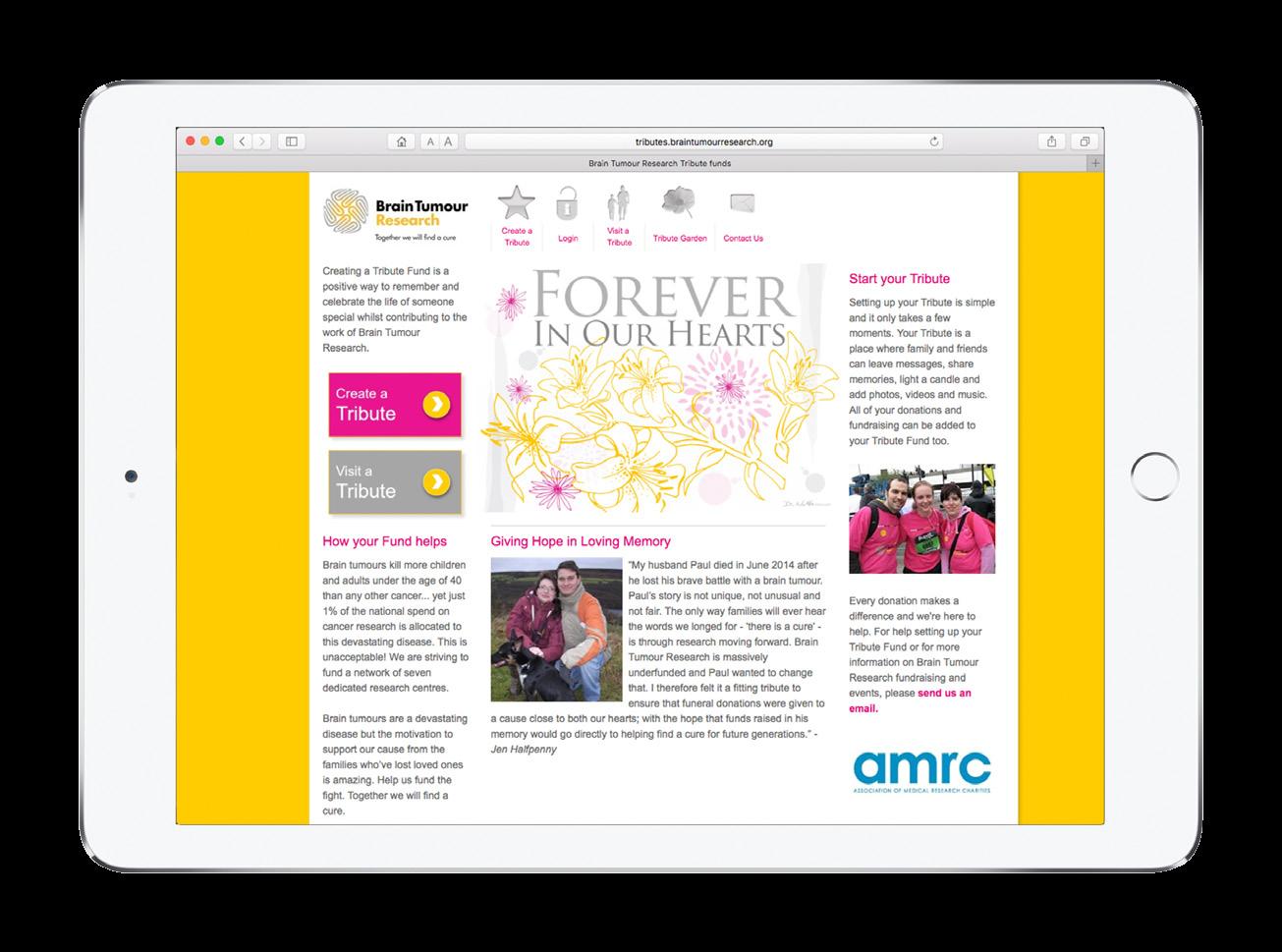
Adrian Emmott
Aileen Meeks
Alan Scott
Alastair Robertson
Alexandra Lloyd Head
Alma Cleworth-Piddington
Alun Bason
Andrew Bio
Andrew Hall
Andrew Wiles
Angela Forster
Annaline Lillis
Anne Care
Anne Rider
Anthony Cobern
Barbara Greenhalgh
Barry Lawton
Bernadette Summerson

Darren Holmes
Darren Walshaw
David Fisher
David Semple
David Shearwood
Debra Smith
Derek Lambert
Desmond Taylor
Donald Keir
Douglas Gooch
Dr Michael Woods
Elizabeth Pickford
Eric Blundell
Ewen Cameron
Fabian Aiken
Frankie Smith
Gavin Pickford
Graham Harcourt
From all of us at Brain Tumour Research, our love and thoughts are with all those who inspire us and with everyone who continues to support us in memory of their loved ones and colleagues, year after year.
Jeni Fabbri
Joanne Adamson
John McCarthy
John Bourne
John Martin
John Picken
John Shreeve
John Slack
Kathleen Storey
Keith Jeavons
Kenneth Garbett
Kenneth Harper
Kenneth Mitchell
Laura Hind
Liam Chalmers
Luke Foster
Margaret Brown
Margaret Lewis
Peter Davies
Peter Jordan
Peter Withinshaw
Rachael Edwards
Ralph Long
Ray Beech
Reginald Vaulter
Richard Friel
Richard Braithwaite
Richard Chaplin
Richard Webster
Rikke Brockstedt Hjortaa
Robert Bullard
Robert Evensen
Robert Young
Ron Beresford
Ronald Short
Roy Underwood


Beryl Jackson
Billy Cudmore
Brenda Knight
Brian Hill
Brian Lynch
Caroline Thacker
Charles Jaynes
Christina Stratos
Christine Lane
Christopher Rose
Claire Dennis
Clare Lawrence
Colin Maxwell
Colin Ridehalgh
Danny Mitchell
Graham Horton
Graham Taylor
Greg Evans
Helen Wilcox
Hilda Pettyfer
Huw Bradwell
Ian Metcalfe
Ian Tapp
Iris Randall
Isobel Lyall
James Pullen
James William Thomas
Jason Chandler
Jason Hails
Jean Thomas
Martin Eric Lowman
Martyn Stanbury
Matt Lowther
Michael Smith
Norman Williams
Pamela Ann Warren
Patricia Evans
Patricia Littlefield
Patricia Pratt
Paul Fordham
Paul Nicholls
Pawel Burzynski
Selcuk Arslan
Simeon Bennett
Stephanie Hewitt
Sue Brabbins
Sue Garratt
Susan Thomas
Susie Church
Tom McEntee
Tommy Elliot
Tony Elischer
Vera White
Vivian (Viv) Hotten
